
New Passover books will entertain the kids
Auschwitz exhibit is worth a trip to Boston
Photos tell the story of Purim in Providence





New Passover books will entertain the kids
Auschwitz exhibit is worth a trip to Boston
Photos tell the story of Purim in Providence



EDITOR F ran Ostendorf
DESIGN & LAYOUT Alex Foster
ADVERTISING DEPARTMENT
Peter Zeldin | 401-421-4111, ext. 160 pzeldin@jewishallianceri.org
CONTRIBUTORS Cynthia Benjamin, Sarah Greenleaf, Robert Isenberg, Emma Newbery
COLUMNISTS Michael Fink, George M. Goodwin, Larry Kessler, Patricia Raskin, Rabbi James Rosenberg, Daniel Stieglitz
VOLUME XXXI, ISSUE IV
JEWISH RHODE ISLAND (ISSN number 1539-2104, USPS #465-710) is published monthly except twice in May, August and September.
PERIODICALS POSTAGE PAID at Providence, R.I
POSTMASTER Send address changes to: Jewish Rhode Island, 401 Elmgrove Ave., Providence, RI 02906.
PUBLISHER
The Jewish Alliance of Greater Rhode Island, President/CEO Adam Greenman, Chair Harris Chorney, 401 Elmgrove Ave., Providence, RI 02906. 401-421-4111; Fax 401-331-7961

COPY DEADLINES: All news releases, photographs, etc., must be received on the Wednesday 10 days prior to publication. Submissions may be sent to: editor@jewishallianceri.org.
ADVERTISING: We do not accept advertisements for pork or shellfish. We do not attest to the kashrut of any product or the legitimacy of advertisers’ claims.
IT’S NOT EASY being far from family, especially during different, and sometimes difficult, life-cycle changes.
More people than ever seem to be experiencing the trials and tribulations of being far from loved ones during crises such as illness, age-related changes and emergencies.
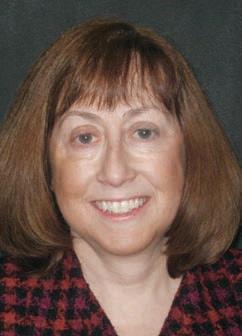
Years ago, people were born, raised and lived close to their extended families. As transportation became easier, families scattered. Now, it’s not unusual to grow up on the East Coast, go to college in the Midwest and end up in California. The joys of modern living?
Just because it’s more common, it doesn’t mean that it’s easy to live without the support of family.
My grandmother’s family all lived in close proximity to one another. Three sisters, two brothers and their parents. As the younger generation married, most stayed nearby, though they began to scatter as work dictated.
The next generation scattered even farther.
My generation lives far from family members, and we barely know our cousins. It’s too bad. My grandmother’s generation were all close growing up. They knew someone was always nearby to help when needed, and having someone who understands you, like only a family member can, really helps carry one through hard times.
My siblings and I have experienced the importance of close family connections recently, as we have had the challenge of helping our parents navigate a health problem and a life crisis. Always fiercely independent, our mother has been suffering with some hip issues and needed help, and our father faced moving his business at the last minute.
None of us lives nearby and all three of us have challenging and busy careers. Nevertheless, we have banded together to divide and conquer (with the help and support of our partners). After all, this is what our parents would – and did – do for us. Anything less would be turning our backs on the commandment to “Honor your father and mother.”
We love our parents and want to honor them by helping to make their lives easier as they age. We know that even a small amount of assistance will greatly make weathering this storm a lot easier for them both.
So, rearranging schedules and spending a few days at a time either helping with Mom’s health or Dad’s business is the least we can do. And we
know our children will do the same thing for us when the time comes.
We hope the move will be finished by Passover and the health issue will also be in the rearview mirror.
Our tradition teaches l’dor vador, from generation to generation. This is the kind of lesson that families pass from one generation to the next. I wouldn’t have it any other way. We saw our parents do the same for their parents, and now our children see us doing this. Important lessons for a meaningful and rich life.
OUR NEXT ISSUE will come out on May 10, because of when Passover falls this year. Remember that May is our annual Pet Issue, and we want to feature the best photos of your pets. So please send those photos, with your name, town/city of residence and your pet’s name, to Editor@jewishallianceri.org. The deadline is May 1. Chag Pesach Sameach!



Philip Eil wasn’t quite 24 when he learned a startling fact: His father, Dr. Charles Eil, had been a medical school classmate of Paul Volkman, M.D., the convicted “Pill Mill Killer.”
EIL MIGHT HAVE shrugged off this information, unmoved by his two degrees of separation from a disgraced physician with a deadly legacy of opioid scripts.
But Eil, a Providence native who had just kicked off his career as a journalist, was fascinated by this small-world connection, and wondered how this medical practitioner could wreak such havoc on a small Ohio town, and was he really guilty enough to serve four consecutive life terms in prison?
Fifteen years later, Eil’s first book has just been published, “Prescription for Pain: How a Once-Promising Doctor Became the ‘Pill Mill Killer.’”
Eil, who turns 39 this month, is a prolific writer and veteran parttime college instructor at Brown, the Rhode Island School of Design and the University of Massachusetts at Dartmouth. He lives a few streets from his childhood home in the East Side of Providence. His home office is within a mile of Temple Emanu-El, where he became a Bar Mitzvah, and his alma mater, the Wheeler School.
Yet Eil has taken an astonishing journey these past 15 years, delving deeply into Volkman’s labyrinthine world. He has conducted more than 150 interviews, examined police evidence, probed court documents and spent hours talking with the incarcerated doctor, who tirelessly proclaims his innocence.
We caught up with Eil recently to talk about his decorated journalism career, his mammoth book project and his relationship with Judaism. How did you start out as a writer?
After college [at the University of Michigan], I took a job in publishing, which was a cubicle job at a children’s publisher in New York City, and I found it deeply under-stimulating. This whole amazing city was right outside my window! I was doing a lot of reading outside of work, on the subway. I was getting
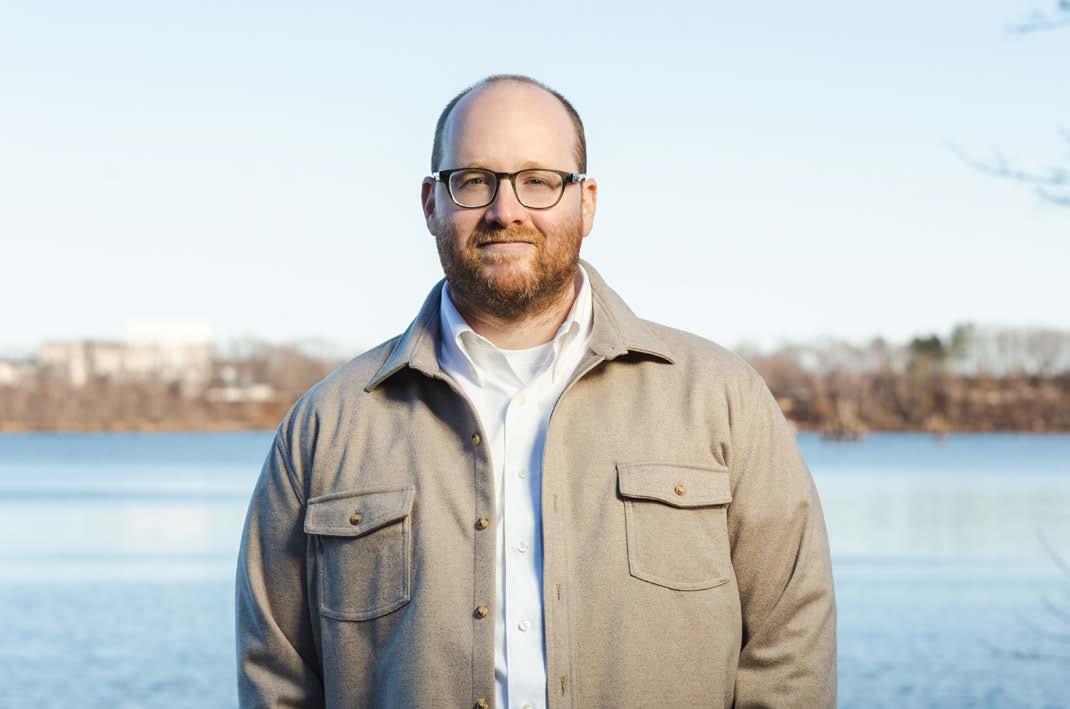
really inspired by things I was reading: I read Truman Capote’s “In Cold Blood,” I read William Zinzer’s “On Writing Well.”
About six months into the job, I signed up for a night class in creative nonfiction, and that’s where the lightbulb went off. It suddenly made sense that I wanted to write nonfiction.
From there, I applied for a newspaper internship at the San Francisco Bay Guardian, and I went out there for the summer. I had my first byline, and I got my first reporter’s notebooks, and I did my first interviews. I was just hooked.
It was after I moved back to Rhode Island, in the fall of 2008, that I was really eager for any writing opportunities I could find. I started writing for the Providence Phoenix, and I think it was either that fall or the winter of the next year that I got connected with Richard Asinof, who was then the editor of the Jewish Voice [now Jewish Rhode Island]. Those two papers are really where I wrote some of my first pieces and started to get my experience as a journalist and as a writer.
Was it meaningful to you to become involved in Jewish journalism?
I took a very influential class in
my last year in college, History of American Jews. That class, taught by Deborah Dash Moore, made a huge impression on me. I kind of feel that all the Jewish journalism I’ve done since – and I would categorize this book as Jewish journalism – I kind of consider just assignments for that class, because I am perpetually interested in the thinking about the story of Jews in America.
I inadvertently discovered that writing Jewish journalism turned out to be, for me, one of the most meaningful ways for me to engage with my Judaism. To explore Jewish subjects, to interview Jewish people, to write about Jewish-American history carries more meaning and emotion and fulfillment than what happens inside a synagogue.
To me, it’s where I explore really big questions: What does it mean to be Jewish? The question I ask people whenever I write for those publications is, “What does being Jewish mean to you?”
You served as editor for The Phoenix, the Providence alt-weekly, and have written for Vice, both of which are known for an earthier editorial tone. What attracts you to these kinds of publications?
What drew me into writing in the first place were always writers who wrote with a strong voice, whether that was Philip Guravitch or Susan Orlean at the New Yorker or Joan Didion or Hunter S. Thompson. I didn’t dream of writing according to the AP style guide.
When it comes to alt-weeklies, I love the ability to write in my own voice, I love the ability to peek around at things that traditional news outlets may have missed or overlooked or were not given the depth that I think they deserve. Also, [I wanted] stories that allowed you to be a character, if the story merited it, to use “I.” You can’t do that really often in a traditional [newspaper] piece.
For Volkman’s story, readers deserve to know what my connection is. I don’t think I should be the subject of the story, but they ought to know that this guy went to college and med school with my dad.
If you had googled Paul Volkman before my magazine article came out in 2017, there was a little bit of coverage, but there wasn’t a lot. When he was convicted, the New York Times ran a short, 150-word news brief. It is kind of amazing to me that no one
PESACH IS A JOYOUS celebration of our physical redemption from the land of Egypt. We host or attend sederim, during which we eat foods that connect us to the events of the narrative, we share the story of the Exodus, we sing songs of liberation and we eat matzah for the next seven or eight days.
However, as with the holiday of Purim, which we just celebrated, it might be challenging to find the joy and celebration while Hamas is still holding hostages in Gaza, while there is so much suffering and pain for both Israelis and Palestinians, and while the antisemitism that we are witnessing and experiencing here in the United States continues to occur unabated.
into the saltwater of our tears. We eat the bitter maror with the sweet haroset. We have the Ashkenazic custom of eating eggs, a sign of fertility, in saltwater.
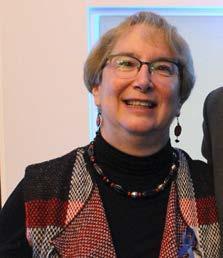
Many of us are feeling anxious and overwhelmed, helpless and vulnerable. In this context, it might be hard to focus on the joy and gratitude that are connected to Pesach and found in the haggadah.
Throughout history, there have been numerous times when the Jews were faced with the same conundrum: How can we celebrate at the same time that we are crying and scared? The rabbis who created the seder ritual were no strangers to these contradictions, for they too were bemoaning the loss of a way of life and their homeland after the destruction of the Second Temple.
The seder is structured in such a way that it provides the context to have both positive and negative emotions at the same time. There is the understanding that life is not always all sweet or all bitter. So, we dip the parsley, a symbol of spring and hope,
CONTINUED FROM PAGE 4
had looked further.
How would you describe your writing style?
It’s heavily influenced by William Zinzer and “On Writing Well.” I have a document at home of my favorite “Zinzerisms,” that I take very seriously. He is also about clarity, simplicity, being succinct, not being pretentious, eliminating unnecessary words. He has an eloquent passage about all the distractions in the modern age that are vying for a person’s attention.
I want my language to be plain and understandable, without sacrificing intelligence or nuance. I loved the fact that the Phoenix was a
There is a midrash that states that after the Israelites crossed the Reed Sea and they, along with the angels, were dancing and celebrating, God was silent and did not join in the revelry. When the angels inquired why God refrained, God responded by stating, “the work of my hands is drowning in the sea and you sing songs?” (Sanhedrin 39b).
This powerful teaching reminds us that even at our moments of exhilaration and triumph, God commands us to feel empathy for the defeated. This value is exemplified through the custom of taking out 10 drops of wine (a symbol of joy) when reciting the Ten Plagues: our joy is tempered by the reality that others suffered in order for us to become free, and we are obligated to acknowledge their pain even when we are rejoicing. This year it can also be a symbol of our hurt and our pain. There are many life lessons in the Jewish worldview. The understanding that life is bittersweet is one of the most important ones. Our history is rife with oppression, persecution and tragedy, and yet, we still hold onto the idea the life can be good, that there is hope and that we have blessings in our lives for which we are obligated to feel gratitude.
While our past informs our present, we are a forward-looking people who are ever-hopeful that the future will be better. We pray every day for the Messiah, or Messianic Age, and
free paper, and I always strive in my work to be accessible, democratic, and I really resist reaching for words that people are going to need a dictionary to look up. I have a low tolerance for bullsh**, and it turns out, in this book, I encountered a master of spin, dishonesty, self-aggrandizement, rationalization, and for whatever reasons, I’m motivated to cut through that, to get to the truth of what’s really going on. To wait and have faith in a project for 15 years blows my mind – how did you keep at it?
It might be overstating it to say I’m glad it took that long, but I’m certainly very much OK with it taking that long. I wouldn’t have said that at
we believe in tikkun olam – that the healing of the world can occur and our Jewish teachings implore us to help bring that about.
The concept and belief in Elijah is a perfect example of this motif. Having never died, Elijah is seen as the harbinger who will bring in the Messiah or Messianic Age. This is why we chant about him at Havdalah, in the hope that perhaps, with this new week, we will see his appearance.
This is why we set aside a special Elijah’s chair at each baby’s birth, in the hope that this new child might be Elijah. This is why we place a cup of wine for him at the seder table and open the door, in the hope that just as we are celebrating our physical redemption from Egypt, we might also witness our spiritual redemption in the coming year.
All of these rituals underscore the understanding that while our reality is not one that is conducive to full celebration and rejoicing, we need to find balance and maintain hope.
There is a teaching that if a funeral procession and a wedding procession come to an intersection at the same time, the wedding procession has the right of way: We are permitted and allowed to feel joy, and are encouraged to do so even when it is hard. In this way, we are being true to our Jewish identities.
The themes and messages of Pesach and the seder are ones that resonate even more as a result of what is currently happening. The value and belief that everyone has a right to be free and to not hide their identity; the value of social justice that grows out of the events of the Exodus, of our need to protect the vulnerable because we know what it is like to be enslaved and unprotected; and the theme of hope for a better future that
various stages along the way, when 23-year-old me had this story fall into my lap. But for as much fire and ambition and excitement and energy as I had, I wasn’t ready as a person or as a journalist to pull this off. I have spent a lot of time in therapy asking, “What was it about this story about death and failure and corruption and people being awful that grabbed me so hard?”
Is the true-crime genre having a moment?
True crime has always had a strong presence. But there was really a moment, where in the span of about a year, “Serial” and “Making a Murderer” and “The Jinx” came out, and that prompted this new wave.
is woven throughout the seder.
By observing, we are being true to our identities; otherwise, we are letting the pharaohs of the world still enslave us.
May you all have a Zissen Pesach –a sweet and meaningful Pesach!
ANDREA M. GOUZE is a boardcertified chaplain through Neshama: Association of Jewish Chaplains, and is the rabbi at Temple Beth David of the South Shore, in Canton, Massachusetts. She has been a proud resident of Providence for 30 years.

Candle lighting times
April 2024
What do I think that’s about? In some ways, I think there’s a hunger for stories that take a more critical eye to the criminal justice system. I think the internet has a lot to do with it. Podcasts and true crime are like a match made in heaven. But I don’t really know what people are after. I think I know what I’m after.
What are you after?
There have been a lot of amazing books written about the opioid epidemic. I am a fan, as a reader and as a writer, of individual stories that get at bigger subjects through one single throughline. This story is a window into so much. It’s about medicine. It’s about medical research. It’s about medical
Greater Rhode Island
April 5 6:56pm
April 12 7:04pm
April 22 7:15pm
Erev Pesach
April 23 8:21pm Pesach
April 26 7:19pm
April 28 7:21pm
Erev 7th Day of Pesach
April 29 8:29pm 7th Day of Pesach
malpractice. It’s about this town in Ohio, Portsmouth, that I really fell in love with. It’s about telling these tragic stories. The story is so rich, and through that big story I got to explore so many different subjects.
“Prescription for Pain: How a Once-Promising Doctor
Became the ‘Pill Mill Killer’ ” (Steerforth Press) will be published on April 9. For more information, go to PhilipEil. com/book.
ROBERT ISENBERG is a freelance writer and multimedia producer based in Cranston. His latest book, “Mile Markers: Essays on Cycling,” will be released this month.
Kosher Senior Café and Programming. In-person lunches 11 a.m.-1 p.m. Monday – Thursday at the Dwares JCC, 401 Elmgrove Ave., Providence; Fridays at Temple Sinai, 30 Hagen Ave., Cranston. In-person (and on Zoom Tuesdays, Wednesdays and Thursdays) programming from 11 a.m.-noon followed by lunch and discussion noon-1 p.m. Closed for Passover 4/22-4/24 and 4/294/30. Model Passover Seder on Friday, 4/19, at Temple Sinai. Every Wednesday is chair yoga with Neal from 11-11:45 a.m. Seniors ages 60 and older as well as younger adults with a disability of all faiths and backgrounds are welcome. Suggested donation: $3 per lunch. The Kosher Senior Café is a program of Jewish Collaborative Services and is supported by the Jewish Alliance of Greater RI and Blackstone Health. Information and RSVP, Neal at neal@jfsri.org, Tyler at tyler@jcsri.org or 401-421-4111, ext. 107.
Project Shoresh Ladies’ Partners in Torah Night. Sundays 7:458:45 p.m. Providence Hebrew Day School, 450 Elmgrove Ave.,
Providence. Partner-based study group. On-site facilitators available. Free. Information, projectshoresh. com.
Let’s Talk Hebrew! Alef (Beginners). Mondays 5:30-6:30 p.m. Current session thru 4/8. Dwares JCC, 401 Elmgrove Ave., Providence. An introduction to alef bet and basic Hebrew phrases. Will work with a book. Cost: $125 (scholarship available). Information, Toby Liebowitz at tobyaane@gmail. com.
Writing Community. Mondays 6-7:30 p.m. Current session thru 6/17. No class: 4/22, 4/29, 5/27. Dwares JCC, 401 Elmgrove Ave., Providence. Instructor Jim Levanos will provide lessons, guidance and creative writing prompts to help writers find their voice. Package of 4 classes: JCC Members: $25 | Non-members: $35; individual class: JCC Members: $8 | nonmembers: $10. Information, Devorah Phillips at dphillips@ jewishallianceri.org or 401-4214111, ext. 163.
Let’s Talk Hebrew! Bet (Advanced Beginners). Mondays 6:30-7:30 p.m. Current session thru 4/8. Dwares JCC, 401 Elmgrove Ave.,
Providence. Basic Hebrew reading skills and beginning Hebrew conversation. Will work with a book. Cost: $125 (scholarship available). Information, Toby Liebowitz at tobyaane@gmail.com.
Let’s Talk Hebrew! Daled (Advanced Intermediate). Mondays 6:30-7:30 p.m. Current session thru 4/8. Virtual only. For those able to converse in present, past and beginning future tenses, and who can read and comment on easy Hebrew stories and newspaper articles. Will work with a book. Cost: $125 (scholarship available). Information, Toby Liebowitz at tobyaane@gmail.com.
Temple Emanu-El Mahjong. Tuesdays 11 a.m.-1 p.m. 99 Taft Ave., Providence. Both new and advanced players are welcome. Drop-ins welcome. Information, Shosh@teprov.org.
Let’s Talk Hebrew! Gimmel (Intermediate). Tuesdays 6:307:30 p.m. Current session thru 4/9. Dwares JCC, 401 Elmgrove Ave., Providence. Offered both in person and virtually. For those who can read and write Hebrew, and who can converse using basic vocabulary in the present and some
past tense. Cost: $125 (scholarship available). Information, Toby Liebowitz at tobyaane@gmail.com.
Let’s Talk Hebrew! Hey (Advanced). Tuesdays 6:30-7:30 p.m. Current session thru 4/9. Dwares JCC, 401 Elmgrove Ave., Providence. For those who can speak Hebrew easily in all tenses, can read articles and poetry, and can discuss a variety of current topics. Cost: $125 (scholarship available). Information, Toby Liebowitz at tobyaane@gmail.com.
ESL with Helen. Thursdays 1-3 p.m. Thru 6/20. Dwares JCC, 401 Elmgrove Ave., Providence. Geared toward beginner and intermediate English learners, class will study English vocabulary, verbs and sentences before moving on to conversational skills. Helen Kagan has a master’s degree in ESL and a teaching certificate. Ages 18+. Free. Information, Devorah Phillips at dphillips@jewishallianceri.org or 401-421-4111, ext. 163.
Teen Nights at Temple Beth-El. Most Thursdays 6-8 p.m. 70 Orchard Ave., Providence. Information, Jillian Brosofsky at jbrosofsky@temple-beth-el.org or 401-331-6070, ext. 100.
Temple Torat Yisrael Virtual Kabbalat Shabbat Songs & Torah Services. Fridays 5:45-6:30 p.m. By Zoom only. Information, temple@ toratyisrael.org.
Temple Sinai Shabbat Evening Service. Fridays 6-7 p.m. 30 Hagen Ave., Cranston. Song, prayer and reflection. With Rabbi Jeffrey Goldwasser and Cantor Deborah Johnson. Information, dottie@ templesinairi.org or 401-942-8350.
Cape Cod Synagogue Shabbat Services. Fridays 7 p.m., except second Friday of the month 6:30 p.m. when Family Shabbat services take place. 145 Winter St., Hyannis, Mass. With Rabbi David Freelund. In-person and livestreamed on website, Facebook, Cape Media, YouTube and Community Television Comcast channel 99. Information, 508-775-2988 or capecodsynagogue.org.
Temple Beth-El Torah Study. Saturdays except second Saturday of the month 9 a.m. 70 Orchard Ave., Providence. Join us for Torah study. Information, Jillian Brosofsky at jbrosofsky@temple-beth-el.org or 401-331-6070, ext. 100.
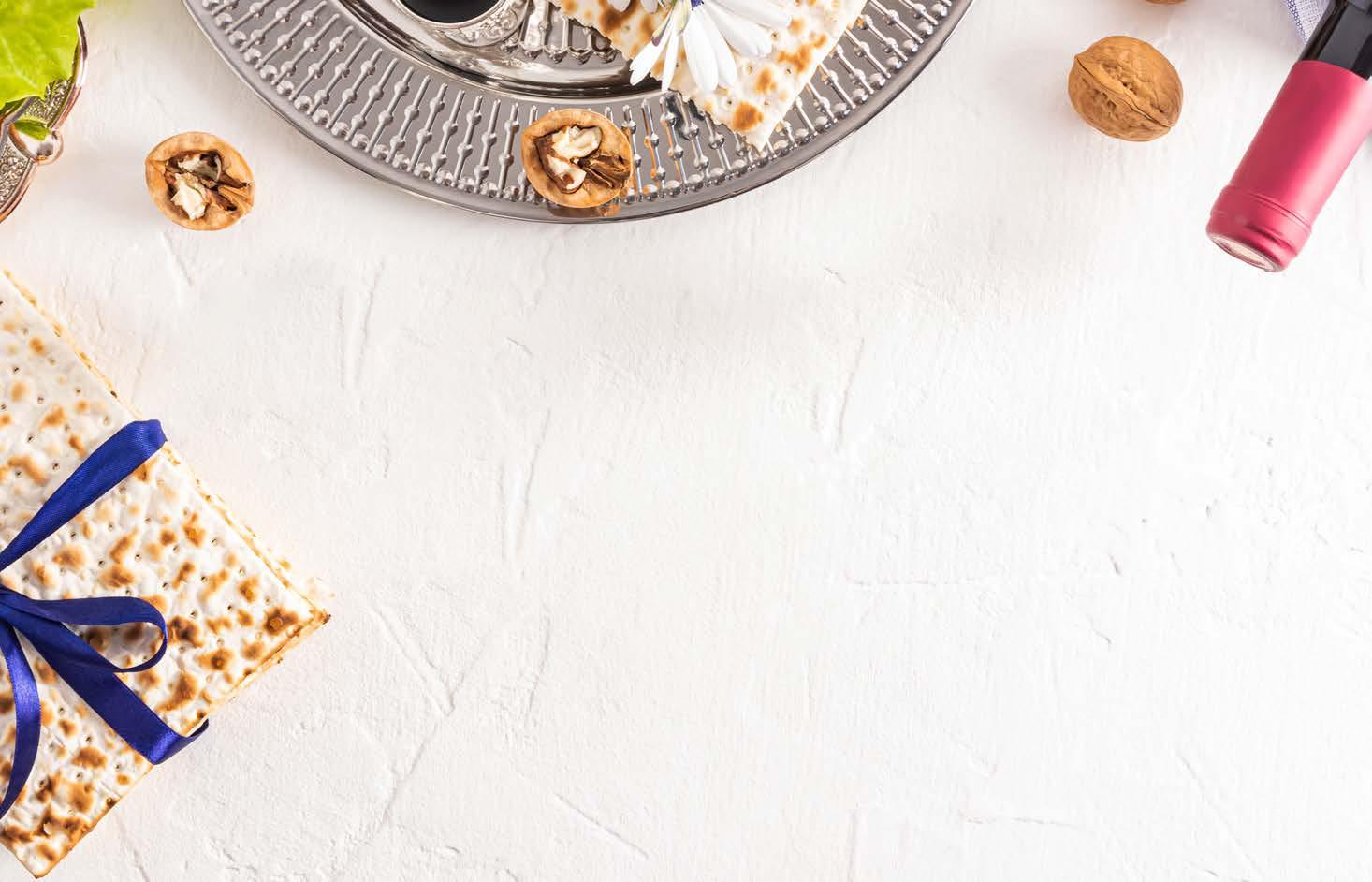
At this time each year, we gather with loved ones to retell the ancient story of liberation, reflecting on the Israelites' journey to freedom. We celebrate the resilience of the human spirit and the triumph of hope over adversity, and while we revel in the warmth of our traditions, our hearts remain heavy knowing struggle and suffering remain.
We cannot help but consider the strength and courage that resides within our people, people who have endured atrocities, sadness, and hardship in Israel, Ukraine, and here at home. We are humbled to witness tireless commitment that ensures needs are met, quality programs are provided, and our community worldwide is served with immediacy and dignity.
We are hopeful that together we will continue to tell the story of our proud community and we ask that on this Passover we come together to make a difference — to spread hope and connection everywhere, remembering that needs are great but collectively we are far greater.
We wish you a Chag Pesach Sameach and thank you for standing beside us during such a critical time in our Jewish journey.
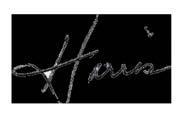
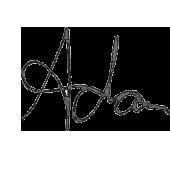 Harris Chorney Board Chair Adam Greenman President & CEO
Harris Chorney Board Chair Adam Greenman President & CEO
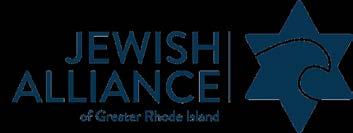
Temple Sinai Shabbat Breakfast & Torah Study. Saturdays 9:30-11 a.m. 30 Hagen Ave., Cranston. Breakfast followed by interactive discussion at 10 a.m. with Rabbi Jeffrey Goldwasser or others in the community. Breakfast RSVP and information, dottie@templesinairi. org or 401-942-8350.
Temple Habonim Torah Study. Most Saturdays 10-11 a.m. Rabbi Howard Voss-Altman leads weekly Torah study on current portion. Via Zoom. Information, Adina Davies at office@templehabonim.org or 401245-6536.
Cape Cod Synagogue Shabbat Services. Saturdays 10:30 a.m. 145 Winter St., Hyannis, Mass. With Rabbi David Freelund. In-person and livestreamed on website, Facebook and YouTube. Information, Cape Cod Synagogue at 508-7752988 or capecodsynagogue.org.
Temple Sinai Shabbat Morning Service. Saturdays 11 a.m.-noon (10:30 a.m. when celebrating a Bar or Bat Mitzvah). 30 Hagen Ave., Cranston. In-person and via Zoom. Information, templesinairi.org or Dottie at 401-942-8350.
Friday | April 5
Temple Habonim Tot & Family Shabbat. 5:45 p.m. 165 New Meadow Road, Barrington. 5:45 p.m. Tot Shabbat: Interactive service with music, story and prayer for families with young children; Pizza Dinner at 6:15 p.m.; 6:45 p.m. Family Service: One-hour restorative service designed for families with school-age children as well as those without. Information and RSVP (for pizza dinner), office@templehabonim.org or 401245-6536.
Temple Beth-El Shabbat Service. 7 p.m. 70 Orchard Ave., Providence. Information, Jillian Brosofsky at jbrosofsky@temple-beth-el.org or 401-331-6070, ext. 100.
Saturday | April 6
Temple Torat Yisrael Virtual & In-Person Saturday Morning Shabbat Services. 9:30-10:30 a.m. 1251 Middle Road, East Greenwich. In-person with Zoom available. Information, temple@toratyisrael. org.
Congregation Beth David Fundraiser with Greg Abate Jazz Trio. 8-10:30 p.m. Narragansett Casino, 11 Pier Market Place, Narragansett. Alto sax player Greg Abate has been acclaimed among the most exciting jazz artists for years. Tickets: $40 in advance. Sponsorships: $400 for table of four; $600 for table of eight. Information, Frank Prosnitz at frank.prosnitz@gmail.com or 401935-9890.
Sunday | April 7
Film “The Last Days” by James Moll. 10 a.m. Dwares JCC, 401 Elmgrove Ave., Providence. Award-winning documentary shares the stories of five people who return to their hometowns and the ghettos and concentration camps that once imprisoned them. Screening followed by a Q&A with Michael Cahana, son of one of the survivors. Free. Presented by the Sandra Bornstein Holocaust Education Center and the RI Jewish Historical Association. Information, office@rijha.org.
The Reality of Sexual Violence in War: 6-month commemoration of Oct. 7 Hamas attacks. 2-3:30 p.m. Learn more about the sexual brutality, and hear from two keynote speakers, Nitsana Darshan-Leitner from Shurat HaDin Israel Law Center and Susan Seely from NA’AMAT USA, as well as several local organizations that work directly with or support women. Via Zoom. Free. Sponsored by Rhode Island Coalition for Israel and Hadassah RI Chapter together with numerous participating
organizations. Information, Maria Friedman at maria@ ricoalitionforisrael.org.
Temple Beth-El Sisterhood
Joanne Forman Film Festival: “Farewell, Mr. Haffmann.” 2-4:30 p.m. 70 Orchard Ave., Providence. After the Germans occupy Paris, talented jeweler Joseph Haffmann arranges for his family to flee the city and offers one of his employees the opportunity to take over his store until the conflict subsides. Refreshments served. Free. Information, tbesisterhood70@ gmail.com.
Friday | April 12
Temple Beth-El Shabbat Hallelu Service. 6:30 p.m. 70 Orchard Ave., Providence. music-filled Friday night Shabbat service. A nosh, beginning at 6:30 p.m., will be followed by the service at 7 p.m. Information, Jillian Brosofsky at jbrosofsky@temple-beth-el.org or 401-331-6070, ext. 100.
Saturday | April 13
Temple Beth-El Morning Service. 9 a.m. 70 Orchard Ave., Providence. Shabbat morning service celebrates adult B’Not Mitzvah. Information, Jillian Brosofsky at jbrosofsky@templebeth-el.org or 401-331-6070, ext. 100.
Temple Torat Yisrael Bar Mitzvah Service. 9:30 a.m.-noon. 1251 Middle Road, East Greenwich. In person with streaming available. Information, temple@toratyisrael. org.
Sunday | April 14
Temple Emanu-El Sisterhood Rhode Show. 10 a.m.-1 p.m. Morris Ave. Entrance near Larch St., Providence. Bring up to 3 antique items or photos of items (no oversized furniture, artwork or weapons of any kind) to be appraised by Ken Shaw, Estate
and Antique Appraiser. Cost: $15. Passover treats will be sold. Information and RSVP (by 4/10), Temple Emanu-El at 401-331-1616.
Temple Beth-El Sisterhood Joanne Forman Film Festival: “Why the Jews?” 2-4:30 p.m. 70 Orchard Ave., Providence. A daring and important exploration of the reasons for outstanding Jewish achievement in the arts and sciences. With insights from the late Chief Rabbi Lord Jonathan Sacks, Shimon Peres, Howard Jacobson, Dr. Ruth, Noam Chomsky and more. Refreshments served. Free. Information, tbesisterhood70@ gmail.com.
Wednesday | April 17
“Teaching About Judaism.” 4:30-5:30 p.m. This workshop will explore one of the world’s oldest religions and provide a framework for teaching about all religions. For K-12 educators. Via Zoom. Led by the Institute for Curriculum Services in partnership with the Jewish Alliance of Greater RI and the Sandra Bornstein Holocaust Education Center. Information, Dori Gerber at dgerber@icsresources. org.
Friday | April 19
Temple Beth-El Shabbat Service. 7 p.m. 70 Orchard Ave., Providence. Information, Jillian Brosofsky at jbrosofsky@temple-beth-el.org or 401-331-6070, ext. 100.
Saturday | April 20
Temple Torat Yisrael Virtual & In-Person Saturday Morning Shabbat Services. 9:30-10:30 a.m. 1251 Middle Road, East Greenwich. In person with Zoom available. Information, temple@toratyisrael. org.
Tuesday | April 23
Temple Sinai Second Night Passover Seder. 5:30-9:30 p.m.
Led by Rabbi Goldwasser, the seder will include a complete Passover dinner from soup to dessert. Cost: $36 for adults; $15 for children 6 to 12; $5 for children 5 and under. Reservations and checks due 4/12. Information, Dottie at Dottie@ templesinairi.org or 401-942-8350.
Temple Beth-El Community Seder. 6 p.m. 70 Orchard Ave., Providence. Join us for a full seder conducted by Rabbi Preston Neimeiser & Cantor Judy Seplowin, dinner, dessert and shared community. Food is kosher style. Adults: $36.00 | Children 10 & under: $18. RSVP with payment (by 4/9) using form on temple’s website’s calendar or calling the office. Information, temple office at 401-331-6070.
Friday | April 26
Temple Beth-El Shabbat Service. 7 p.m. 70 Orchard Ave., Providence. Information, Jillian Brosofsky at jbrosofsky@temple-beth-el.org or 401-331-6070, ext. 100.
Saturday | April 27
Temple Torat Yisrael Passover Service with a Yizkor. 9:3010:30 a.m. 1251 Middle Road, East Greenwich. Virtual and in person with Zoom available. Information, temple@toratyisrael.org.
Tuesday | April 30
“Is the Golden Age of American Jews Ending?” 4-5 p.m. Robert Siegel (Formerly of NPR’s All Things Considered) interviews Franklin Foer (American Journalist), Dr. Leonard Saxe (Director, Cohen Center for Modern Jewish Studies, and Steinhardt Social Research Institute) and Pamela Nadell (Professor and Patrick Clendenen Chair in Women’s & Gender History, Director, Jewish Studies Program). Free virtual program. Information, Halie Shost at Halie@afrmc.org or 212-279-2522.

Before
MIRIAM PASCAL COHEN’S latest book, “Real Life Pesach Cooking” (Mesorah Publications, 2024) might be a lifesaver for those of us looking for a fresh cookbook for the upcoming holiday that offers both modern and classic Passover recipes.
On the innovative side, think Matzah Ball and Pulled Beef Sliders, Shallot and Dried Fruit Braised Roast, and Zucchini Cheese Fritters.
Unbelievably Crispy Pesach Schnitzel, Apple Crumb Kugel and even Cohen’s Best Pesach Brownies are among the classic recipes.
This is Cohen’s fourth cookbook, and this time, the focus is on recipes that fit into real life. These are recipes that you can make during the holiday with little fuss and few pieces of equipment. As she writes in her introduction, “My books are not meant to be aspirational. I am not some kind of superwoman …

I’VE ALWAYS been a fan of snowball cookies, with their soft, melt-inyour-mouth texture. And because they already contain ground nuts, it’s a great fit for Pesach baking. This version is in honor of all my fellow cinnamon fans – the flavor of it comes through strongly in every delicate bite.
Pareve or dairy
Yield about 2½ dozen cookies
INGREDIENTS
I’m like you.”
The book offers tips for modifying recipes for those who don’t use certain foods during Passover. And there are freezer tips and guidelines for planning ahead, along with notes on serving and variations.
I found the Building Blocks & Staples section at the back particularly useful. There, you’ll find recipes for homemade staples like mayonnaise, ketchup and barbecue sauce, as well as a dough
recipe that can be used for a variety of basics, such as kosher-for-Passover rolls, pizza and sandwich bread.
Cohen is the creator of OvertimeCook.com, and she has an Instagram and Facebook presence with thousands of followers. She’s on X and TikTok as well. Her other books are “Something Sweet” (2015), “Real Life Kosher Cooking” (2017) and “More Real Life Kosher Cooking” (2019). Cohen takes her own photographs and does the
food styling as well.
“Real Life Pesach Cooking,” which features 150 recipes, is available from the publisher, at artscroll.com, Amazon and at stores that sell books.
Here are two recipes from the book, reprinted with permission.
FRAN OSTENDORF
(fostendorf@jewishallianceri. org) is the editor of Jewish Rhode Island.
THIS SALAD STARTED OUT as a pareve salad, with everything but the chicken. Upon thinking about it, I felt it needed some heartiness, and addping the chicken felt like an obvious choice. If you’re a grapefruit lover (like myself), this pastel-colored salad will delight you with its tangy flavors.
Meat
Yield 6 servings
INGREDIENTS
Grilled Chicken
1½ pounds chicken cutlets, butterflied
3 tablespoons olive oil
1 teaspoon kosher salt
1 teaspoon onion powder
1/2 pound margarine or butter
1 cup powdered sugar
1 tablespoon cinnamon
1 teaspoon pure vanilla extract
1/2 teaspoon kosher salt
1¾ cups potato starch
1¾ cups almond flour
Coating
1/2 cup powdered sugar
1 tablespoon cinnamon
DIRECTIONS
Preheat oven to 375 degrees F. Line 2 baking sheets with parchment paper; set aside.
1 teaspoon garlic powder
1 teaspoon paprika
Citrus Dressing
1/2 cup olive oil
3 tablespoons lemon juice
3 tablespoons lime juice
2 cloves garlic, minced
2 tablespoons honey
1 teaspoon kosher salt
1/2 teaspoon ground
Black pepper
Salad
6-8 ounces romaine lettuce OR salad greens of your choice
2 shallots, sliced
2 medium oranges, cut into slices or wedges
1 large grapefruit, cut into slices or wedges
In the bowl of an electric mixer, beat together margarine, powdered sugar, cinnamon, vanilla and salt. Beat well until smooth and creamy. Gradually add potato starch and almond flour. Beat until combined. The dough will be crumbly but will hold together. Use a medium cookie scoop or heaping tablespoon to scoop dough onto prepared baking sheets. Bake for 10 minutes, until cookies are set.
Prepare the coating:
1 avocado, sliced 1 cup sweet potato chips, lightly crushed DIRECTIONS
Prepare the grilled chicken: Preheat oven to 400 degrees F. Line a baking sheet with parchment paper; set aside. Place all chicken ingredients into a ziplock bag. Shake or squeeze bag to fully coat chicken in oil and spices. Place chicken cutlets on prepared baking sheet. Bake 8-10 minutes per side, until cooked through; set aside to cool.
Prepare the citrus dressing: Combine all dressing ingredients in
While cookies are baking, stir together powdered sugar and cinnamon. As soon as the cookies come out of the oven, sift or sprinkle sugar mixture generously over the tops, coating cookies completely.
Cookies can be frozen in an airtight container or bag. The powdered sugar coating may dissolve somewhat in the freezer, but the taste and texture of the cookie will not be affected.
a small container. Shake well to combine.
Assemble the salad: Toss together lettuce and shallots in a salad bowl. Arrange orange, grapefruit, and avocado slices on top. Slice chicken into thin strips; arrange over salad. Sprinkle with sweet potato chips. Just before serving, add dressing; toss to combine.
Chicken can be prepared up to 2 days ahead of time. Dressing can be prepared up to 1 week ahead of time. Salad should be assembled fresh.

Passover, which will arrive in late April this year, hasn’t been normal since 2019.
F irst came the pandemic years of 2020 and 2021, followed by the improved, but cautious, year of 2022.
ALTHOUGH THE PANDEMIC was a fading memory by last Passover, the sharp rise in antisemitism cast a pall over the holiday.
This year, as I look forward to celebrating Pesach and eating matzah and the other festive foods again (albeit gingerly, due to some dental work), it appears that the theme of the 2024 holiday will be one of tsuris, heartache and fear due to the serious challenges that we’re facing, both home and abroad.
tion in Gaza, which followed Hamas’ brutal attack on Israel on Oct. 7, should give all peace-loving American and Israeli Jews reason to pause.
The civilian casualties in Gaza have been especially shocking and frightening, and any attempt to rationalize the carnage by using the biblical “eye for an eye” argument seems way out of line.
In addition, the devastating humanitarian toll on the vast majority of people living in Gaza, who are badly in need of food and medical supplies, is needlessly punishing the innocent.
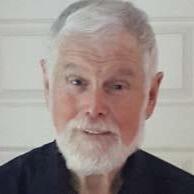
That’s why I thought it’d be appropriate to mention several things that I’ll be praying for leading up to Passover – which is still my favorite Jewish holiday because of the treasure-trove of family memories that the holiday conjures up.
As Passover approaches, I’ll pray for:
A long-term cease-fire between Israel and Hamas that leads to a permanent truce and lasting peace in Israel and the Middle East The extent of the destruc -
All of that – including the women and children who have been killed or horribly maimed in both Gaza and Israel since the war began – should be ample reason for Jews to pray for an end to all hostilities.
The hard truth is that what’s been happening in Gaza is only going to make it easier to hate Jews now and for decades to come, which brings me to my next prayer, for:
A reduction in, if not the outright eradication of, antisemitism in the region, country and world. That includes the alarming rise in antisemitism on campuses at U.S. colleges, where far too many students are
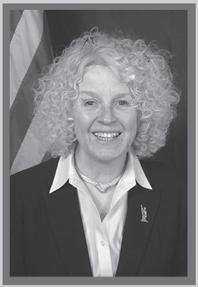
living in fear.
Although antisemitism had been sharply increasing in the last couple of years, according to the Anti-Defamation League and other sources, it has skyrocketed out of control since the Oct. 7 attack and Israel’s response. The war has, unfortunately, enabled the haters to intensify their hatred of Jews.
I’ll pray for an end to the disdain and contempt for all minorities, and for those with opposing political viewpoints, that has been poisoning our national discourse. Intolerance, anger and irrational hatred have sadly replaced compassion, compromise and any desire or willingness to work together – and that doesn’t bode well for the future of the United States.
I’ll pray that the leaders of both major political parties put the national interest ahead of partisan
politics, and get serious about tackling the immigration issues that have plagued us for decades. In late February, a bipartisan immigration agreement was reached in the U.S. Senate, before it fell apart when most GOP members in both houses of Congress decided to put their prospects of winning in November ahead of passing legislation to improve the border situation. Which leads to my next prayer:
That politicians and far too many Americans will stop demonizing immigrants, who have historically had a positive impact on the American economy since the nation’s founding. Smearing all immigrants as evil and making them the scapegoats for what’s wrong with the country is not only inaccurate, but it’s also disingenuous and plays into all of the stereotypes used to foment hatred. Plus,
it ignores the history of the United States as a haven for immigrants, which we all were at some point.
This prayer is especially fitting for Passover, which relates the story of the Israelites, who were immigrants in Egypt, as they fled slavery there to form a new nation.
I’ll pray that the more than two-year-old war in Ukraine will come to an end, and that America’s leaders will unite behind the need to stop Russian President Vladimir Putin’s desire to take over that country
Finally, I pray that all of you have a very healthy and enjoyable Passover with your relatives and friends.
(larrythek65@gmail.com) is a freelance writer based in North Attleboro. He blogs at larrytheklineup.blogspot. com.


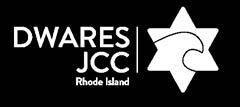

Poets praise folly, perhaps to protect their art form from harsh assaults. Poets praise folly, perhaps to protect their art form from harsh assaults.
I HAVE EXCERPTED a few lyrical phrases, or bits of verse, and leave the rest to the reader.
Edward R. Sill, a Victorian who crafted rhymes, told an ironic tale of a royal authority on his throne who calls on his court jester to amuse and distract his assembly. I cite the first, and last, stanza of “The Fool’s Prayer.”
The poem starts with a command: “Sir Fool, make for us a prayer!” And the jester, with his silly bells and gear, starts in with “O Lord, be merciful to me, a fool!” but continues with a
list of human injustices, and closes with “Men crown the knave and scourge the tool that did his will. …”
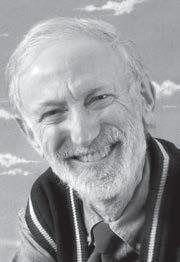
And get this, how the poem closes: “In silence rose the King, and sought his gardens cool and walked apart and murmured low, ‘Be merciful to me, a fool!’ ” This variation on the theme of universal suffering and endless error has stayed with me since my grammar-school days, when you used to have to recite rhymes by rote on a stage with a curtain.
But, really, I just want to
salute April Fool’s Day and to wish King Charles well in his current condition and within his valuable garden. He is, after all, a melancholy monarch, and I would like to dedicate this humble homage to the nuances of “poetry” as an art form.
Shakespeare gave the wisest words to the fool Polonius, the doomed fool despised by Hamlet, the “hero.”
‘Poetry and painting share a common fate...’
You see, I had a brother, Charles, who could draw much better than I ever could. I was jealous, just a bit, but I could recite and rival his verbosity with my talkative nature. … For all my mistakes in life, I pray to the powers that be, “Be merciful to me, a fool!”
Perhaps poetry and painting share a common fate … and trait. They are seldom obvious. To do a portrait, the artist might say to the model, “Turn away ... this will be a “profil perdu,” or a “lost profile.” Or the artist may prefer a skiff to a ship, to suggest, not state, the grandeur of river or sea.

In my columns, I often “confess” rather than rave. My role models embrace the modest and self-mocking essayists, never the wise words of sages, and I wear with pride a cap with the scrawled signature of humble humorist James Thurber (but with a brim pin proudly proclaiming the two flags, our American stars and stripes linked/connected to the Israeli pennant with the Star of David.)
P.S.: I blame the tsuris of our culture on the computer and its AI, and the “capitalist” editing and overuse of the words “now!” and
“today!” to rush us and hasten us to pay – not to contemplate, to take time to mull things patiently.
On the other hand, my debating days in public schools instructed me in the art of changing your mind, or at least looking at things with a fresh perspective. Which explains why I have to wear that hat, to recall both the ambiguity of artistry and also the forceful commitments to what is closest to our lives and hearts.
MIKE FINK (mfink33@aol. com) is a professor emeritus at the Rhode Island School of Design.
ome 2-6% of Americans are hoarders, and hoarding disorders are on the rise, according to the International OCD Foundation.
“SINCE THE COVID-19 pandemic, experts say they’ve seen a greater emphasis on hoarding disorder, characterized by resistance to give up any belongings no matter how useless they might be,” Susan Kreimer writes in the article “Compulsive hoarding comes into greater focus since pandemic,” posted at UPI.com.
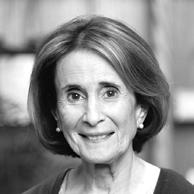
Kreimer goes on to quote Dr. Michelle DiBlasi, chief of inpatient psychiatry at Tufts Medical Center, who said, “In general, hoarding has become more frequent and severe since the pandemic …. It’s a way to protect [our]selves” from the privations experienced during the COVID years.
How does hoarding relate to Passover? In addition to the symbolism and meaning of Passover, when we prepare and clean for the holiday, we are taking a preventive measure against clutter, disorder and hoarding.
Although the focus for Passover cleaning is on removing hametz (foods and drinks that are forbidden on the holiday), not spring cleaning, it gives us a great opportunity to take inventory of our possessions and clean out the things we no longer need. It’s a wonderful way to declutter!
And I know how I feel when my space is clear and clean: I feel focused and unencumbered. And probably you do too.
So, as we and/or our helpers clean, organize, scrub, shine and dust for Passover, think about what Elana Mizrahi wrote in her article, “Knowing the Goal: Passover Lessons,” posted at https://www.chabad.org/ theJewishWoman.
Mizrahi writes, “This year
as I sit against a comfortable pillow at my Passover table, my home sparkling clean, my closets neatly organized and my home in order (at least for twenty-four hours) the smile that I sport on my face is genuine. Reaching this moment was not easy, but the whole time I told myself, ‘Stay focused on the goal.’ ”
The article continues, “You see, with each drawer that I cleaned, I sang, and with this singing, I know that I brought down holiness into the world. And this, my dear friends, is the difference between Passover cleaning and spring cleaning, between cooking and Shabbat cooking. It’s about focusing on the end goal and knowing that with each action that you do you can raise it up and make it holy. Sounds far-fetched and just a theory? Just try saying ‘in honor of Passover’ the next time you mop and let me know what happens.”
For me, Mizrahi’s commentary is real, thoughtful, practical and spiritual, all wrapped into one. It’s a great example of our beliefs driving our attitudes and our actions.
PATRICIA RASKIN , owner of Raskin Resources Productions, is an awardwinning radio producer, business owner and leader. She is on the board of directors of Temple Emanu-El, in Providence. Her “Positive Aging with Patricia Raskin” podcast is broadcast on the Rhode Island PBS website, ripbs. org/positiveaging.


Because
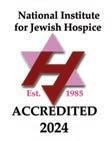
Arthur Robbins and I became good friends through some historical projects decades ago.
Most of the sessions were recorded in his Providence office, opposite the Marriott hotel on Orms Street, but the culmination was a visit to Woonsocket, Arthur’s hometown.
ABOUT 25 YEARS AGO, he invited me to conduct oral-history interviews with his dear aunt, Eve Medoff Goldberg (1898-2002), which I much enjoyed. In 2012, he commissioned me to record a series of interviews with his close friend, Peter Mezei, and help write an article about Mezei for the Rhode Island Jewish Historical Notes.
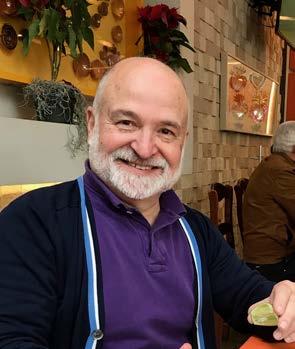
About five years ago, Arthur again com missioned me, this time to serve as an interviewer in a video documentary series about his own deeply caring life.
The video crew and I were introduced to numerous local landmarks – homes, schools, parks and businesses – from his childhood and early married life. The idea was to superimpose some of these images over our conversations.
Ultimately, Arthur was somewhat disappointed with the documentary series – because of its success! He thought that six hours was too long. He was afraid that not even some of his closest relatives, especially his grandchildren, would take the time to view it.
Arthur, who had grown up in Woonsocket’s Congregation B’nai Israel and would become a guardian of its cemetery, was mourned on Feb. 22 at his Providence congregation, Temple Emanu-El. He had reached 91 years of age.
Wanting to pay my respects to Arthur’s family, I attended one of three shivas held at the Marriott, perhaps the best known of his highly successful hotel projects.
Not expecting to see any of my acquaintances, I felt rewarded by several encounters. For example, Richard Applebaum, my fellow Beth-El congregant, was wearing a metal pin on his lapel, which I asked him to identify. A symbol of the Rotary, it demonstrated his decades-long bond with Arthur. Richard is a past president of the Providence chapter, and Arthur attended many of the monthly meetings, which were held at the Marriott.
Inevitably, while waiting
in line to pay our respects to Arthur’s family, Richard and I mentioned some mutual Beth-El friends. One had told me about Richard’s kindness when helping an elderly participant on a temple mission to visit Cuban Jews. I know this elderly woman and was also so grateful for his courtesies.
I then recognized another of my contemporaries, whom I had not seen in many years. Alan was seated by himself. I knew him from Shabbat services at Chabad House, where he was a regular participant, but I only attended when requested to help form a minyan. Alan, who has poor eyesight, could not drive, so he always depended on rides from Rabbi Yehoshua Laufer or fellow congregants.
I had occasionally wondered if Alan were still living, and here was proof. So we tried for several minutes to reminisce, but it was extremely difficult. His vision and speech had fur-
ther deteriorated. Indeed, I was surprised that he recognized me – perhaps it was only from the sound of my voice.
I HAD NEVER met Arthur and Judy’s three children, but I especially wanted to console his two daughters, Carolyn and Alisa. Both are alumnae of Providence’s Lincoln School, where my daughter, Molly, had graduated decades later.
Fortunately, I was able to have more than a brief conservation with Alisa Doctoroff. She is a past president and chair of New York City’s UJA-Federation. Such an amazing accomplishment for a native Rhode Islander!
Of course, I had to boast that Molly has been a staff member of UJA-Federation for eight years. Her responsibilities include allocations to New York City’s Hillel chapters, Jewish community centers and camps.
CONTINUED ON PAGE 21
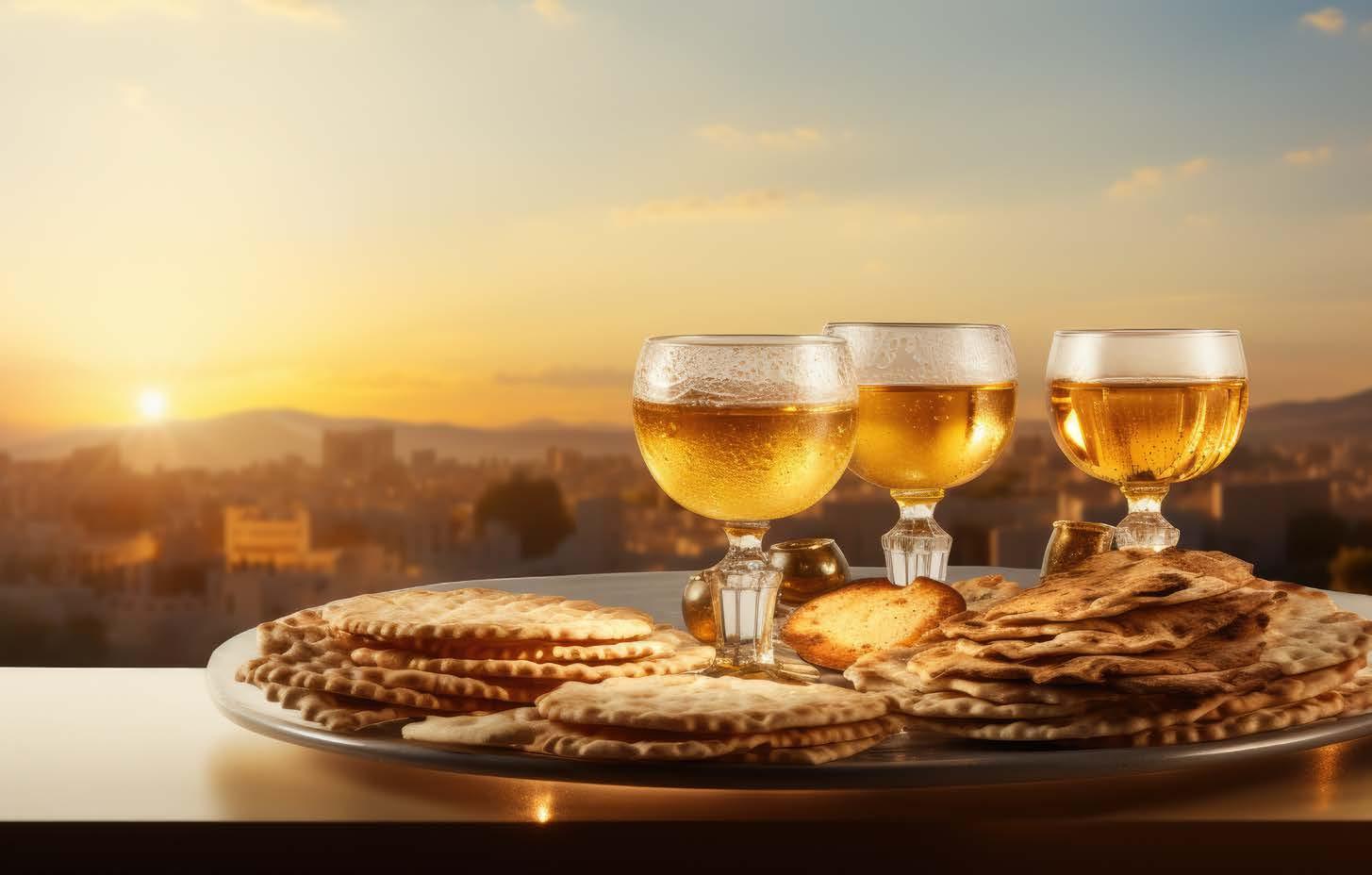
As the American-Israeli poet Marty Herskovitz thought about the upcoming Passover holiday, the prospect of singing “Dayenu” at the first seder since his country was attacked didn’t sit right with him.
THE CLASSIC Passover song, whose title means “It would have been enough,” expresses gratitude about how much God has done for the Jewish people. But Herskovitz, who has lived in Israel since 1986 and is the son of a Holocaust survivor, thought the words would ring hollow at a time when so many Jews are at risk.
“We have to take the text and find a way to make it relevant, and not just say the words that seem so impossible to say,” Herskovitz told the Jewish Telegraphic Agency. “ ‘Dayenu, it’s enough.’ It’s clearly not enough. As long as people are trapped in Gaza, that’s not enough. As long as our soldiers are still risking their lives, it’s not enough. We can’t say ‘Dayenu.’ It can’t be, you know, ‘Praise God for this situation.’ So we have to find new texts.”
It’s a mission that has long animated Herskovitz, who used the financial award from a legal settlement after his then-teenaged son was injured in a terrorist attack, in 2001, to create a fund to support education initiatives in Israel.
The fund has backed his own Creating Memory initiative at BarIlan University, which focuses on Holocaust remembrance through art, and also Israel’s Conservative Schechter Rabbinical Seminary.
Earlier this year, at Herskovitz’s urging, Schechter convened dozens of rabbis and Jewish community leaders from across Israel to reimagine the haggadah, the core text of the Passover seder. The result of their work will be a supplement for Israeli families to use during their seders at the beginning of the first major holiday since Hamas attacked Israel on Oct. 7 – an assault that itself pierced the observance of a Jewish holiday, Simchat Torah. (The Oct. 7 attack reportedly had originally been planned for the first night of Passover 2023.)
Many seder tables will have empty seats representing Oct. 7 victims, hostages and soldiers who are unable to return home for the holiday. But the seminary sought to provide rabbis and their communities with other ways to adapt the ancient
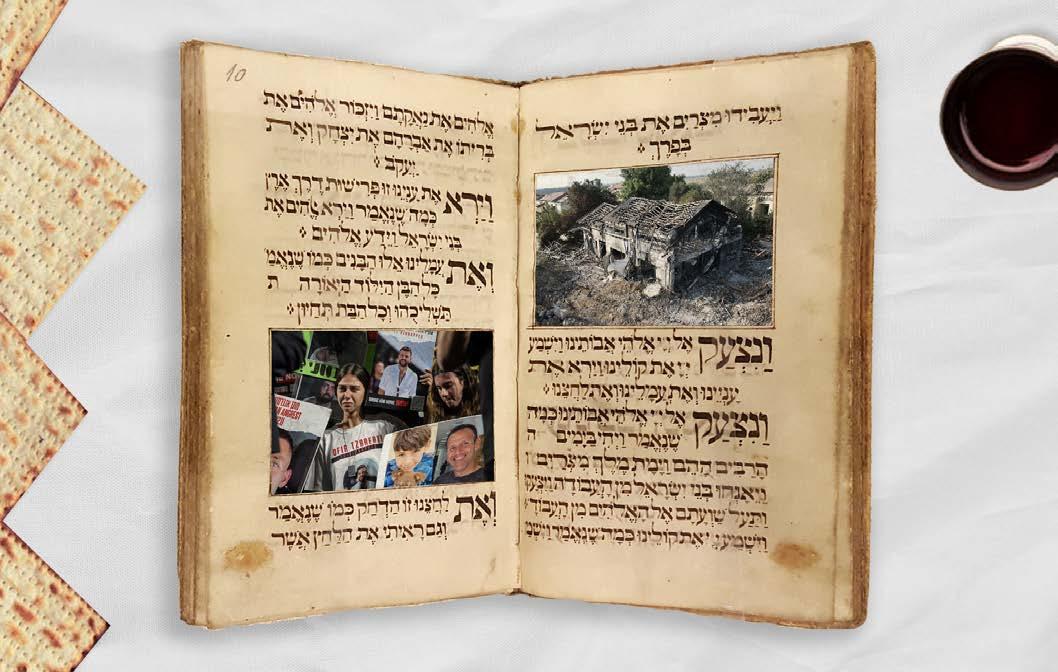
tradition to the current moment.
“The Passover holiday is really one in which families celebrate on their own,” said Rabbi Arie Hasit, Schechter’s associate dean. “It will be the job of rabbis and community leaders to frame Purim [the festive holiday in late March], because the ritual aspects of it are largely going to happen in the synagogue, or in the Jewish community. But Passover is going to happen in the home. So our job right now, which is so significant, is to help people navigate how to prepare.”
Among the supplement’s passages is an addition to the seminal “Four Questions” recited during the seder, which ask, “Why is this night different from all other nights?” The added text aims to reflect the feelings of seder attendees this year.
“On all other nights, we think that we have answers. Tonight, we all just stay silent,” says the passage, which is in Hebrew. “On all other nights, we remember, sing and cry. … On this night, we only cry.”
The initiative is one of several underway to adapt the Passover holiday for a different crisis in the Jewish story.
Rabbi Menachem Creditor, the scholar-in-residence at UJA-Federation of New York, is working on a haggadah supplement with the Academy of Jewish Religion (AJR),
a pluralistic rabbinic school in Yonkers, New York.
“To talk about liberation when our family is not yet whole again is very hard, and our own tears will mix with the maror,” Creditor told JTA, using the Hebrew word for the seder plate’s bitter herbs. “We won’t need the haggadah’s usual explanation of what bitterness feels like.”
Creditor said AJR’s CEO and academic dean, Ora Horn Prouser, approached him with the idea of creating a Passover supplement
‘To talk about liberation when our family is not yet whole again is very hard...’
about the ongoing Israel-Hamas war. They put out a call for submissions – prayers, essays, artwork and reflections – and received dozens of responses, which will be edited into a resource AJR will self-publish and sell on Amazon. Parts of the final supplement will also be available for free on the seminary’s website.
“This is a supplement that very directly addresses our current time and provides a community of thinking that we can bring into our seders,” Horn Prouser told JTA.
In addition to “Dayenu,” Creditor and Horn Prouser pointed to one
particular piece of the Passover text with new resonance this year: “Vehi Sheamda,” the prayer that warns that in every generation, a new enemy will attempt to defeat the Jewish people. This year’s crisis conjures new ideas about both the enemy and how to vanquish it, Creditor said.
“The language in the seder, in the haggadah, is that God will save us,” Creditor said. “But Zionism represents a very different religious posture, which is: We will save us.”
“Unfortunately, the first part of the paragraph remains true, and was amplified horribly on Oct. 7,” Creditor continued. “The second half of it must be true through the connection that we have, as a Jewish people throughout the world, strengthening our homeland.”
The Passover initiatives in both Israel and the United States add to a long tradition of haggadah iterations and supplements that layer present-day issues onto the ancient text, from those centered on Soviet Jewry to more recent examples, like additions about the Ukraine war and the pandemic. Last year, some families left an empty seat at their seder table in honor of Evan Gershkovich, the Jewish Wall Street Journal reporter who remains jailed in Russia.
JTA – Sauce gribiche is a cold egg sauce that originated in 19th-century France when the so-called “mother sauces” (or grandes sauces) were being defined by chefs Marie Antoine Carême and August Escoffier. It is a derivative of mayonnaise, but unlike that classic emulsion, which uses raw eggs, gribiche is characterized by the use of boiled eggs.
THE SAUCE , which is often compared to a remoulade, harnesses the briny flavor of capers and cornichons, and bright herbaceous notes from any combination of parsley, chervil and tarragon.
While it sounds a bit fussy, gribiche is as easy to make as it is versatile. Throughout Passover, when my dining choices are more limited
than usual, sauce gribiche becomes a staple.
After the seder, I use my leftover parsley and a couple of eggs to whip up a batch that will hang out in the fridge, its flavor improving over the next few days. The sauce brings a silky-chunky texture to whatever it touches, from the traditional veal to the more modern blanched spring vegetables,
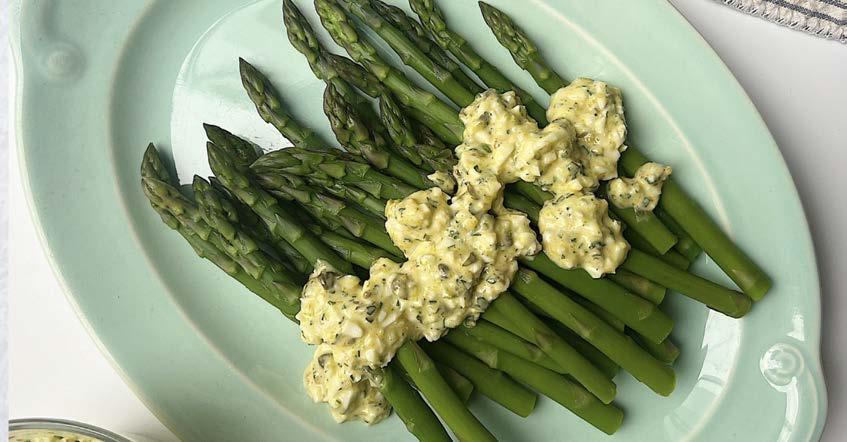
like asparagus and new potatoes.
I like to add it to hardboiled eggs for an egg-onegg breakfast, drape it over poached salmon for lunch, and occasionally pile a bit on a piece of matzah and eat it just like that.
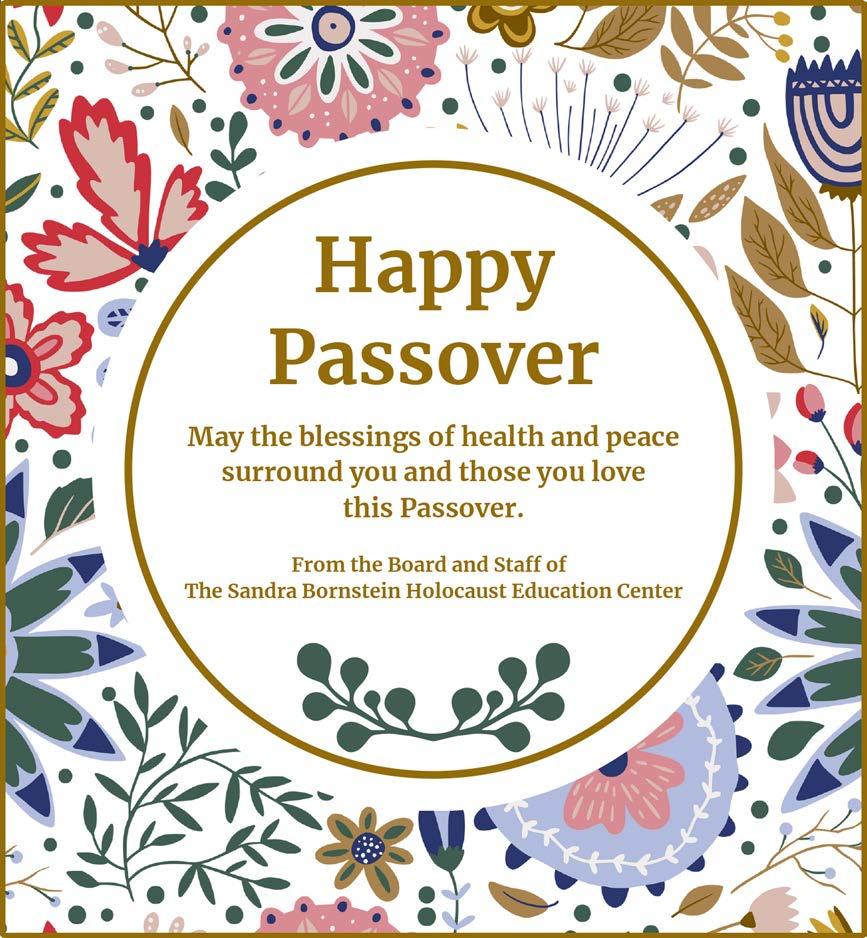
There are many variations of gribiche. Some prefer a soft-boiled egg, which results in a looser sauce, while others, myself included, gravitate toward a slightly firmer yolk, which renders a richer gribiche. Some insist on a medley of herbs, and others choose only one. Either way, the simple sauce comes together in about five minutes once your eggs are ready.
And while, traditionally,
INGREDIENTS
2 large eggs
1 tablespoon chopped fresh parsley (4 stems worth)
1 tablespoon chopped capers
1 tablespoon chopped cornichons (about 3)
1 teaspoon Dijon mustard (or kosher for Passover mustard of choice)
2 teaspoons Champagne vinegar, or vinegar of choice
¼ cup extra virgin olive oil
kosher salt and cracked black pepper, to taste
DIRECTIONS
In a medium saucepan, add two eggs and cover with salted water. Bring to a boil over medium-high heat. As soon as the water starts to boil, turn off the heat and set a timer for 7 minutes.
Meanwhile, prepare a bowl with ice water. When the timer goes off, use a slotted spoon to transfer the eggs to the bowl of ice water. Allow
sauce gribiche is made with Dijon mustard, which contains kitniyot, readers who want to avoid mustard seeds can use kosher for Passover mustard.
Once you’ve got the basics down, gribiche is a bit of a playground – add your favorite briny things (Castelvetrano olives! Piparra peppers! Anchovies!) or swap out the Champagne vinegar for any vinegar you desire. It’s hard to go wrong. This recipe was first published on The Nosher.
eggs to cool for 3 minutes and then peel.
While the eggs are cooking, pick the leaves from 4 stems of parsley, and chop until you have 1 tablespoon. Chop 1 tablespoon capers and 1 tablespoon cornichons (about 3). Set aside.
Separate the egg yolks from the whites. Finely chop the egg whites and set aside. Press the yolks through a fine mesh sieve into a mixing bowl. Add 1 teaspoon Dijon mustard and 2 teaspoons Champagne vinegar, and whisk to combine. Slowly drizzle in ¼ cup extra virgin olive oil while whisking. The sauce will become thick and lighter in color as the oil emulsifies into the egg mixture.
Fold in the chopped parsley, capers, cornichons and egg whites. Season with salt and pepper.
Makes 3/4 cup sauce.
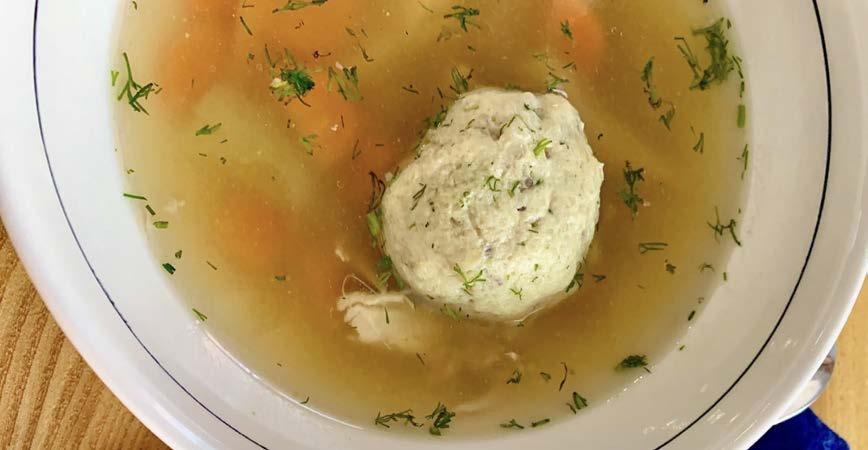 BY GAIL SIMMONS
BY GAIL SIMMONS
JTA – Though my Grandma Snazzy, my mother’s mother, seemed to barely eat a thing (to this day, I am convinced she subsisted on toast and coffee), she was a wonderful Jewish cook. One of her specialties was chicken soup, which she lovingly made from scratch for Friday night
dinners and Jewish holidays.
Loaded with carrots and tender poached chicken, it was simple yet deeply delicious, and I looked forward to it all week long.
Now I make my own Grandma Snazzy Soup, adding a few twists of my own. One slurp of this hearty hodgepodge instantly conjures up memories of being
INGREDIENTS
For the chicken and stock
1 (4-5 pounds) chicken, thighs and breasts separated
4 medium carrots, coarsely chopped
4 medium celery ribs, coarsely chopped
2 medium yellow onions, cut into wedges
1 head garlic, halved crosswise
8 sprigs fresh flat-leaf parsley
1 tablespoon whole black peppercorns
For the matzah balls
4 large eggs, lightly beaten
¼ cup schmaltz (rendered chicken fat) or canola oil
3 tablespoons club soda
2 tablespoons finely chopped fresh dill, plus more for serving
1 cup matzah meal
½ teaspoon baking powder
kosher salt
freshly ground black pepper
half a lemon (optional), for serving
DIRECTIONS
For the chicken and stock: Combine all the chicken and stock ingredients in a large stockpot. Add 3½ quarts water and bring to a boil over high heat. Reduce to a gentle simmer and cook
until the chicken breasts are cooked through, about 20 minutes.
Transfer breasts to a plate. Let cool slightly, then remove the meat from the bones and set aside. Return the bones to the stock. Continue to simmer, skimming foam from the surface occasionally, until the liquid is reduced by one-third, about 2 hours. Meanwhile, shred the breast meat and refrigerate, covered, until ready to use.
Strain the stock through a fine-mesh sieve into a large bowl. Carefully pull out carrot and celery pieces, rinse them gently if needed, and refrigerate in a covered bowl until ready to use. Pick through and shred the dark meat, then refrigerate with the breast meat. You should have about 4 cups meat and 10 cups stock.
For the matzah balls: In a large bowl, whisk together the eggs, schmaltz, club soda and dill. Stir in the matzah meal, baking powder, 2 teaspoons salt and a few grinds of black pepper. Refrigerate uncovered, at least 30 minutes or up to 2 hours.
Bring a large Dutch oven or wide, heavy pot of well-
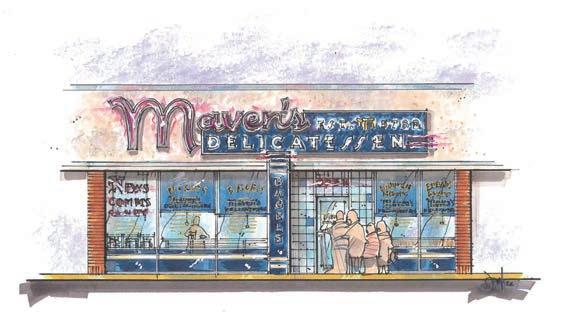
surrounded by family, being nurtured and loved. A comfort-food powerhouse, it’s sure to nourish and invigorate you.
Note: The stock, chicken and vegetables can be made ahead and refrigerated, covered, for up to 3 days, or frozen for up to 1 month. This recipe was first published on The Nosher.
salted water to a boil. Scoop out the matzah ball mixture, 1 tablespoon at a time and, using wet hands, gently roll into balls. Add the matzo balls to the boiling water, then reduce to a gentle sim mer. Cover and simmer until the matzah balls are plump, cooked through, and begin to sink to the bottom of the pot, 30-40 minutes. Remove from the heat. The matzah balls can be kept in the pot of warm water, covered, until ready to serve.
Make the soup: While the matzah balls are simmering, warm the stock in a large pot and season with salt and pepper. Slice the carrots and celery into 1/2-inch pieces and add to the soup. Add 2 cups shredded white and/ or dark chicken meat and simmer to warm through, about 2 minutes. (Reserve the remaining chicken to use in salads, pastas or other dishes.)
Ladle the soup, with chicken and vegetables, into bowls. Using a slotted spoon, transfer a matzah ball or two into each bowl. Top with a pinch of dill, and a squeeze of lemon, if desired.
Serves 8.



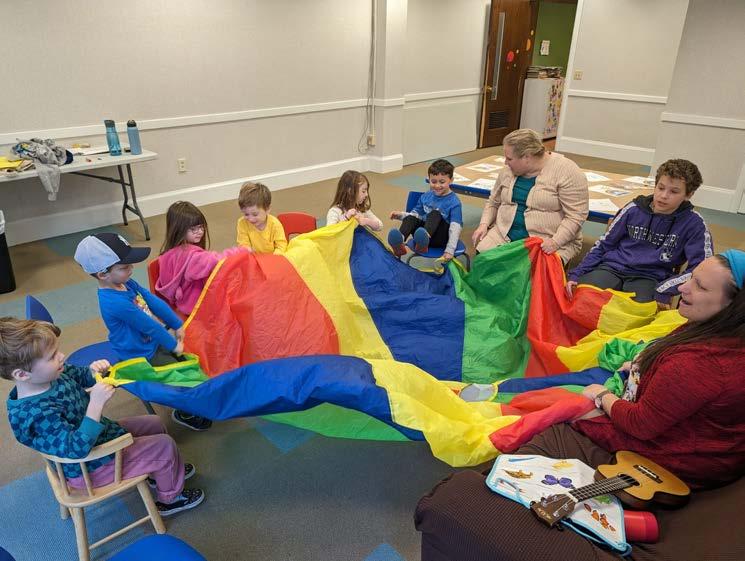
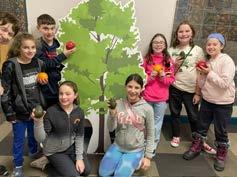
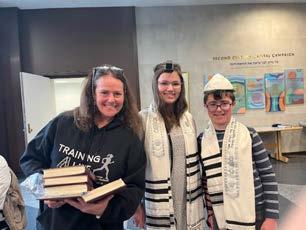
JTA – Cacio e pepe translates to cheese and pepper, and the classic Roman pasta dish includes little more than these eponymous ingredients. In the classic recipe, spaghetti and salted pasta water combine with a salty sheep's milk cheese called Pecorino Romano to create a silky, luxurious sauce that far surpasses the sum of its parts.
For the past few years, cacio e pepe has been a darling of chefs and food fanatics. In a 2021 Los Angeles Times article, Jenn Harris shows that the origins of the relatively modern pasta dish are somewhat cloudy: Black pepper would have been too expensive for most Romans until the middle of the 20th century.
It’s likely the dish can trace its popularity to the osterias
of the 1950s and ’60s, where it was probably sold to encourage patrons to drink more wine. Now, you can find cacio e pepe in everything from bagels to lasagna. Never one to miss a trend, Trader Joe’s has released several cacio e pepe products, including a jarred sauce and cacio e pepe puffs.
We eat a lot of matzah brei at my house, so it was only a matter of time before I thought to mash up my morning matzah brei with this trending flavor combination. Cacio e pepe’s sharp cheese and smack of black pepper are a nice balance to eggy-creamy matzah brei, and it can be on the table in about 10 minutes, making it a simple, satisfying weekday breakfast. This recipe was first published on The Nosher.

INGREDIENTS
2 large eggs
1 tablespoon whole milk
2 sheets matzah
1 tablespoon butter or margarine
½ cup Pecorino Romano cheese, finely grated
½ teaspoon freshly cracked black pepper
⅛ teaspoon kosher salt
DIRECTIONS
Crack 2 large eggs into a small bowl with 1 tablespoon milk, and
whisk until beaten. Crumble 2 sheets of matzah into the egg mixture, and allow to sit for 3-5 minutes, until soft.
Meanwhile, heat 1 tablespoon butter or margarine in a medium nonstick skillet over medium heat. Pour the matzah-egg mixture into the pan, and while the eggs are still loose, sprinkle in ½ cup grated Pecorino Romano and ½ teaspoon freshly cracked black pepper. Cook until the eggs are just set, 1-2 minutes, and season with ⅛ teaspoon kosher salt. Serve immediately. Serves 2.

This Passover, we’ll take care of the cooking. Red Wine Brisket, Apple-Honey Chicken, Citrus Roasted Salmon… Order it all and more by 5 PM 4/16 for delivery on 4/21.
Scan the QR code for the full menu and get $10 o with code
CONTINUED FROM PAGE 13
“The haggadah is something that developed and, as modern Jews who are dealing with issues of the same themes that have come up again and again in our history, we need to figure out how to make those themes accessible, relevant, real and useful,” said Rabbi Sara Cohen, a Schechter alumna who helped plan the seminary’s conference in Israel.
table.
“We know that [Passover’s] coming, and we know that it’s going to be different,” he said. “We know that it’s going to include processing everything that has happened since Oct. 7. And no matter what happens tomorrow, and the day after that, none of that is going to change.”
Horn Prouser shared a similar sentiment.
over. “You cannot use the same text and the same ideas that you used for years and years because this year is so radically different. And to go back to the old text, the old ideas, is basically making it irrelevant.”
Search for Chometz – Sunday night, April 21
Fast of first-born – Monday, April 22
Monday, April 22
Times for Providence area
Cohen, who lives on Kibbutz Ketura, near the southern port city of Eilat, where the population swelled with war evacuees, said the text offers an important opportunity for the kind of emotional reckoning that is desperately needed in a battered Israel and Jewish world.
“I bring my Porsche to German Motors every year for an oil change. The service and professionalism is excellent.
Gerry and his assistant have been there for me anytime I had questions/concerns about the car. Highly recommnend their service, always do a great job!”
–Ani N., Pawtucket, Porsche 911
“We don’t necessarily think of holidays as a time for processing trauma, but because Passover is the first major holiday since [Oct. 7] and because it’s a holiday that the story of which talks about national trauma and redemption, one of the questions is, ‘What is redemption in our day, and are we feeling redeemed, are we feeling free?’ ’’ Cohen said.
“When you’re brought face to face with the holiday that brings up these issues, hopefully we won’t just pass them by, but we’ll think about how it’s relevant in our lives today.”
“Even if our prayers are all answered, our community is feeling trauma,” she said. “The issues to discuss, we still need time to process them.”
Herskovitz said he views the Passover effort as a cognate of his Holocaust remembrance work, in which he emphasizes the importance of creating fresh, personal materials that people can connect with.
“I think the same exact thing is what has to be done in Pesach this year,” he said, using the Hebrew word for Pass -
“Highly knowledgeable mechanics. A friendly business establishment, highly recommended by many, most of all, you will not get a better price and they know German cars! Thank you Gerry, Tracy and the crew.”
Eating Chometz.....................................until 10:26 am
Sell & Burn Chametz..........................before 11:35 am
Passover begins..............................................7:15 pm
Seder begins / Matzah is eaten.............after 8:05 pm
Passover ends..................Tuesday, April 30, 8:05 pm
Monday, April 22..............................7:15 pm
Tuesday, April 23......................after 8:20 pm
Friday, April 26..................................7:19 pm
Sunday, April 28...............................7:21 pm
Monday, April 29......................after 8:28 pm
April 5, 2024 –Passover
Deadline - March, 2023
Submitted - December 4, 2023
She added, “We have to pay attention to the desire to process the trauma and the framework that our tradition gives us for processing it.”
Submitted - December 4, 2023
Submitted - December 4, 2023 The Jewish Voice Rep: Peter Zeldin B&W spot ad: 2" X 3"
May you be blessed with peace and happiness.

Rhode Island Jewish Historical Association info@rijha.org | 401-331-1360 | rijha.org 401 Elmgrove Ave., Providence, RI 02906
April 22.......First Eve of Passover.........1 & 3
April 23.......Second Eve of Passover....1 & 3
May 3, 2024 –Pets Deadline - April, 2024
April 26.......Eve of Shabbat......................2
April 28.......7th Eve of Passover..............1
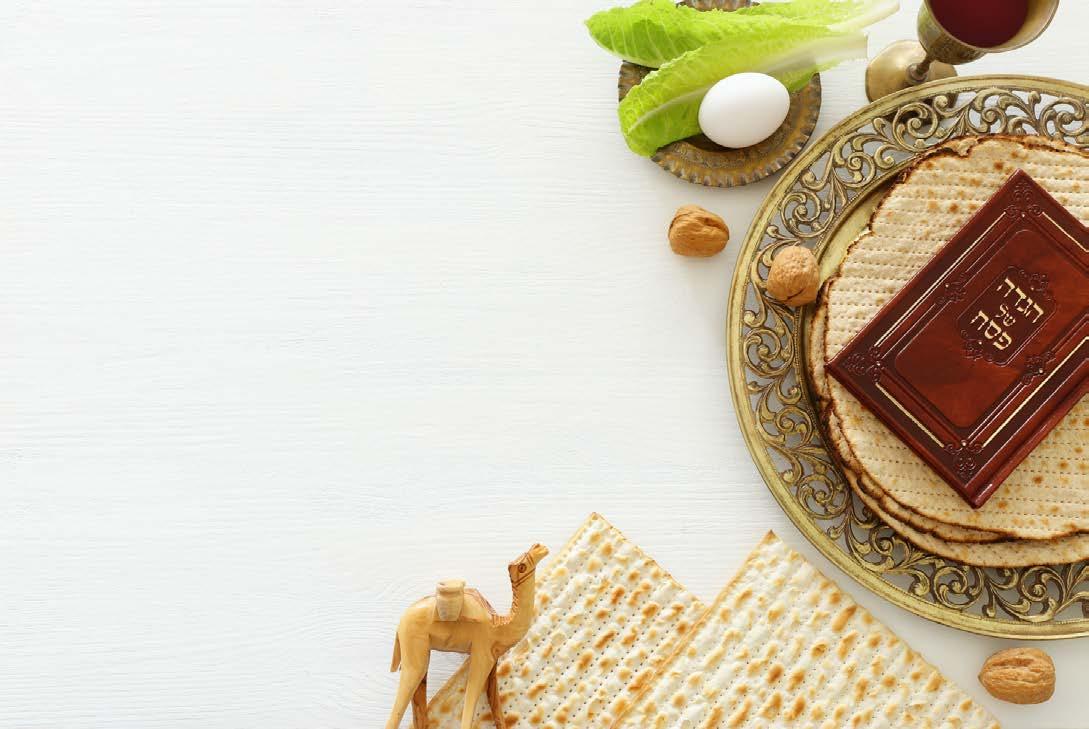
April 29.......8th Eve of Passover..............1
BO-RUH A-TOH ADO-NOI E-LO-HEI-NU MELECH HO-OLOM A-SHER KI-DE-SHA-NU BEMITZ-VO-TOV VI-TZI-VO-NU LE-HAD-LIK NER
SHEL YOM-TOV
BO-RUH A-TOH ADO-NOI E-LO-HEI-NU MELECH HO-OLOM A-SHER KI-DE-SHA-NU BEMITZ-VO-TOV VI-TZI-VO-NU LE-HAD-LIK NER
SHEL SHABBAT
BO-RUCH A-TOH ADO-NOI E-LO-HEI-NU MELECH HO-OLOM SHE-HEH-CHE-YOH-NU VIKIYE-MONU VE-HE GE-O-NU LEZ-MAN HA-ZEH
Special instructions for holidays (but not Shabbat). On holidays it is forbidden to create a new fire by striking a match, lighter, etc. However, it is permissible to use a flame already burning continuously since before the inception of the holiday, such as a pilot light, gas or candle flame.
Courtesy of Chabad House – Lubavitch 360 Hope St. • Providence, RI 02906
401-273-7238
Please do not destroy or deface this card.
Asuperhero who saves the day; the return of a beloved multi-generational family of Jewish bears; a budding young nonbinary scientist who’s an heir to Frankenstein and a folk-style Ethiopian tale are among the stars of the new Passover children’s books published in 2024.
THE TITLES COME from new entrants to the Jewish children’s literary scene as well as from prominent, award-winning writers. They include picture books, young adult novels and two compendiums of timeless stories tied to the Passover holiday, which this year begins the evening of April 22.
Here’s your roundup of new children’s Passover books for 2024.
“Matzah Ball Chase”
Rachelle Burk; illustrated by Brittany Lakin
Apples & Honey Press; ages 3-6
In this rhyming Passover story, a matzah ball made by a young Israeli girl’s grandmother flies out of her bowl of soup and bounces out of the house. The ball bounces into Jerusalem’s Old City, across Israel to Tel Aviv, Masada and the Red Sea in a ticklish travelog that arrives at a time when many Jewish families are likely to be thinking about Israel.
“Where is Poppy?”
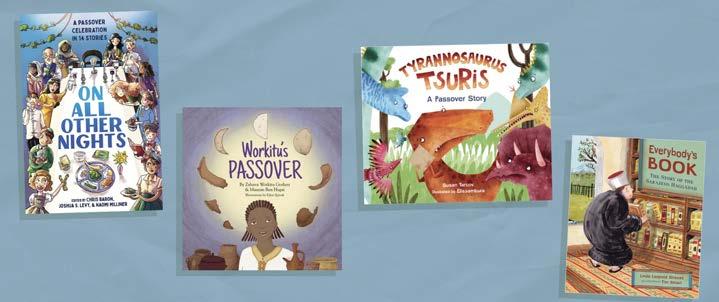
Caroline Kusin Pritchard; illustrated by Dana Wulfekotte
Simon & Schuster Books for Young Readers; ages 4-8
In this poignant story, a young girl looks forward to celebrating Passover with her extended family, but misses her grandfather, who died during the year. When her family suggests she look for signs of her beloved Poppy, she recalls all the ways he made the seder special.
“Tyrannosaurus Tsuris”
Susan Tarcov; illustrated by Elissambura
Kar-Ben Publishing; ages 3-6
Dinosaur lovers will enjoy this story of a Tyrannosaurus Rex who is overcome by tsuris (worry) about whether the guests he invited will come to his seder, or whether they’ll steer clear
CONTINUED ON PAGE 19

CONTINUED FROM PAGE 18
out of fear. The solutions-oriented story teaches a lesson about the importance of being kind to guests.
Jane Breskin Zalben
Christy Ottaviano Books; ages 4-8
More than three decades after the debut of a set of books about a charming family of Jewish bears, Beni, his sister Sara and all their cousins are back with children of their own, in Jane Breskin Zalben’s compilation of gloriously illustrated stories, songs, craft activities and recipes that is sure to delight a new generation of kids. A 20-page spread devoted to Passover opens with “Passover Ping Pong,” a lighthearted story that will have kids chuckling.
Eric A. Kimmel; illustrated by Charlie Fowkes
Apples & Honey Press; ages 5-9
Kids will delight as they follow the adventures of Matzah Man, in Eric Kimmel’s laugh-out-loud comic-style adventure about a Passover superhero who soars the skies in his blue cape, rescuing families across the globe who need help preparing for their seder. When his miracle matzah balls run low and he runs out of energy, along comes the Prophet Elijah to save the superhero’s holiday. Charlie Fowkes’ colorful, animated illustrations are perfectly paired with Kimmel’s lively text.
“Everybody’s Book: The Story of the Sarajevo Haggadah”
Linda Leopold Strauss; illustrated by Tim Smart
Kar-Ben Publishers; ages 4-8
This gloriously illustrated, inspiring book traces the story of the historic medieval Spanish haggadah through its remarkable journey of survival, rescued multiple times by Muslims who risked their lives to save the Jewish manuscript. Today, the treasured haggadah, housed at the National museum in Sarajevo, stands as a universal symbol of peace for people of all faiths.
“Benjy’s Messy Room”
Barbara Diamond Goldin; illustrated by Rita Tan
Apples & Honey Press; ages 4-7
If only Benjy can put away all his toys, he’ll get to lead his family’s hunt for hametz on the evening before Passover. It’s Benjy’s favorite ritual where he’ll hide small packets of breadcrumbs that his family will have to find. To Benjy’s surprise, when he gets distracted playing with
his younger sister, he discovers that turning the chore into fun is the perfect solution.
“Workitu’s Passover: A Story from Ethiopia”
Zahava Workitu Goshen and Maayan
Ben Hagai; Illustrated by Eden Spivak; translated by Jessica Bonn Green Bean Books; ages 4-8
In this touching, folk-like tale, Workitu, a young Ethiopian Jewish girl, discovers that her family’s Passover ritual of smashing their hand-made clay dishes, including her favorite cup, is a meaningful tradition of transforming the old into something new. Eden Spivak’s illustrations depict the warmth of rural village life.
“Afikoman, Where’d You Go? A Passover Hide-andSeek Adventure”
Rebecca Gardyn Levington; illustrated by Noa Kelner Rocky Pond Books/Penguin Random House; ages 4-8
In Rebecca Gardyn Levington’s rhyming adventure, all the spunky cousins search the house for the afikoman, a beloved seder ritual where kids are challenged to find the hidden piece of matzah. Readers are in for fun searching for the clever cartoonish afikoman that slips here and there in Noa Kelner’s lively illustrations.
“Frankenstein’s Matzah: A Passover Parody”
K. Marcus; illustrated by Sam Loman Intergalactic Afikoman; ages 5-9
In this zany Passover caper, Vee Frankenstein, an inventive non-binary Jewish kid, is determined to win the science fair by bringing a piece of matzah to life. This witty story encourages kids to ask questions and amplifies the Jewish value of welcoming guests, both central themes of the seder. Sam Loman’s animated, colorful cartoon-like artwork jumps off the page.
“On All Other Nights: A Passover Celebration in 14 Stories”
Edited by Chris Baron, Joshua S. Levy and Naomi Milliner Amulet Books/Abrams;ages 8-12 and up
A gefilte fish tale of woe; a timetravel adventure and a cartoon about the longest-ever seder that its author suggests may be true are among the standout reads in this page-turning illustrated anthology of 14 stories, each inspired by one of the steps of the seder. An all-star cast of bestselling authors, including the editors, Adam Gidwitz and Mari Lowe and others, offer short, Passover-themed works of fiction and non-fiction that will engage teens and adults alike.
BY SARAH GREENLEAFWhile the larger publishing houses are putting out great Passover books, there are quality titles from smaller publishers as well. Kalaniot Books specializes in children’s books that capture the diversity of Jewish culture and history. Check out these Passover picks for tales of inclusion and belonging.
“AN INVITATION TO PASSOVER” by Rabbi Kerry Olitzky and Rabbi Deborah Bodin Cohen (Kalaniot Books 2023) with illustrations by Mariia Kolker is an incredibly charming picture book about the power of friendship to build cultural connections. Hannah’s extended family isn’t coming to Passover this year, so she invites her friends instead. Sammy brings a kite to celebrate her Indian family’s tradition of flying kites to celebrate spring. Ha-Joon brings kimchi to eat for the bitter vegetable portion of the seder, and even makes sure to keep it kosher. Monique brings song sheets for “Go Down, Moses” from her church and to remember her grandmother who sang the song while marching for equal rights. Rina’s family brings homemade matzah to remember her mother’s upbringing in Moscow where celebrating Passover was forbidden, and they had to make it in secret.
This diverse group of friends gather to help Hannah and her family celebrate Passover each bringing a piece of their own heritage to create a layered and loving celebration. The book is aimed at ages 4-8. Travel back in time with “A PERSIAN PASSOVER” by Etan Basseri (Kalaniot Books 2022) to 1950s Iran where brother and sister Ezra and Roza are in charge of the matzah for the first time. Each family brings its flour to the community matzah oven and takes home its own matzah. Ezra runs too fast on the way home and drops the family’s matzah in a puddle! While the siblings rush through the market asking if anyone has extra matzah, they receive all sorts of other Passover treats, but no matzah. It will be their neighbor, who is alone this Passover, who saves the day, and she’ll make it even better as their honored guest. The hardcover book is for all ages.
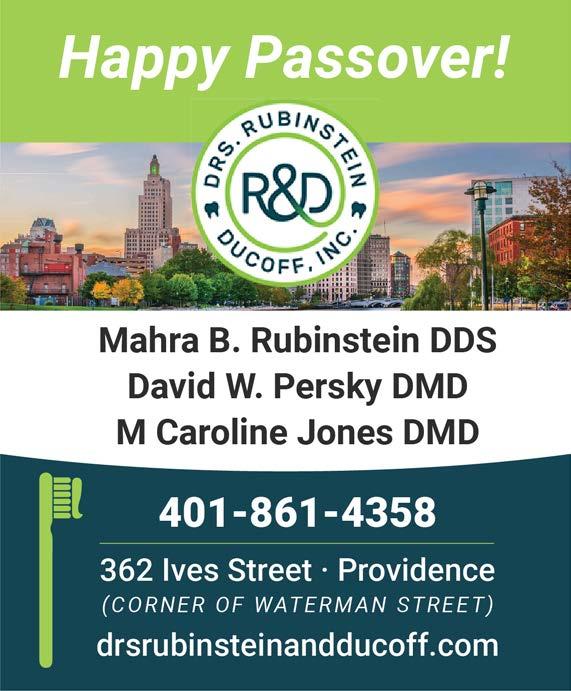
My longstanding interest in religious traditions, particularly those involving food and customs, led to a captivating experience at around this time last year: my first Passover seder. While I possessed some familiarity with Judaism, gleaned from books and academic sources, I soon discovered that the seder would be a true learning experience.
AFTER BEING WELCOMED and seated, I received a haggadah, a text that I learned would guide our shared reading and the ceremonial use of wine. This signaled a unique encounter, far exceeding the holiday celebrations of my mostly secular upbringing.
Throughout the seder, the significance of Passover
for those present became readily apparent. It highlighted the contrasting nature of my own faith, rooted in individual morals and a general sense of benevolence.
The rituals and traditions, coupled with a palpable sense of connection to the liberation story and their ancestors’ escape from Egypt, fostered a
sense of warmth and a deeper understanding of Passover’s centrality to the Jewish faith. The haggadah itself unfolded like a narrative, seamlessly blending practice with traditions. Notably, it seemed designed to welcome newcomers and facilitate their comprehension of the story and its observance.
Through this shared narrative, I gained insight into the symbolism of key rituals: the hand-washing ceremony, the consumption of the four cups of wine, the significance of matzah, and more.
‘Every facet of the seder pulsed with meaning.’
Since an exploration of culture and faith often intersects with food, the menu further piqued my interest. While the matzah ball soup and matzah pop -
over were intriguing, the haroset captivated me, not only for its sweet taste but also for its symbolic representation of the mortar used by the Israelites when they were slaves in Egypt. Every facet of the seder pulsed with meaning. Observing with the assembled group offered a profound glimpse into Jewish traditions, and I appreciated the sincere effort to provide me with a meaningful experience. Though not the youngest participant, I was entrusted with the honor of recit ing the Four Questions – a significant role in the

ritual that underscores the generations-long tradition of questioning and exploration.
Even though I am not Jewish, I was welcomed to the seder with open arms. The inclusion and education I received throughout the evening fostered a sense of belonging and immersion in the rituals. And as the other guests shared their personal seder stories from years past, any sense I had of being an outsider melted away.
My first Passover seder left me eager to participate in other holidays and further enrich my understanding of the Jewish faith.
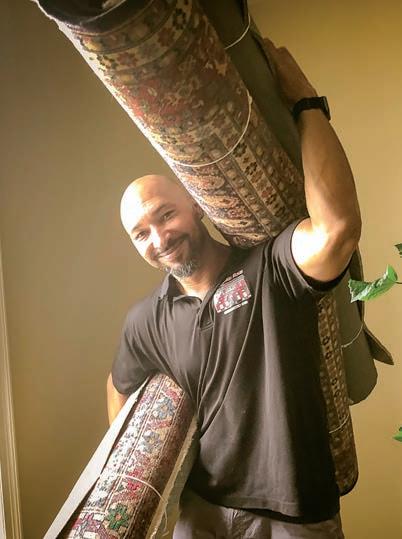



CONTINUED FROM PAGE 12
I did not know if these two Jewish activists have ever met, but Alisa generously assumed that they had. Molly had explained to me on several occasions that UJA-Federation’s volunteers and staff work well together because of their abiding, mutual respect.
On my way out of the Marriott’s lounge, a fellow called out my first name, but I did not immediately recognize Vince Mor, a distinguished professor of health services at Brown. My son, Michael, is a year older than his son, Max, and Vince and I had become friends more than two decades ago, when we served as leaders of Cub Scout Pack 88. Sponsored by the Central Congregational Church, this was the East Side’s only active pack, which welcomed more than a few Jewish dads and lads.
Vince and I had countless fun stories to share. Essentially, I loved serving as a pack leader. Indeed, I stayed a few years longer than Michael, who explained that, rather than “crossing the bridge to [Boy] Scouts,” he had decided to “cross the bridge to air.”
Max Mor followed in Michael’s footsteps, which may have been a relief for his dad. Vince explained that dealing with a band of hyperactive boys had always been the most difficult part of his week.
Fortunately, I later recognized Vince’s wife, Margaret, and we recalled that our four kids had overlapped at the former Alperin Schechter Day School. Discipline may
also have been a problem there, but there was a simpler remedy – parents could always be reprimanded!
MY LAST SHIVA visit occurred by telephone, when I was able to speak with Arthur’s eldest cousin, Adele Espo, now 99, who resides in Palm Beach, Florida. The only other surviving cousin, among a group of 10, is Carol Trow, now 81, who also lives in Florida.
I met Adele when I interviewed her mother, Eve Goldberg. In 1948, the year I was born, Adele had become the Moses Brown School’s first Jewish teacher.
Adele and I last saw each other three years ago, on her most recent visit home to Providence. While in town, she hosted a reunion luncheon for three of her student teachers (all men, twice her height), which I was also fortunate to attend. Adele’s mind seems as sharp as ever, and she exercises daily. Her three children took away her car keys, however.
Adele is proud that she will rest in Woonsocket’s Jewish cemetery, between her late husband, Harlan, and Arthur. Meanwhile, she looks forward to September, when she will celebrate her centenary with family and close friends in Florida, including her 10-year-old great-granddaughter!
Thank you, Arthur, for bringing old and good friends together once again.
GEORGE M. GOODWIN , of Providence, is the editor of Rhode Island Jewish Historical Notes.
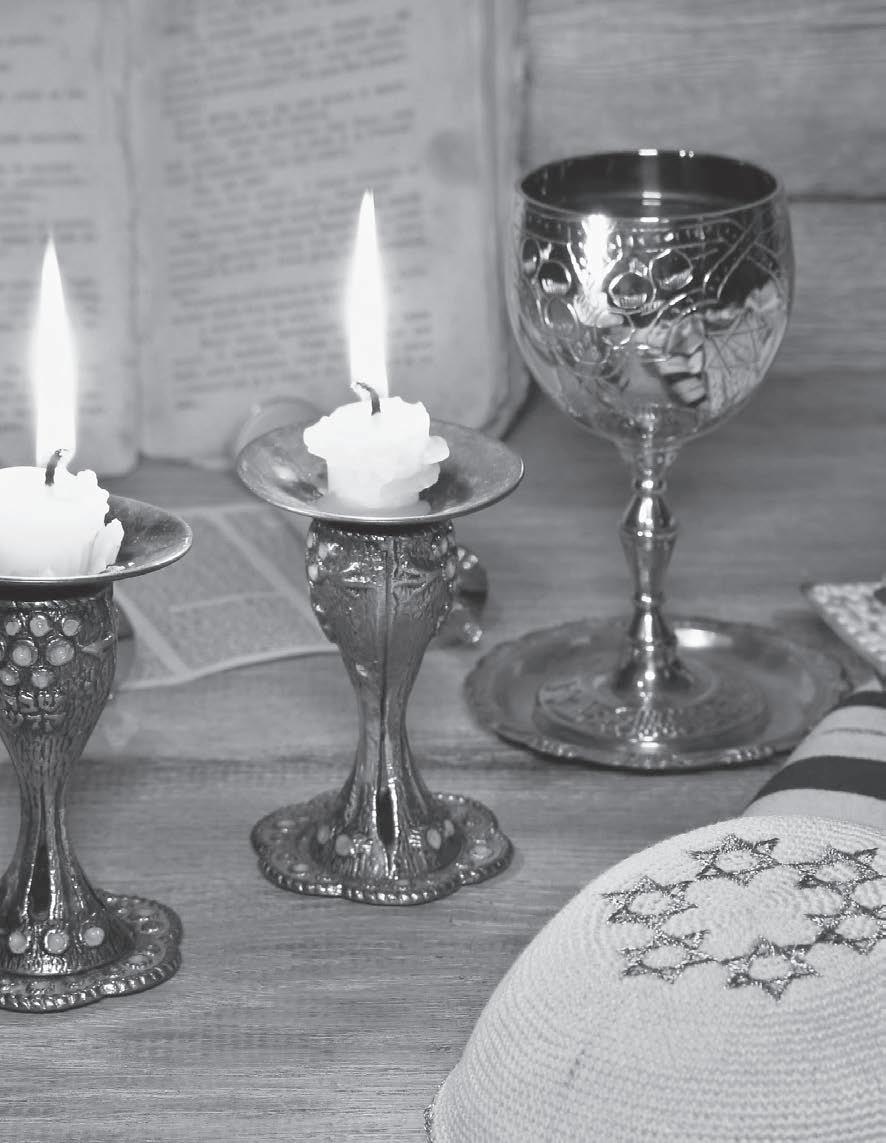

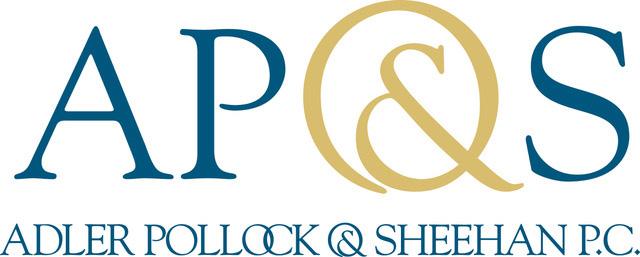

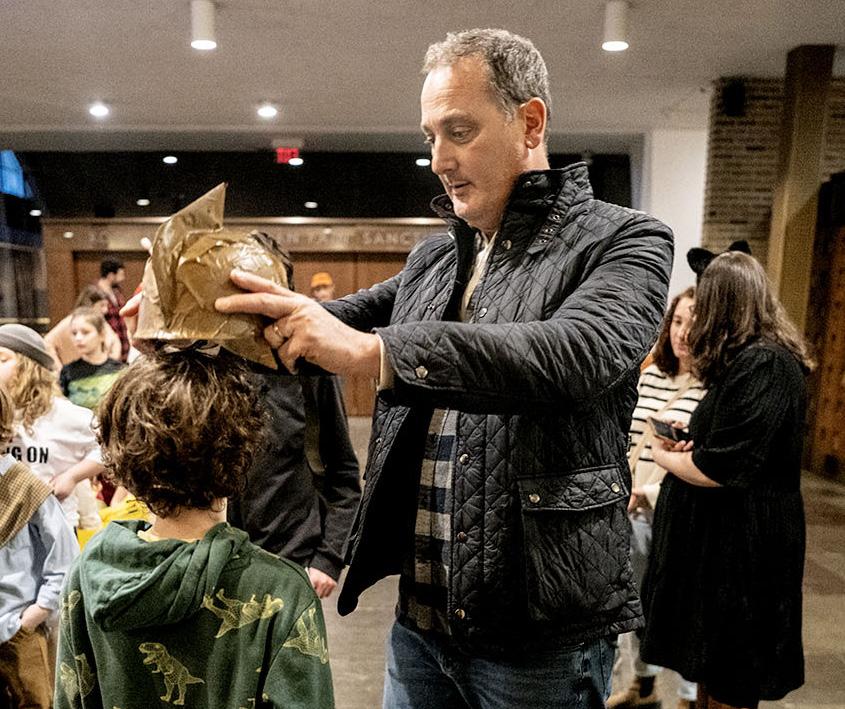
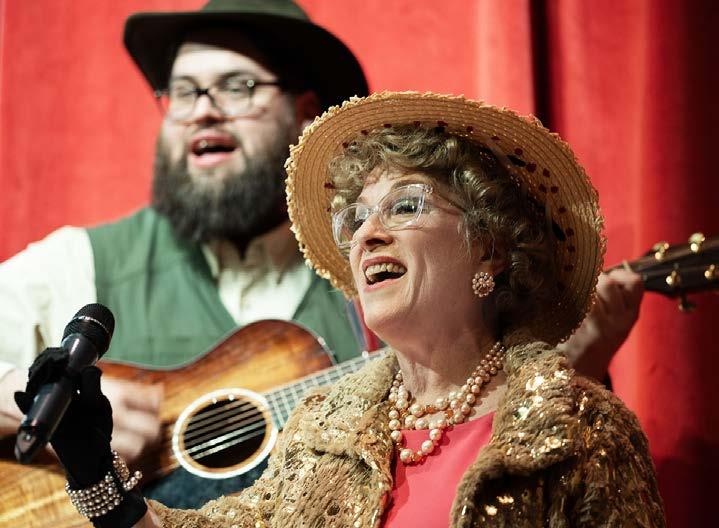
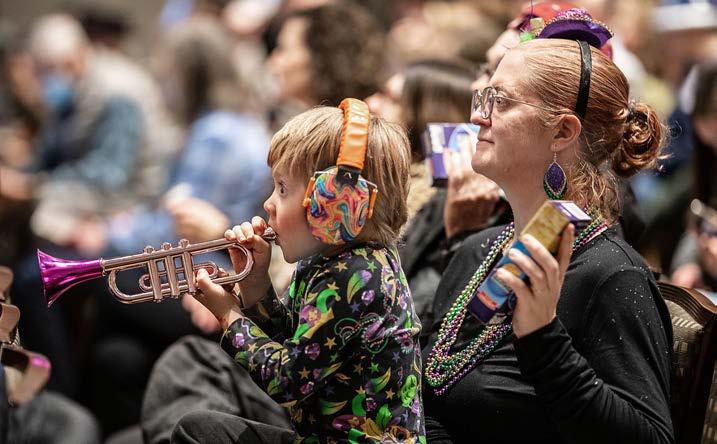

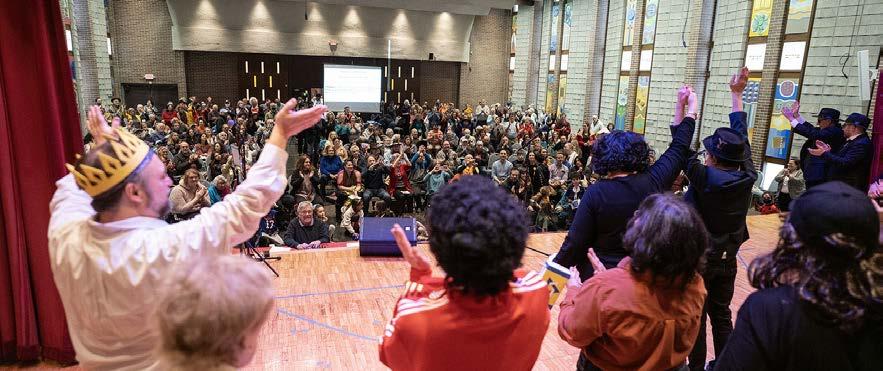
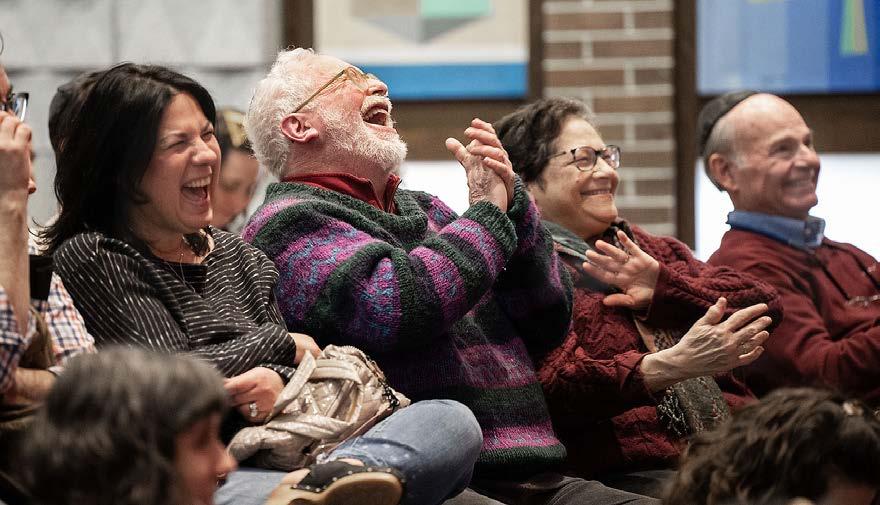

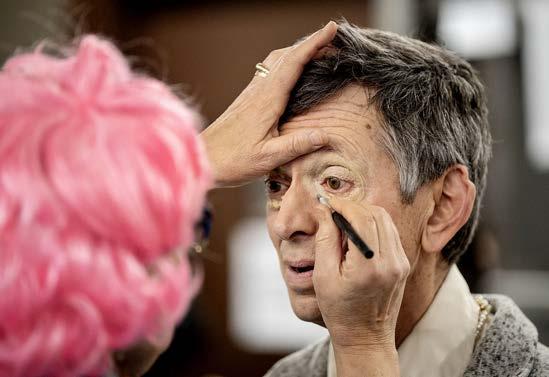
TO READ Nina Tannenwald’s piece “ ‘Israelism’ explores the disillusionment of American Jews,” [March 2024] is to suffer the horror of art being used to debase the soul. She intersperses her recital of the documentary film “Israelism,” with her own emphatic agreement with the points made by the film. The Israel Defense Forces are brutal to the Palestinians in the West Bank, more broadly the two young Jewish directors of the film state they were betrayed by the Jewish community who served them up a “Disneyfied version of Israel” that is far from reality.
My experience in Israel, decades ago, was totally opposite this false artistic version. My fellow students at the Baal Teshuvah Yeshiva in Jerusalem, were enthralled with our Torah study in the Biblical homeland of our people. One of my classmates was an American who had joined the IDF and was a tank commander in the IDF. He showed me his government-issued apartment in the Israeli town of Ofakim.
I met Palestinians. They were invariably angry and hostile. They are taught that Israel is their land. The Land of Israel, Eretz Yisrael, is holy Jewish land. That is what the Jewish directors of “Israelism” simply don’t understand. They don’t study Torah with the Loshon Kodesh – the holy language of Hebrew.
Young men and women from all over the world come to Israel, join the IDF, and have very satisfying experiences. These very few Jews such as Jewish Voice for Peace, If not Now and others like them, represent a miniscule minority.
Israel and the Diaspora are organic. We can reach an accommodation with the Palestinians, while still keeping the holy Land of Israel beating in our hearts.
Moses Mordecai Twersky Providece, RIREADING AND REREADING the cover story in the March 17 issue of the New York Times Magazine has made me angry and made me sad.
Nikole Hannah-Jones, a winner of the 2020 Pulitzer Prize and creator of the 1619 Project, is the author of the article, “Whitewash: The 50-year campaign to undo the progress of the civil rights movement in the name of ‘colorblindness.’ ”
The headline on the article says it all: During the past 50 years or so, some of our nation’s most reactionary forces have twisted the notion of “colorblindness” into a weapon to be used against those very same progressive forces that gave birth to the conviction that justice demands that our nation’s laws be colorblind.
As Hannah-Jones puts it, “Beginning in the 1970’s, the Supreme Court began to vacillate on remedies for descendants of slavery. And for the last 30 years, the court has almost exclusively ruled in favor of white people in so-called reverse-discrimination cases while severely narrowing the possibility for racial redress for Black Americans. Often, in these decisions, the court has used colorblindness as a rationale that dismisses both the particular history of racial disadvantage and its continuing disparities.”
The June 28, 1978, Supreme Court decision in Regents of the University of California v. Bakke marks the turning point in the use/abuse of “colorblindness” as an argument in affirmative-action cases.
Bakke’s. This policy, Bakke argued, was a clear violation of the Fourteenth Amendment’s guarantee of “equal protection of the laws.”
Ultimately, the court found in favor of Bakke, allowing him to remain at the UC Davis Medical School, and also allowing for some form of affirmative action to continue – not based on the color of one’s skin, but on the “compelling interest in a racially diverse student body.”
The final 5-4 decision was a fractured one, including six overlapping opinions. Thurgood Marshall, the only Black judge on the Supreme Court at the time, wrote his own stinging dissent.

The Bakke decision touched me in a family way; the case was the only time that my father, Benson Rosenberg, and I, both lifelong Democrats, engaged in a major – though polite – political disagreement. My father was appalled by the very notion of affirmative action; to him, it was a prescription for quotas over merit.
Benson was the youngest of five children born to Jewish parents who had fled the rampant antisemitism and poverty in Lithuania as the 19th century flowed into the early 20th. His three
‘During the past 50 years or so, some of our nation’s most reactionary forces have twisted the notion of “colorblindness” ’
In brief, Allan Paul Bakke, a white male, was a high-performing undergraduate student at the University of Minnesota, followed by four years of distinguished service in the U.S. Marines, and was rejected by all 12 of the medical schools to which he applied.
On Oct. 12, 1977, the Supreme Court heard arguments in Bakke’s suit against the Regents of the University of California, claiming that his failure to be admitted to the UC Davis Medical School was due to reverse-discrimination, since the school had set aside 16 of the 100 openings in the freshman class for minority students whose academic credentials were far weaker than
elder siblings were born in the “Old Country,” and the family eventually moved into the hardscrabble slums in the port of Elizabeth, New Jersey, not far from New York City. Benson’s mother, my Grandma Ida, though literate in Yiddish, never did learn to speak, read or write English.
Benson was an excellent student who worked his way through Harvard at a time when there were very few Jewish students. He graduated in 1937, and, with the passage of time, he became a self-made businessman who came to believe that people who worked hard and had the
requisite ability would succeed.
During the summer of the Bakke decision, in 1978, I turned 34. My father, 30 years my senior, continued with his mantra: “If I can do it, so can others.”
Benson, the child of poor immigrants, could not or chose not to fathom the depths of injury so many of our fellow Americans were forced to endure during 350 years of slavery, followed by the vicious discriminatory laws enacted in our Jim Crow South. But I, a child of privilege, grew up with a different perspective.
This past June 29, our Supreme Court overturned Bakke by deciding that the race-based admissions at both Harvard and the University of North Carolina were unconstitutional under the Equal Protection Clause of the Fourteenth Amendment. The decision was 6-3 at UNC and 6-2 at Harvard. (Judge Ketanji Brown Jackson recused herself because she serves on Harvard’s Board of Overseers.)
Writing for the majority, Chief Justice John Roberts argued that the Equal Protection Clause of the Fourteenth Amendment applies “without regard to any difference of race, of color, or of nationality, and thus must apply to every person.”
Writing in her separate dissent in the UNC case, Justice Jackson emphasizes the way in which “colorblindness” has come to stand for its opposite: “With let-them-eat-cake obliviousness, today, the majority pulls the ripcord and announces ‘colorblindness for all’ by legal fiat. But deeming race irrelevant in law does not make it so …. It would be deeply unfortunate if the Equal Protection Clause actually demanded this perverse, ahistorical, and counterproductive outcome.”
We read in the first chapter of Genesis that all of us are created b’tselem Elohim, in the image of God. And we read in the Fourteenth Amendment of the United States Constitution that every American is entitled to “the equal protection of the laws” – that means all of us, men and women, White and Black, Jew and Gentile – all of us!
We Americans – hopefully, at least a healthy majority – know where we need to go. But the question remains: How do we get there?
JAMES B. ROSENBERG is a rabbi emeritus at Temple Habonim, in Barrington. Contact him at rabbiemeritus@templehabonim.org.
Most Americans, and nearly 90% of American Jews, say they have seen a rise in antisemitism since Oct. 7, according to a new study.
BUT THE SURVEY also found that one in 10 respondents says Americans should be allowed to call for violence against Jews or Muslims. By contrast, 73% say such calls should be prohibited.
The survey, published Tuesday by the Pew Research Center, comes following widespread reports of rising antisemitism in the United States since the outbreak of the Israel-Hamas war on Oct. 7. It found that increasing shares of Americans, and American Jews, believe there is a high level of antisemitism and Islamophobia in the United States.
But along with the minority of respondents who say calls for antisemitic or anti-Muslim violence should be allowed, the survey showed that most Americans say advocacy for the end of a Jewish state or the prevention of a Palestinian one should also be permitted. Adults under 50 were slightly more likely than older Americans to say that calls for violence against either religious group should be allowed.
“Many Americans particularly sense that discrimination against Muslims and Jews has risen since the start of the Israel-Hamas war,” reads an introduction to the survey on Pew’s website. “The vast majority of U.S. Muslims and Jews themselves agree.”
The text adds, “It finds that Americans are broadly comfortable with speech both for and against Israeli and Palestinian statehood. But most U.S. adults are not OK with calls for violence against Jews or Muslims.”
The survey, taken in February, polled more than 12,600 people and had an overall margin of error of 1.5%. The margins of error for the Jewish and Muslim segments were 3.3% and 8.4%, respectively.
It comes following a Pew survey showing most Jewish Americans support Israel’s war against Hamas, as well as how it is being fought. Americans overall are mostly supportive of Israel’s reasons for going to war and are split on Israel’s military conduct.
The survey showed that 67% of Muslims and 72% of Jews perceive “a lot” of discrimination against their own respective groups. But only 17% of Muslims reported seeing a lot of discrimination against Jews, the lowest number of any religious group polled. Among Americans overall, 40% say there is a lot of discrimination against Jews, double the figure from a 2021 poll.
PROFESSOR Nina Tannenwald consistently finds ways to criticize Israel. As soon as I see her name in the byline [March 2024], I know it will be a hit piece. Israel is in a dangerous neighborhood. The IDF is forced to patrol the Palestinian population in the West Bank (Judea and Samaria) because the Palestinian Authority teaches, glorifies and subsidizes terrorism. If Israel withdrew from the “occupation” as anti-Israel provocateurs love to call it, there is a high likelihood that Hamas would subjugate the Arabs living there, kill anybody who dares to resist and
Meanwhile, 57% of Jews polled say there is “a lot” of discrimination against Muslims, the highest number of any non-Muslim religious group polled. Still, that figure represents a decline over time from the 2013 survey of American Jews, in which 72% of Jews said Muslims face a lot of discrimination. In Tuesday’s survey, 44% of Americans overall said Muslims face a lot of discrimination.
Among respondents younger than 30, most said Muslims face a lot of discrimination, while only 31% said Jews face a lot of discrimination.
Overall, majorities of Americans – as well as majorities of Jews – are comfortable with speech both for and against Palestinian statehood, and for and against Israel existing as a Jewish state. Slightly more than a third of Jews said calling for the end of a Jewish state should be prohibited.
Tuesday’s survey also found that 74% of American Jews and 60% of Muslims say they have been personally offended by something they saw or read on the news or on social media about the Israel-Hamas war. Roughly a quarter of each group says they have also stopped talking to someone in person or unfollowed or blocked someone online due to something that person said about the war.
present a mortal danger to Israel. The Palestinian Authority does not have the will or capability to oppose Hamas so the work is forced on the IDF. I would hate to be a soldier having to take on the horrible task of rooting out terrorists hiding among and supported by civilians. I know that, as a typical 20+ year old, it would likely make it hard to be humane to people who may trying to kill me. It is a horrible choice Israel has. The current stalemate hardens attitudes on each side. If Israel withdraws, it may be national suicide. Mahmoud Abbas, age 88,
I AM DISMAYED by Rabbi Rosenberg’s disapproving tone [March 2024] when he speaks of Israel’s retaliation in the Israel-Hamas war. How can American Jews feel justified in “disapproving” of Israel’s actions when its sole existential purpose must be to defeat Hamas? There can be no doubt that most Israelis mourn the tragic deaths of so many Palestinian women and children, just as God mourned the Egyptians, also His children, drowning when He parted the Red Sea. But responsible journalists point out that Hamas uses women and children as human shields, and that Israel has done everything possible to help innocent Palestinians get out of the way of battle. No one should ever forget that on Oct. 7, Hamas made no effort to protect the innocent. To the contrary, it targeted the innocent, raped, tortured and killed the innocent, violating universally recognized rules of war. Nor should anyone forget that adding to these barbaric acts, it grabbed more innocent Jews, all civilians, and dragged them back to Gaza where they would be held as hostages.
Rabbi Rosenberg says that now many American Jews are “rethinking” their relationship to Israel. Most Jews that I know stand firmly behind Israel, hoping the IDF can achieve their aims. Yes, there is indeed a big difference between Israeli and Diaspora Jews. We here in America don’t have to worry every day whether our country will survive, whether we or loved ones will get blown up by a terrorist bomb, or whether our children in the IDF will come home in one piece. No, we are not called on to merge identities. Our role here as Jews is not to disapprove but to pray that Israel can do what it needs to do, in order to win this terrible but necessary war and ensure that it not happen again.
Emily Anthony Jamestown, RIwas elected in 2005 to a 4-year term and has blocked any further elections. Each time Israel has ceded territory to an unstable Arab entity, the power vacuum has been filled by radicals with “Death to Israel” mindsets, and weapons supplied by Iran and others determined to destroy Israel.
Having never seen Tannenwald write anything critical of Palestinian society or leadership, I wonder if she is able to depart from her “Disneyland” characterization of Arabs as innocent victims and suggest real, measurable steps the
Palestinian population and leadership could make to allow Israel to withdraw and have peace. It is this consistent focus on the oppressor/ oppressed narrative that has made the Ivy League colleges so hostile to Jews that it has become a national disgrace. I hope Tannenwald is more objective on campus and is not engaging in classroom indoctrination.
Farrel I. Klein Providence, RI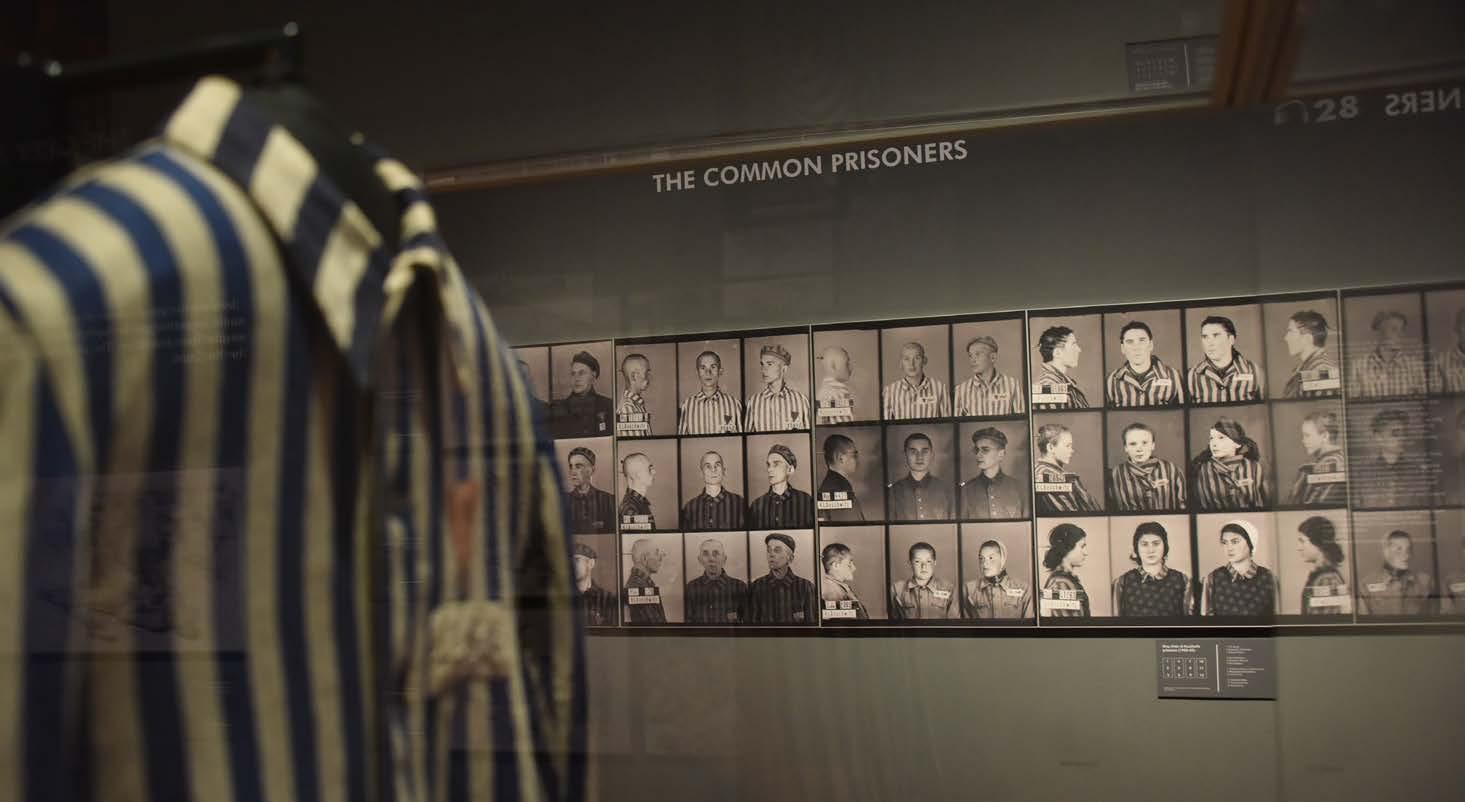 BY BOB ABELMAN
BY BOB ABELMAN
BOSTON – “Fashioned by Sargent,” the exhibition that closed this past January at Boston’s Museum of Fine Arts, featured 50 canvases by renowned late-19th century portraitist John Singer Sargent depicting wealthy clients in lavish clothing.
IN STAND-ALONE vitrines near the oil-on-canvas masterworks were over a dozen of the period garments and assorted accessories seen in the paintings.
The 1887 portrait of Mrs. Charles E. Inches and the red velvet dress she wore in it were just a few feet from each other. Before turning the corner to encounter Aline de Rothschild’s grand 1907 portrait “Lady Sassoon,” her silk taffeta and satin opera cloak was on
display. Further down the exhibition’s winding pathway was the black top hat worn by Lord Ribblesdale in his full-length portrait, completed in 1902.
By showing paintings and apparel side-by-side, the exhibitors blurred the line between art and artifact. The encased three-dimensional objects shed their utilitarian function as attire or appurtenance and gained greater value as objets d’art and items of historical, eth-
nological significance. And onlookers gained a more personal connection with a bygone era and the two-dimensional subjects who appeared in these paintings.
This same kind of transcendence happens when walking through the 10,000-squarefoot “Auschwitz. Not Long Ago. Not Far Away” traveling exhibition, now on display at The Castle at Park Plaza, in Boston. When it opened, in Madrid’s Arte Canal Exhibition Centre in 2017, it drew more than 600,000 visitors.
the Auschwitz concentration camp, in Oświę cim, Poland, and over 20 other museums – including Yad Vashem, in Israel, and the United States Holocaust Memorial
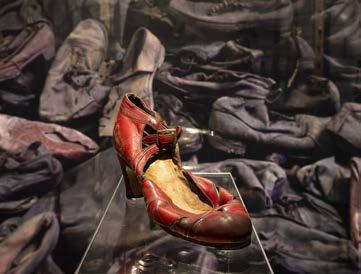
Over 700 original artifacts and objects housed in the Auschwitz-Birkenau Memorial, located on the site of
Museum, in Washington, D.C. – have been brought together here. Many have never been shown to the
public, having been recently excavated from the hallowed site during routine maintenance and repairs.
The exhibition begins with a display of a single red dress shoe belonging to an unidentified female deportee to Auschwitz, which immediately gets your attention and causes a quick, involuntary inhale that takes seemingly forever to release. Expecting more of the same as you round the corner, the exhibition anticlimactically traces the development of European antisemitism and Nazi ideology, and tells of the transformation of Oświę cim from an ordinary Polish town to the most significant Nazi site of the Holocaust.
“We wanted to immediately offer context for what awaits visitors a bit further into the exhibition,”
In February, I took a month-long trip to Israel. For two weeks, my friend Simonne and I walked all over Jerusalem and did some sightseeing. After she left, I spent two weeks meeting people.
Throughout it all, the war was ever present, from pictures of the hostages to empty national parks and the remarks of the people I met. Many more people carried guns than on previous visits.
A SLIGHT CHILL did not lessen the pleasure of being in Jerusalem. Except when we were near the Kotel, the old city was quiet. There were no tourists; most of the shops that served them were closed. But at the busy Machane Yehuda Market on Friday morning, people lined up for the best donuts and coffee and to be seen.
In Israel under normal conditions, one is unlikely to be alone. Now the empty national parks tell a different story. At Zippori National Park, an ancient city north of Nazareth, most of the few visitors were Arab Israelis. A couple who gave us directions said, “We are visiting the spot where our family village had been before Israel became independent.”
Beit She’an National Park encompasses a large Roman Byzantine city. We walked on the Cardo, which had been lined with shops. The stage at the 7,000seat ancient theater was ready. We were alone in the audience.
years ago. The rocks are green, black and red.
A few people joined us at Masada, where the large cafeteria was closed. We took the cable car up, planning to walk down. Then bolts of lightning lit up the sky, and there was a risk of a flash flood. When the rain started, we huddled in buildings near the cable car. As we prepared to walk down the snake path, we were stopped at the gate. It was too slippery.
I devoted the last two

South of Beer Sheva, we were alone at Avdat, an ancient Nabatean, Roman and Byzantine city. Nearby Ein Avdat is a waterfall in a narrow canyon, where we enjoyed being among a crowd of students. For once, we were not alone.
As we began our descent to the floor of the Negev’s Makhtesh Ramon Crater, a Nubian ibex strutted before us. The 40-milelong, 1,640-feet-deep crater was created by erosion. In the crater, an abandoned surface mine has been converted to a park, with the help of the Quarry Rehabilitation Fund. The formations at the bottom date to the Jurassic Era, 200 million
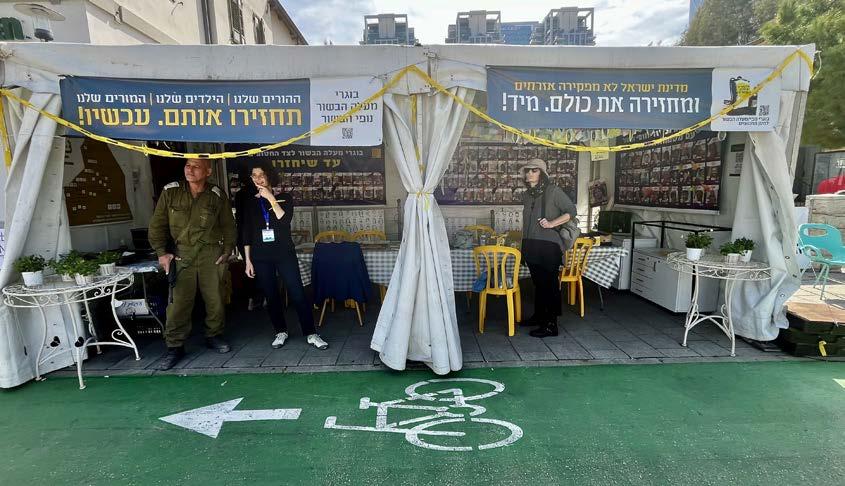
that was devoted to the hostages. When he heard about Hamas’ Oct. 7 attack, his first thought was, “Where was the Israeli army?” He realized that Israel had experienced a major defeat. Visiting the tent was too much to bear.
At my Beer Sheva apartment, near the Soroka Medical Center, my host asked, “Do you hear the helicopter? It means bad news. An Israeli soldier has been killed or severely wounded. We usually find out in a couple of hours.” Soroka is
the closest major hospital to Gaza.
A friend I’ll call Leah, whose father was a Holocaust survivor from Dokshitsy, said the government was not prepared for Oct.
CONTINUED ON PAGE 29
The Rhode Island Jewish Historical Association invites you to learn about the Hahn Memorial in the Roger Williams National Memorial.
weeks of my trip to getting together with people. I am very interested in the Jewish community in Dokshitsy, Belarus. My father was born near there, as were many immigrants to my hometown, Newport.
Prof. Michelle Slone, whose mother was born in Dokshitsy, is a psychologist and trauma specialist. She has treated some of the most difficult cases, including volunteers who recovered bodies after the massacre on Oct. 7.
In Tel Aviv, I walked with Lew, also a Dokshitsy descendant, who recently made aliyah. Lew was reluctant to enter a tent
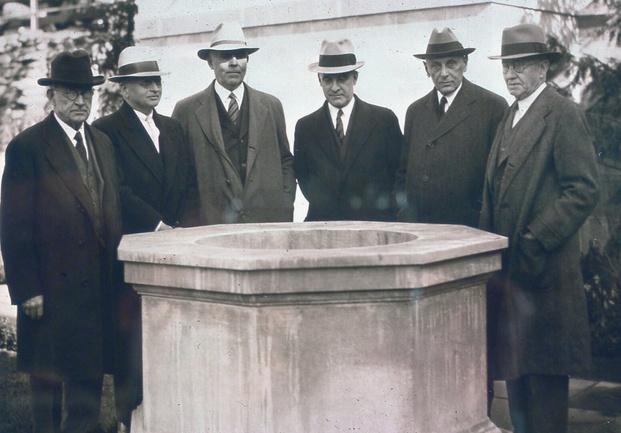
Judge Jerome Hahn, the second Jewish lawyer in Rhode Island, generously gifted the well to Providence in 1931. National Park Ranger Andrew Schnetzer will deliver the free lecture.
Light refreshments will be served.
To register, go to rijha.org/events or use the QR code below.
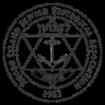
Rhode Island Jewish Historical Association info@rijha.org | 401-331-1360 | rijha.org 401 Elmgrove Ave., Providence, RI 02906
Sunday, May 19 11 a.m.
Dwares JCC 401 Elmgrove Ave. Providence, RI
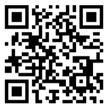
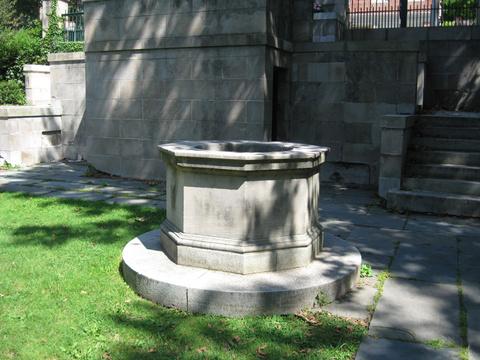
CONTINUED FROM PAGE 26
said Pawel Sawicki, deputy spokesperson of the Memorial at the Auschwitz-Birkenau State Museum and project coordinator of “Auschwitz. Not Long Ago. Not Far Away,” when asked about the exhibition’s layout and design. “Before visitors entered the authentic world of Auschwitz, we wanted to provide them with insight and information.”
This seems a wise choice, for what awaits us as we move forward is overwhelming.
There’s no shortage of enlarged, historical, blackand-white photographs on the walls depicting unidentified people awaiting deportation – a sampling of the approximately 1 million Jews and tens of thousands of Polish political prisoners, Sinti, Roma, Soviet POWs, Jehovah’s Witnesses, and those the Nazis deemed homosexual, disabled, criminal, inferior or adversarial in countless other ways who met their demise at Auschwitz. These are powerful and painful images.
Also on display is the occasional closeup of an identified individual who made that
journey. There’s Settela Steinback, one of the 23,000 Roma prisoners, being transported from the Netherlands to Auschwitz in 1944, where she was murdered at the age of 9. Suddenly, the 80 years and over 4,100 miles between the images and us no longer exists.
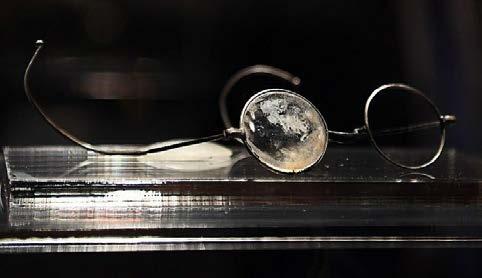
The photographs are surrounded by objects taken from the suitcases packed by these unaware deportees and stockpiled by the SS garrison members who staffed the camp system. Most of the items are without personal provenance, a testament to the chaotic and surreal circumstances that defined the capture, transport, selection and systemic dehumanization of their owners. These items are also imbued with the power to immediately transport viewers to another time and place, and help tell the story of Auschwitz and those who perished or persisted there.
But the power of these items is intensified in the instances when they are attributed to specific owners. There’s the wooden spoon issued to prisoner 30921, Stanisław Switaj, upon his arrival in April 1942, which survived his murder two months later. There’s the concentration camp uniform worn by Marian Kostuch, one of over 130,000 Polish prisoners of war who were assigned to Auschwitz.
Like the personal artifacts displayed in the “Fashioned by Sargent” exhibition, the encased three-dimensional objects shed their utilitarian function in exchange for historical, ethnological significance. And onlookers gain
a more personal connection with a bygone era and the two-dimensional images of those innocent inhabitants.
Piotr Cywi ń ski, director of the Auschwitz-Birkenau Memorial, said “the tragedy of Auschwitz told through this carefully curated exhibition forces every visitor to bear witness to this horrifying chapter of human history and build a future shaped by remembrance.”
In addition to the display of prisoners’ personal objects, the exhibition includes concrete posts that were part of the barbed wire fence at the Auschwitz II-Birkenau camp. Artifacts that depict the world of the Nazi perpetrators, including a desk and other possessions of the first and the longest-serving Auschwitz commandant, Rudolf Höss, add stirring context.
“Hatred, racism, antisemitism and intolerance are, unfortunately, concepts we still have to face nowadays,” said exhibition director Luis
Ferreiro in an earlier interview in The Times of Israel. “Therefore, it is of vital importance to remember the road that led to Auschwitz and the consequences it had.”
This is made perfectly clear in the short film on display by the exhibition’s exit, which shows the normal, naïve existence of pre-WWII families in Austria, Poland, the Netherlands, Croatia and Czechoslovakia. Quite the poignant juxtaposition to the red shoe on display at the exhibition’s entrance. And the cause of yet another quick, involuntary inhale.
BOB ABELMAN is an awardwinning theater critic who formerly wrote for the Austin Chronicle and Cleveland Jewish News. He writes occasionally for Jewish Rhode Island.
“Auschwitz. Not Long Ago. Not Far Away” runs through Sept. 2 at The Castle at Park Plaza, 130 Columbus Ave., Boston. Go to theauschwitzexhibition.com for timed-entry tickets, which are $34.95. Tickets include a complimentary audio guide.
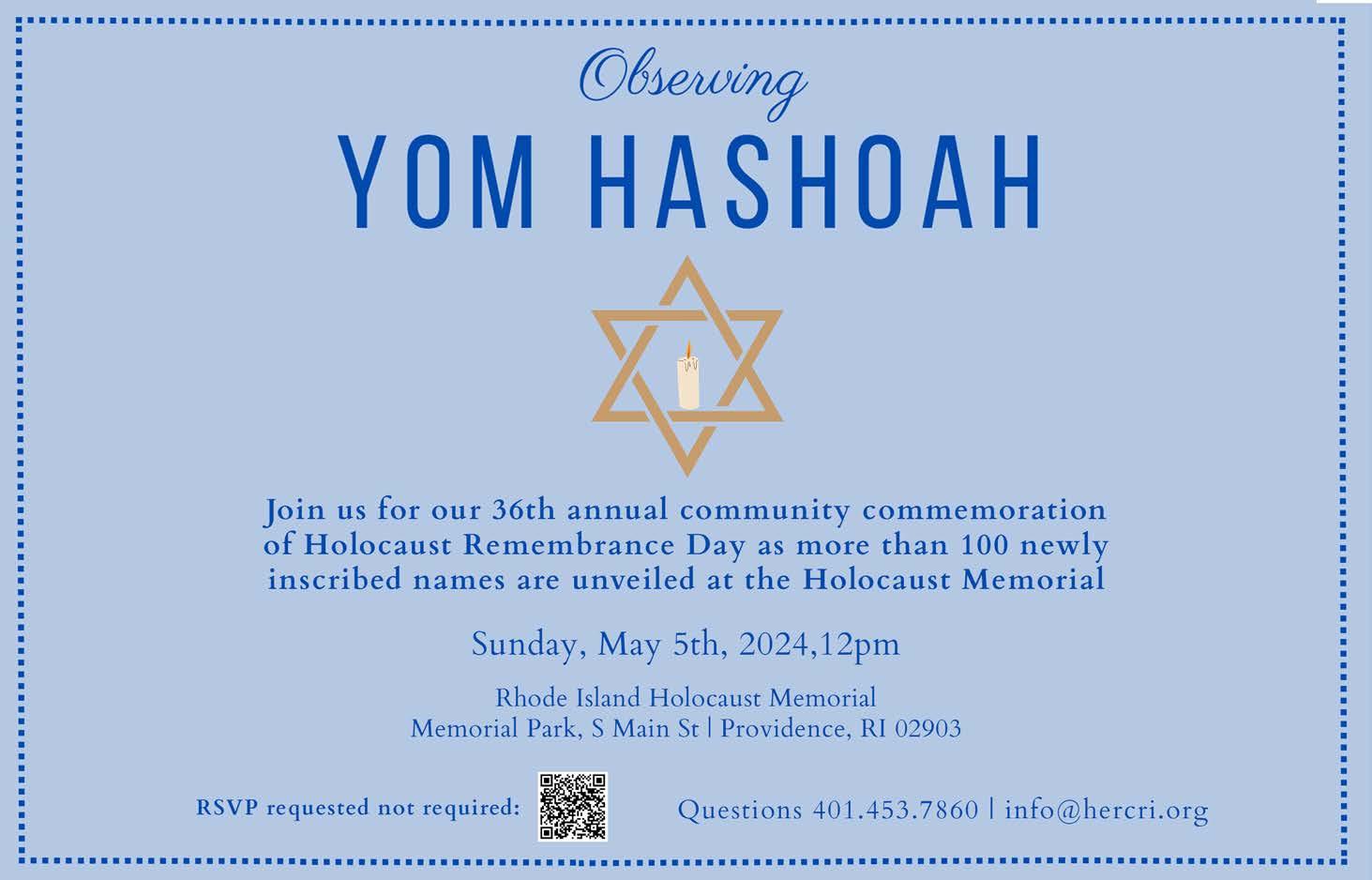

CONTINUED FROM PAGE 27
7 and volunteers stepped in. One group she was part of collected sleeping bags for soldiers. Another group arranged for volunteers, including Leah, to be transported to areas near Gaza to pick fruits and vegetables after Thai workers left the country and survivors were evacuated. She was very concerned about the number of civilian casualties in Gaza.
In Beer Sheva, I accompanied Leah to a Saturday night demonstration that was mostly about the hostages. The ongoing weekly demonstrations had started over a year ago as a protest against the Israeli government.
During the demonstration, I noticed that a Facebook friend, Galit, was online. Her grandmother was born in Dokshitsy. Soon I was in touch with her father, Shraga Krein. When I met Shraga a few days later, he apologized for meeting in a hotel. His new house needed a plumbing repair.
Shraga’s mother, aunt and uncle were partisans during World War II. A partisan group refused to accept his mother, but she managed to get into another group because her brother was already in it. For her brother to join the group, he had to undertake and survive a difficult mission. Unfortunately, he was killed during another difficult mission. Shraga told me he felt he had to step away from the Holocaust to live a full life.
In Modin, I rented a room from a physicist who asked, “Did you notice the shoddy construction in Israel?” It’s hard to miss.
In Jerusalem, new sidewalks are crumbling. I chuckled when he mentioned new apartments
needing repairs.
“When you ask about the quality of the work,” he said, “the answer is, ‘Trust me.’ ”
In Haifa, I met Zeev Frenkel, an immigrant from Russia related to Newport’s Nemtzow family. The Nemtzows also came from the Dokshitsy area. We discussed genealogy by DNA. [In Israel you cannot purchase the DNA test kits for genealogy purposes.] He said it might uncover inconvenient facts such as a birth out of wedlock. Such a child would have difficulty getting a religious marriage.
The Druze are an offshoot of Islam. This small group marries among themselves, leading to a higher chance of a genetic disease. Couples are encouraged to take a DNA test to make sure that they aren’t too closely related.
Most ultra-Orthodox groups do not actively recruit from outside the group. People marry within the group. Couples are required to have a DNA profile done before they become engaged to make sure that they aren’t closely related. This issue does not apply to Chabad Lubovitch, which actively seeks to bring in new people
A few days after our meeting, Shraga Krein called and said, “Aaron, for me it was a very emotional meeting, but now I have to draw the curtain. When you come next time, let’s meet at my home.”
AARON GINSBURG lives in Stoughton, Massachusetts, and blogs at jewishnewport. blogspot.com.
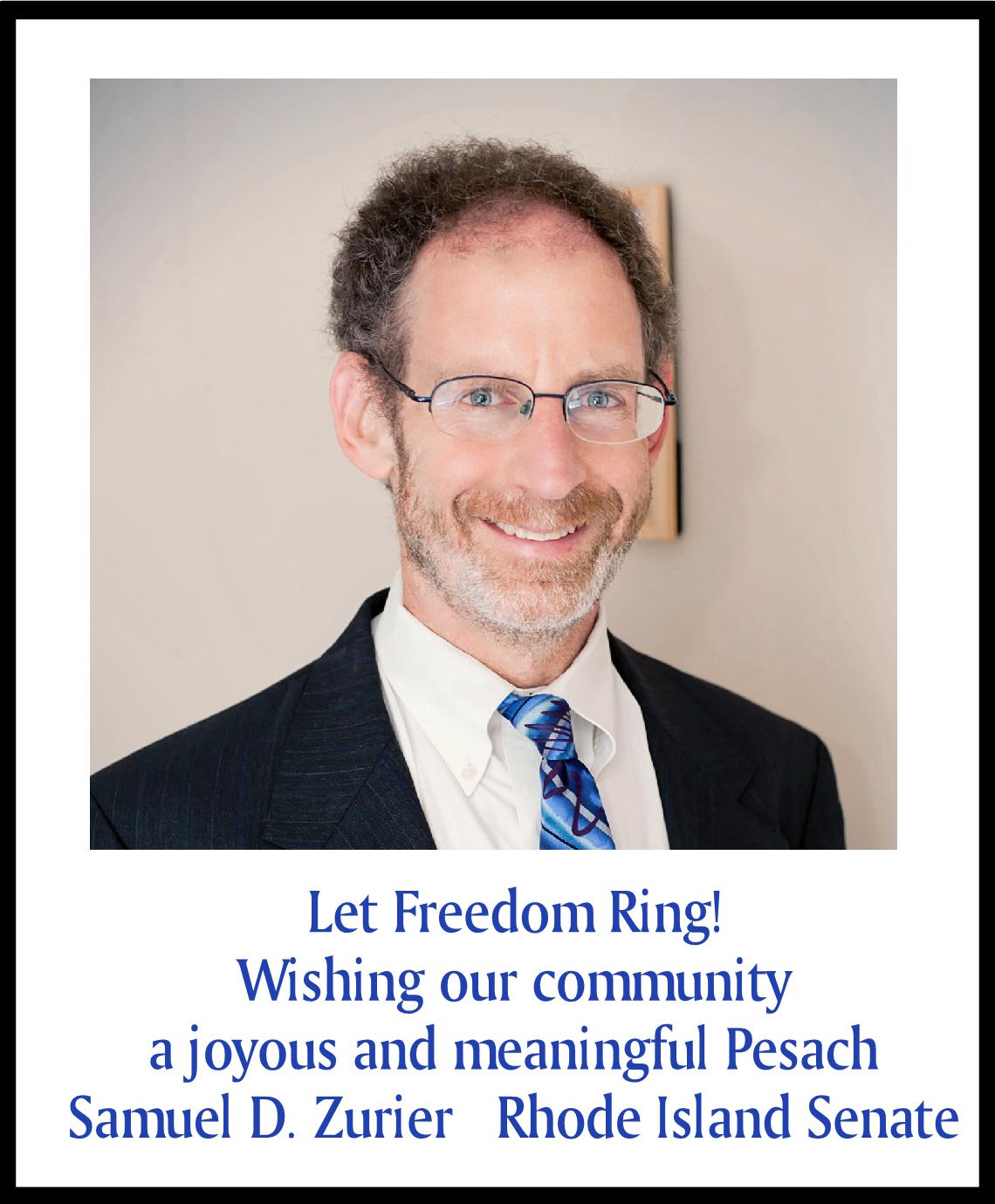
The Jewish Alliance of Greater Rhode Island stands with Israel and has opened an emergency fund to provide immediate financial assistance and relief to victims of terror and war.
100% of your donation will go toward supporting victims of terror and addressing the unprecedented levels of trauma caused by these horrific attacks.
To support the fund, visit JewishAllianceRI.org or scan the QR Code below.

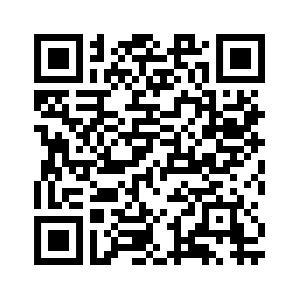

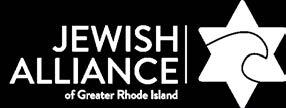
At the Jewish Alliance, we believe all people should be treated fairly and justly. If you have experienced or witnessed an incident of antisemitism or extremism, please report it. Antisemitic activity includes overt acts or expressions of anti-Jewish bigotry and hostility. Many incidents are not crimes but are still considered antisemitic and should be reported.
This initiative is meant to help track antisemitic incidents in the state of Rhode Island. Experiencing any type of antisemitism may be traumatic for you or your loved ones. If you need additional support, please contact Jewish Collaborative Services at 401.331.1244 for guidance.
www.jewishallianceri.org/report-it/
This project was supported by Grant No. 15PBJA-22-GG-01558-HATE awarded by the Bureau of Justice Assistance. The Bureau of Justice Assistance is a component of the Department of Justice's Office of Justice Programs, which also includes the Bureau of Justice Statistics, the National Institute of Justice, the Office of Juvenile Justice and Delinquency Prevention, the Office for Victims of Crime, and the SMART Office. Points of view or opinions in this document are those of the author and do not necessarily represent the official position or policies of the U.S. Department of Justice

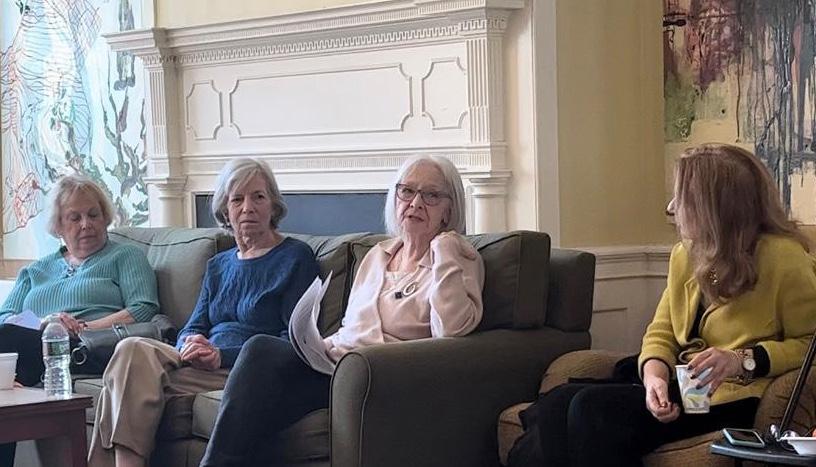
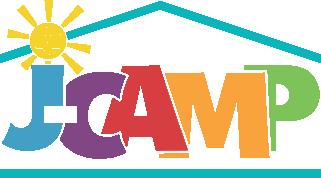
Summer J-Camp
June 24 – August 23
J-Campers | Grades: K-6
Counselors in Training (CITs) | Grades: 7-10
Summer J-Camp provides a diverse and welcoming environment for all our campers. Using an experiential learning model, campers will participate in swimming lessons, sports, the arts, science, and many more activities. The daily schedule will rotate through every activity we offer, as we strive to focus on the specific interests of each camper. We provide lunch daily and have weekly field trips and specials guests.
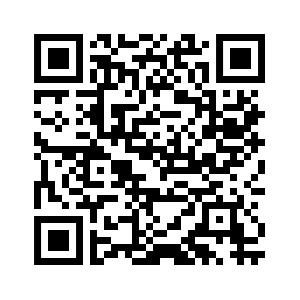
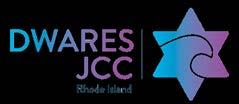 BY YARDENA KAPACH WINKLER
BY YARDENA KAPACH WINKLER
PROVIDENCE – Hadassah members and friends gathered in Brown/RISD Hillel’s cozy student lounge on March 17 to celebrate Hadassah’s 112th anniversary. Participants also learned about Shabbat Zachor (the Shabbat before Purim) and the Book of Esther, and discussed current Hadassah programs. Hadassah members recounted the historic meeting that took place 112 years ago at Temple Emanuel, in New York City, weeks before Purim. The Hebrew name of Queen Esther, Hadassah, was adopted and the first Hadassah funds were raised to send the first two nurses to the Jewish and Arab inhabitants of pre-state Israel, who were desperately in need of medical care. This was the beginning of Hadassah, The Women’s Zionist Organization of America, and the start of today’s thriving Hadassah hospitals and research centers, as well as many other world-class Israeli hospitals and medical centers.
Henrietta Szold, the founder and first president of Hadassah, led Temple Emanuel’s small Zionist study group in 1912, which later expanded to many more chapters in other U.S.
cities. Their goal was to practice a more hands-on Zionism by directly helping the pre-state Israel community.
The daughter of a distinguished rabbi, Benjamin Szold, Henrietta Szold was highly educated in Jewish studies and history, as well as in languages. She established the first American night school to help immigrants and she was the first woman to lead the Jewish Publication Society (JPS), where for many years she translated and edited books by Jewish scholars and rabbis, including Marcus Jastrow’s well-known Talmudic dictionary.
At the March 17 meeting, participants remembered those who were killed in the Israel-Hamas war, the bereaved families, the hostages and the wounded, and reflected on the lessons from Shabbat Zachor, which commands us to wipe out the Amalek, who preyed on the weak stragglers during Exodus, and the Book of Esther, with the failed genocide of the Jews.
Now, as then, we stand united to defeat evil and seek peace and welfare for all.
KATE-LYNNE LAROCHE , executive director of the Rhode Island Jewish Historical Association, has resigned effective April 5.
Laroche said she is leaving to spend more time with her young family. In a letter to members, she wrote, “I will be forever grateful for the almost seven years I’ve spent at the association. The people I’ve worked with … will always hold a special place in my heart.”
RIJHA president Harold Foster said in an email, “I know I speak for everyone when I thank Kate-Lynne for all she’s done for the associa-
tion and the community and wish her only the best.”
During her tenure, Laroche raised RIHJA’s public profile by collaborating on programs with other community organizations, opened up online access to RIJHA’s archives and spearheaded efforts to digitize the archives.
Foster said RIJHA’s Executive Committee will meet this week to discuss the opening and possibly to suggest adjustments to the schedules of the remaining staffers.

"#$%$&'$(!)*!'+$!,-%'$#+..(!./!0$123$!4$'+563!
#$%&$'"#()*#')#+)$%#*,#$%#'-"#."/01"#2"'-341#5""'$%6#78119#:;#<=>-8=?# @&"%*"9#A=)&$?"%>"9#BC#D)=#)*=#"E>$'$%6#0=)6=8/F##G)/"#8%?#"%+)(#)*=#H$1/,9 $%,0$=$%6#/)?"=8')=,9#8%?#="D=",-/"%',F#@?/$,,$)%#$,#D=""I#
,7&(8*9!:2#-3!;!8'!<=>>!"?!
Currently, Office Manager Jaime Waldon works 20 hours a week, while archivist Sam Turco works 30 hours.
THE JEWISH ALLIANCE of Greater Rhode Island is organizing a second community Solidarity Mission to Israel, for the fall.
The 22 community members who participated in the first Israel Solidarity Mission, Jan. 14-18, saw the situation there firsthand, from Hostages Square to Mount Herzl cemetery, and lent a helping hand.
As the anniversary of the Oct. 7 massacre that started the Israel-Hamas war approaches, the Alliance invites you to join the mission to show your support for the Jewish homeland by bearing witness, visiting and volunteering to aid the people in affected Israeli communities.
The unique itinerary may include, but is not limited to, travel to Tel Aviv, Jerusalem and Gaza; visiting the families of the hostages and wounded soldiers; volunteering on a farm and/or packing food for Israel’s needy; visiting the Anu Museum, in Tel Aviv; a journey to the Western Wall; an opportunity
to pay your respects for the victims at Reim Field (the site of the Supernova music festival); and shopping and dining to support struggling Israeli businesses.
The estimated cost for the all-inclusive five-to-seven-day mission package is $4,500-$5,000 and includes airfare (included in the price, but purchased individually), all hotels, some meals, all ground transportation by private bus with an English-speaking guide, all land tours, entrance fees and security.
The final cost is dependent on the number of participants, airfare costs at the time of travel and hotel costs.
If you’re interested in participating in the Solidarity Mission, please contact Dori Adler at dadler@jewishallianceri.org for more details.
DORI ADLER (dadler@ jewishallianceri.org) is the director of Jewish life and learning at the Jewish Alliance of Greater Rhode Island.
J8="K"119#5=F#78DD/8%%#
2=$"D#C%'=)?*>'$)%#8%?#L))/#0=","%'8'$)%#D)11)K$%6#K$'-#M8="%#B"N#B*?"19 O"K$,-#A8=$,#.)*=#P*$?"#
,7&(8*9!:2#-3!@A!8'!<=>>!"?!
Presented by the Sisterhood of Temple Beth-El Sunday, April 7 at 2:00 PM Sunday, April 14 at 2:00 PM
!-(#'-"#O"K,#
5)?"=8'"?#N(#B8NN$#A=",')%#Q"$/"$,"=#
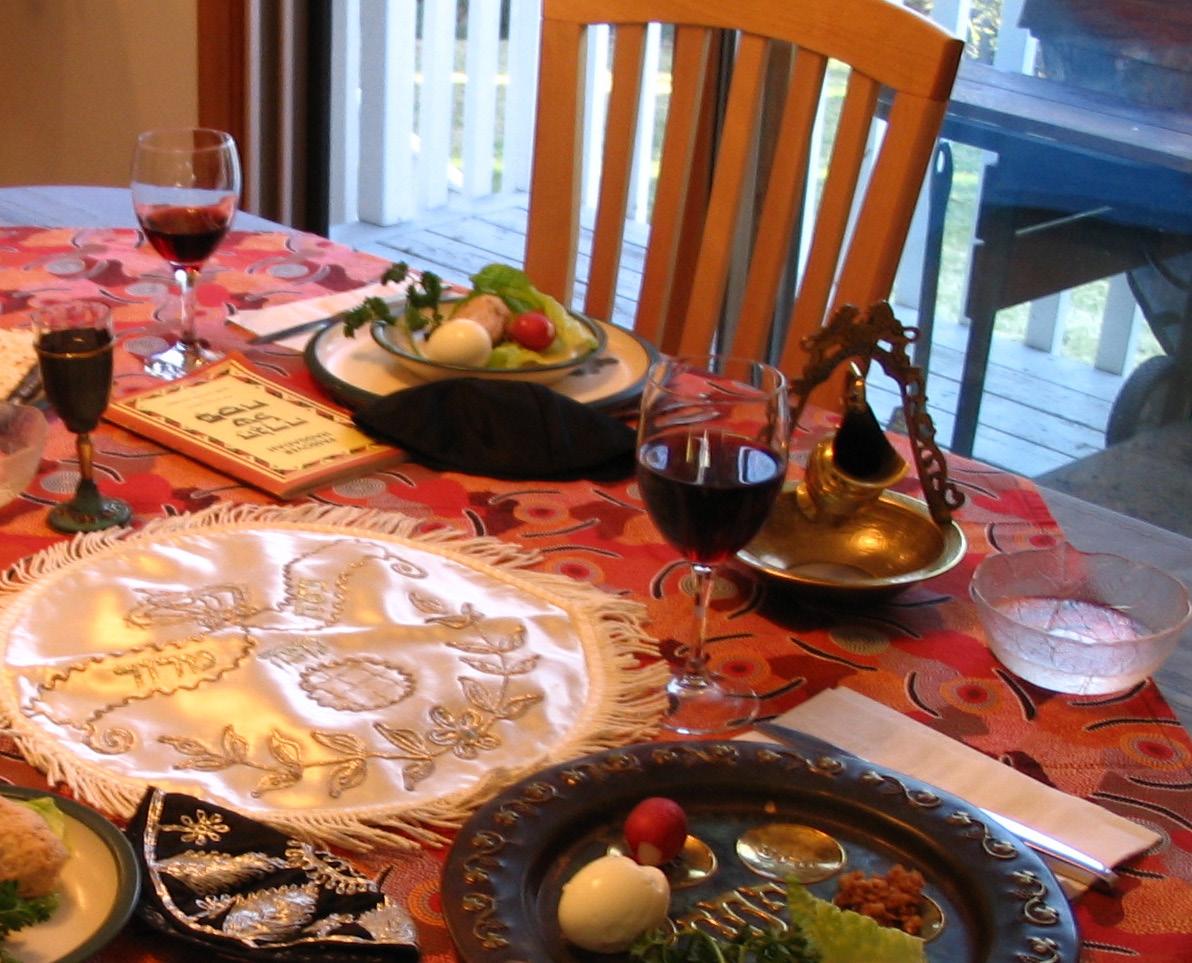
As
Join the effort at afmda.org or call 866.632.2763.
SOUTH KINGSTOWN – Ghaith al-Omari and Dennis Ross, Middle East policy experts and senior fellows at the Washington Institute for Near East Policy, presented a comprehensive analysis of the Israeli-Palestinian conflict and prospects for the future when they spoke at the University of Rhode Island on March 26 in a program sponsored by URI Hillel and the URI Department of Political Science.
THE SCHOLARS visited two Political Science classes during the day and gave an evening presentation to about 70 people gathered in person and another 50 who joined on Zoom.
Drawing on decades of experience in the diplomatic field, the two modeled how to hold a respectful, produc -
tive and forward-looking conversation on a topic that inflames passions. Former U.S. Ambassador Ross was the point man in the peace process in both the George H. W. Bush and Bill Clinton administrations, and al-Omari was an adviser to the Palestinian negotiating team during the 1999–2001
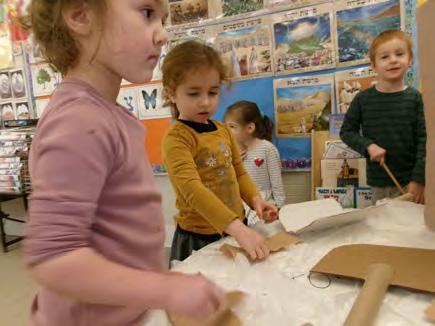
permanent status talks.
“The current war in Gaza is a tragedy that has divided our classrooms and our wider URI community. So I was thrilled when URI Hillel reached out to us with this opportunity to bring in Dennis Ross and Ghaith al-Omari for a series of engagements on this topic,” said Prof. Marc Hutchison, chair of the URI Department of Political Science. “Their deep knowledge and expertise on the complex Israeli-Palestinian relationship is critical for providing context to the current [Israel-Hamas] conflict. And their deep decades-long friendship, despite their differences, is a model on how to engage in dialogue even on issues that evoke strong emotions.”
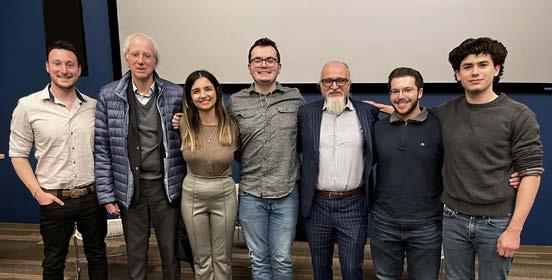
URI Hillel students (left to right), Brett Ruben, Zach Breene, Daniel Groysman and David Rudolph with Dennis Ross (2nd from left), Ghaith al-Omari (3rd from right), and URI and Bryant Hillel Israel Fellow Tal (3rd from left).
One thing Ross and al-Omari agree on unequivocally is that the only way for sustainable peace is through a two-state solution.
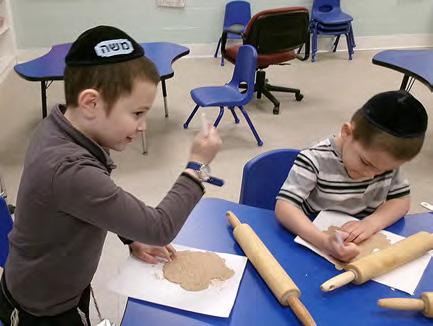
“It will not be produced any time soon, but we can’t give up on it,” said Ross. “We need to work on how we can preserve it as an option.”
Al-Omari stressed the importance of recognizing the legitimate attachments that both Jewish Israelis and Palestinians have to the land, and how those attachments are inseparable from their identities.
“We can’t only speak about compromise, we must speak about sensitization,” he said.
Addressing recent tensions between the United States and Israel regarding the U.S.’s decision not to veto the latest U.N. Security Council resolution calling for a ceasefire, the speakers underscored the unique position that the United States has – and will always have – in these negotiations.
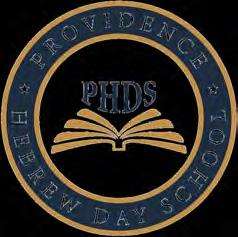
Rabbi Peretz Scheinerman DEAN
Rabbi
Zev Weissmann
Despite the fluid political landscape, characterized by shifts in the Israeli government and changing U.S. administrations, the U.S. remains the most viable intermediary capable of brokering substantive and lasting negotiations between Israel and Palestine, Ross and al-Omari said.
When asked how students can get involved in meaningful ways that could potentially lead to real, practical change, the speakers discussed the importance of supporting and pursuing internships with non-gov-
ernmental organizations (NGOs) that bring Israelis and Palestinians together for initiatives and dialogue. They also encouraged students to get involved in the policy world, citing a concern that the policy landscape is severely lacking in representation from the younger generations.
Brett Ruben, a Ph.D. candidate at URI, said, “Hearing from those who have been on the frontlines of negotiations between Israelis and Palestinians gave me new insights on the importance of visionary leadership on both sides to bring about a future where Israelis and Palestinians can recognize each other’s legitimacy and aspirations.”
Daniel Groysman, a URI senior, had the opportunity to attend the 2023 and 2024 Hillel International Student Leadership Israel Summits, where Ross and al-Omari gave similar talks to student groups.
“I was deeply moved by having these two geopolitical experts come to URI,” Groysman said. “Mr. Ross and Mr. al-Omari cut through the noise surrounding this conflict by focusing on a pragmatic view of how the region can move forward and how neighboring Arab countries can play a role in the long-term path to stability.”
AMY OLSON is URI Hillel executive director. DANIEL GROYSMAN is a senior at URI.
DINING IN THE DIASPORA is a group exhibition about food, tradition and welcoming folks to our literal and proverbial tables.
Throughout 2,000 years of exile, the cuisine and customs of the Jewish diaspora have both influenced and been influenced by the cultures of their neighbors everywhere in the world in an ever-evolving culinary conversation. What happens when tradition meets modernity or when people of differ-
at the Dwares JCC. It will be curated by Alliance artist-in-residence Zo Baker.
Exhibit submissions are open to artists of all backgrounds and all mediums (except actual edible food).
Submissions are due Monday, April 15, 2024.
Please reach out to Zo Baker at schmattefactory@gmail. com with any questions.
Timeline:
• Monday, April 15:
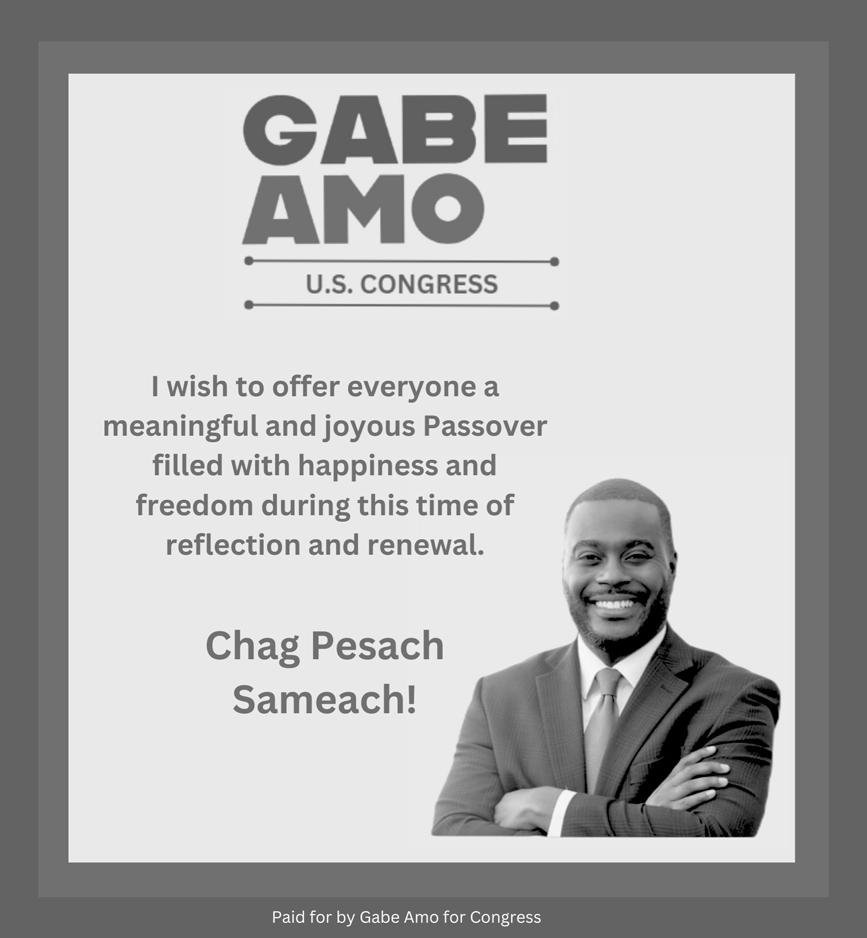
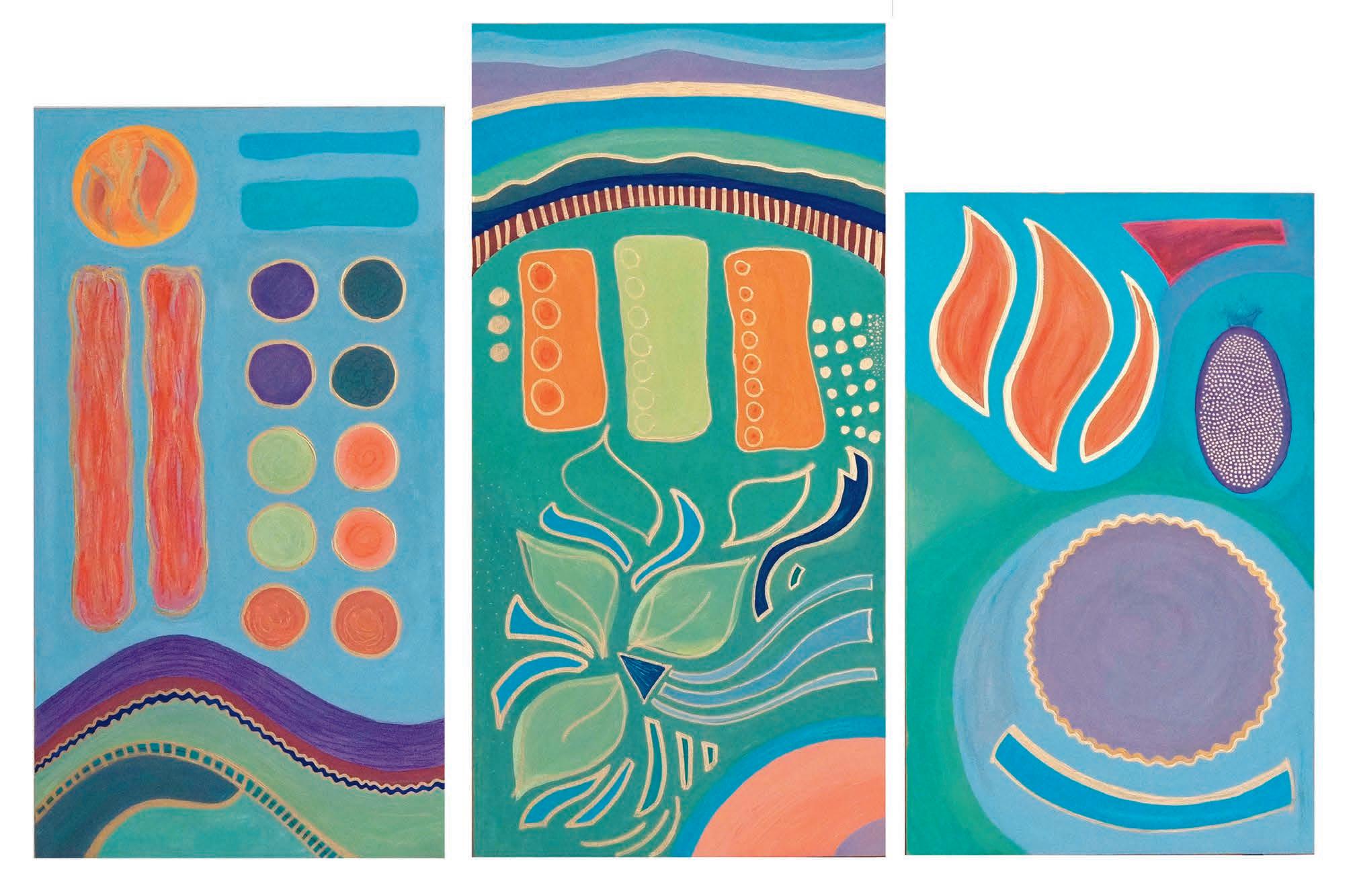
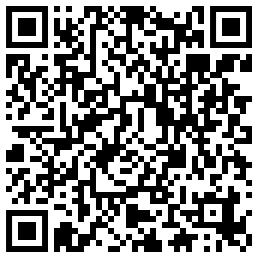
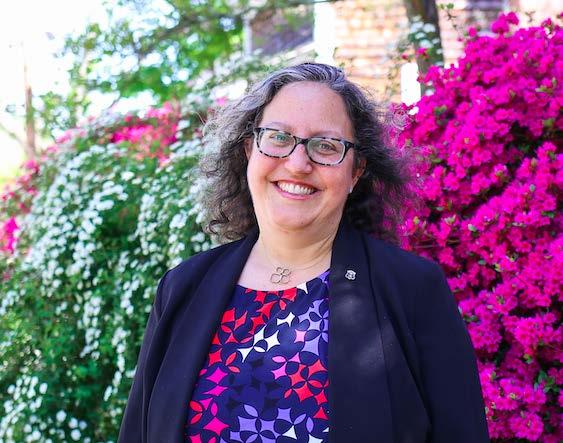
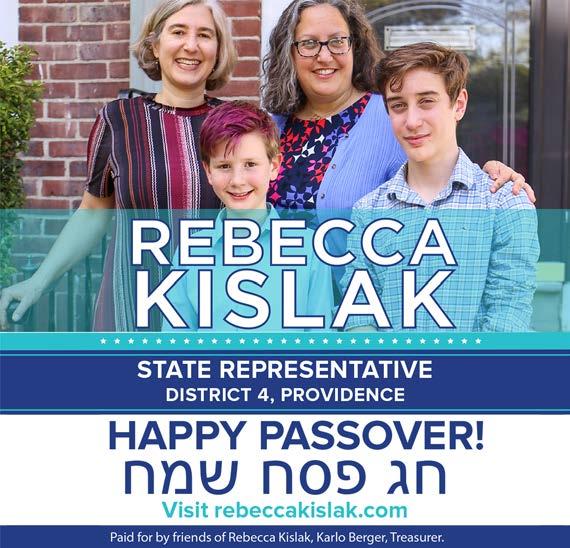
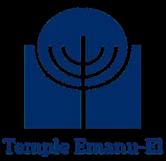

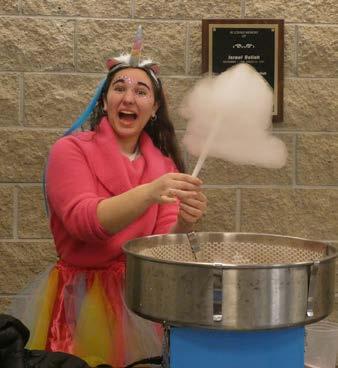
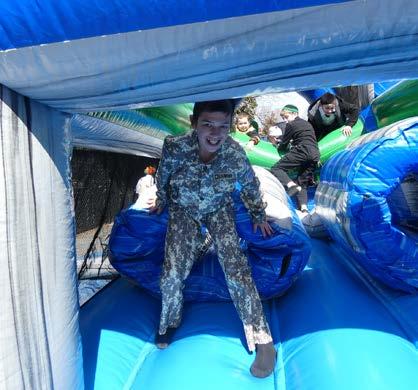
THE
Purim Extravaganza included an obstacle course bounce house, cotton candy, balloon animals, face painting and so much more fun! Thank you to the many volunteers including students at the New England Academy of Torah and the New England Rabbinical College, and PHDS parents who made the March 24 event so spectacular.
We learn from our seder to ask di cult questions and parse our time’s challenging realities. In this season of our redemption, we dream of a world free from illness, war and hatred.

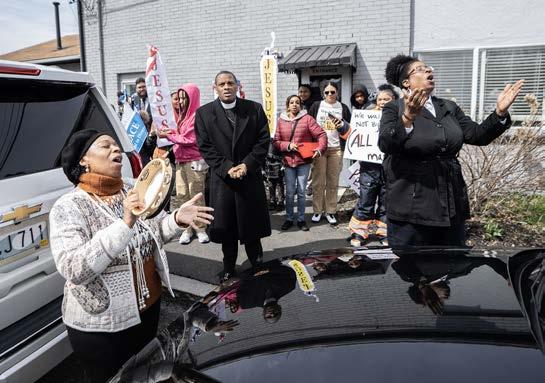























.םילשוריב האבה הנשל









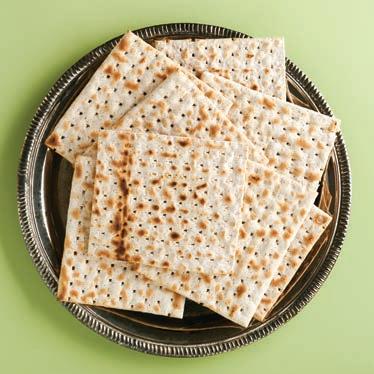


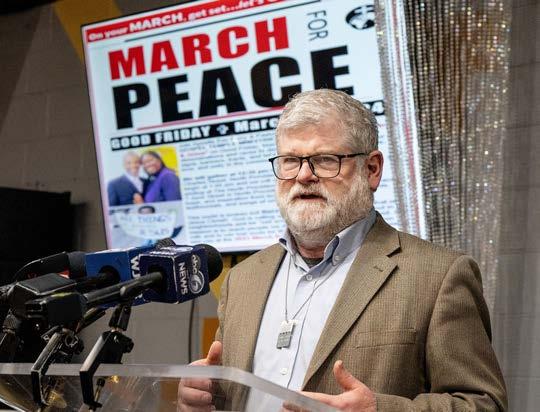
REPRESENTATIVES FROM the Jewish community supported members of the Shiloh Gospel Temple in North Providence on March 29 as they gathered for a March for Peace. The church was a victim of an arson attack in February. Rabbi Jeffrey Goldwasser of Temple Sinai in Cranston shared remarks on behalf of the Jewish community.
70 Orchard Avenue Providence, Rhode Island
Call us at (401) 331-6070 or email info@temple-beth-el.org. temple-beth-el.org
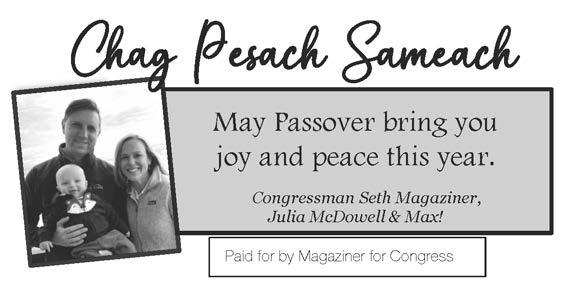
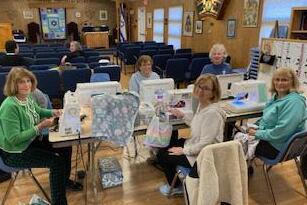
ON SUNDAY, March 17, congregants of Congregation
Beth David in Narragansett were joined by several members of Temple Shalom in Middletown for the annual Tote Bag Project. Participants brought sewing machines, fabric and ironing boards to create 54 cloth bags for foster children of Rhode Island.
The colorful tote bags were given to RI Department of Children Youth and Families to be used by
social workers when a child moves to a new foster home. The cheerful cloth bags replace plastic garbage bags that would normally be given to the child for his or her possessions.
Participants had a fun afternoon together, schmoozing with friends while performing a mitzvah.
Submitted by Congregation Beth David of Narragansett
NARRAGANSETT – Congregation Beth David’s Tikkun Olam Committee has completed a major project: The creation of a comprehensive list of Jewish veterans, and their spouses, who are buried at the RI Veterans Memorial Cemetery, in Exeter.
The project was initiated upon learning that the cemetery does not keep a list of veterans buried there by religious affiliation.
Several members of the Tikkun Olam Committee visited the entire cemetery from October to December of 2023 and recorded the name, date of birth, date of death, gravesite location, military branch and rank for every gravesite and mausoleum site bearing a Star of David. Committee members identi-
fied 195 burials and collected the data. Beth David Vice President Marion Myers then compiled the information into a spreadsheet.
Furthermore, arrangements are being made to have the two major funeral homes serving Rhode Island’s Jewish community send the committee information on recent burials of Jewish veterans and their spouses, so the list can be continually updated.
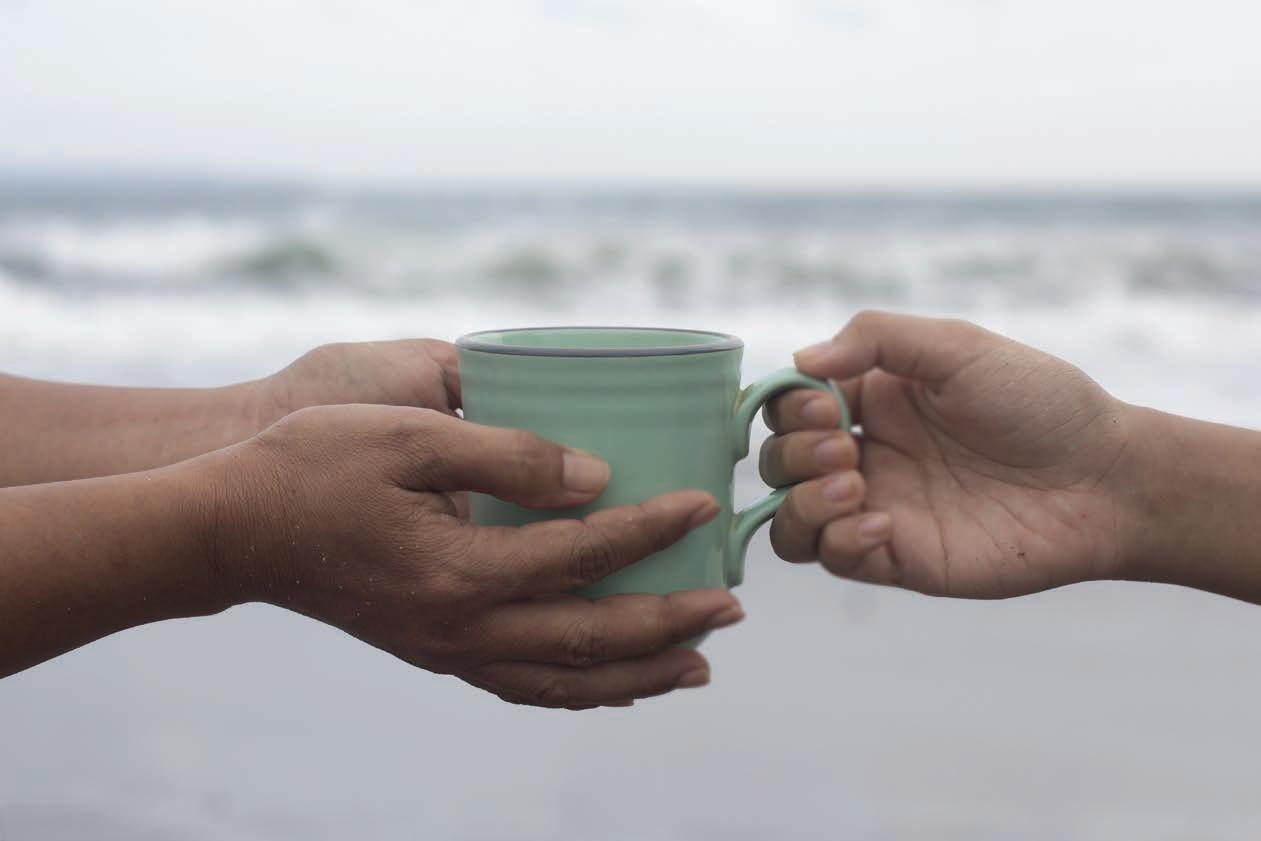
Any individual, group or organization that wants a copy of the list should email Myers at dotcalm@cox.net.
Submitted by Robert E. Fricklas, chairman of Congregation Beth David’s Tikkun Olam Committee
The process of buying or selling a home can be challenging. But it doesn’t have to be. We help clients take the stress out of buying and selling real estate. 401-847-3033


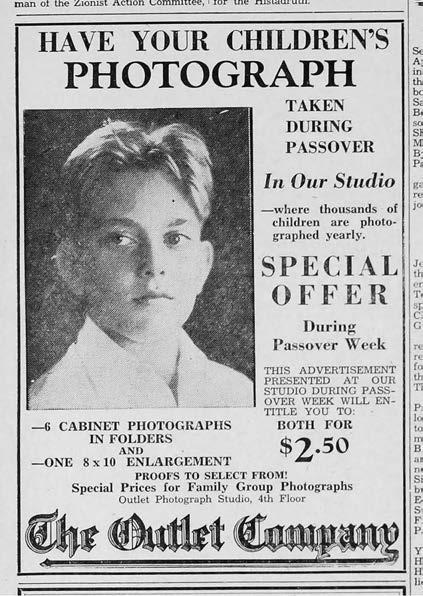
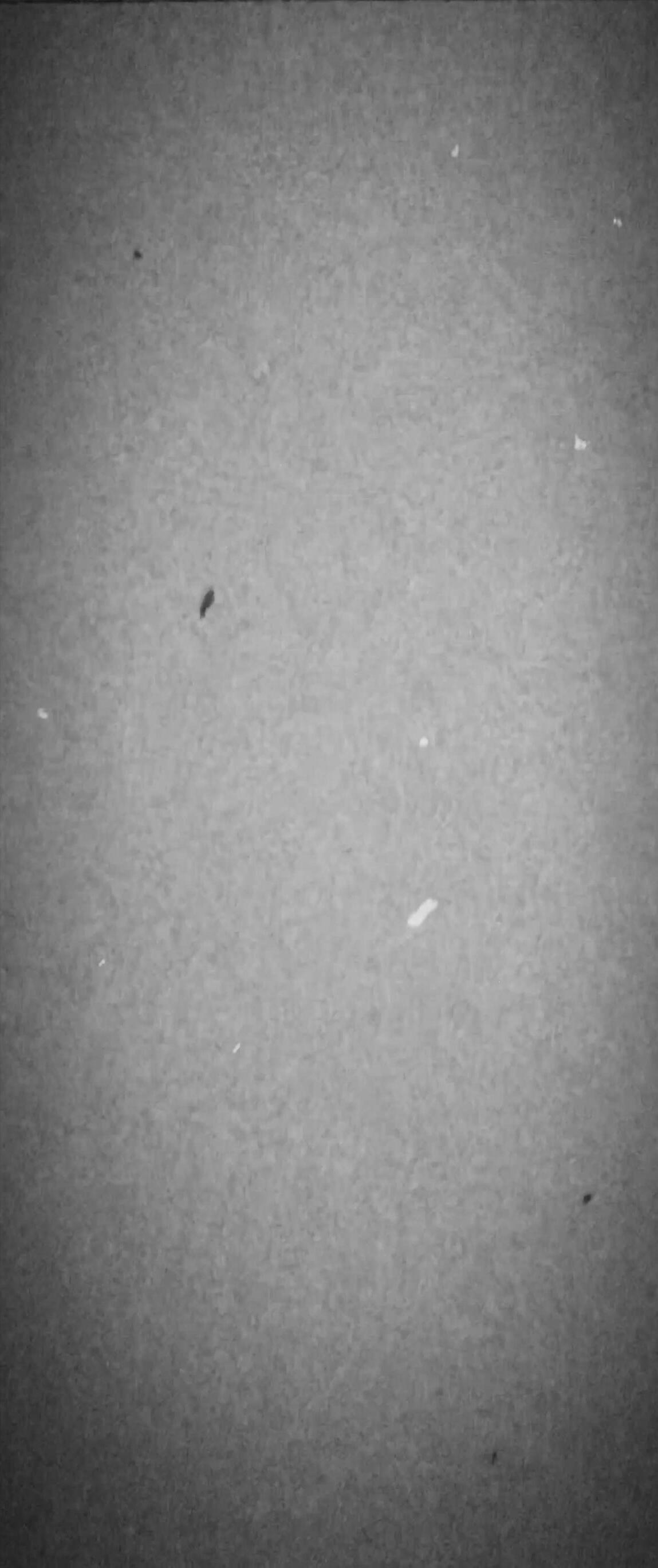
This ad from April 1932 for children’s portraits has no street address, because every local in 1932 would have known where to find The Outlet Company: 176 Weybosset St., right in the middle of downtown Providence. Brothers Joseph and Leon Samuels founded “The Outlet” in 1891, and the department store would grow from a single storefront to an entire city block. This bastion of commerce attracted customers from across the region, including families in search of formal photos. At its zenith, The Outlet Company not only operated a store but TV and radio stations as well. This revered building was sold and eventually gutted by fire in 1986, but the property is now a greenspace for Johnson & Wales University. You’ll also recognize WJAR, the state’s first television station, which was founded by The Outlet Company.
THE JCC of Greater Boston is sending a delegation of athletes to this summer’s JCC Maccabi Games in Detroit (Bloomfield), Michigan.
The games will take place from July 28 to Aug. 2, and athletes between the ages of 12 and 16 years are eligible to compete in the following sports: baseball, basketball, ice hockey, girls’ volleyball, golf, soccer, table tennis, tennis, star reporter, swimming and dance.
This is a fabulous opportunity as 1,800 Jewish teens from all around the world converge for this year’s games. Join Jewish teens from North and South America, Israel, Europe and beyond for a chance to make new friends, compete in exciting sports and have the time of your life!
Activities include Olympic-style sports competitions, including opening and closing ceremonies; JCC Cares community service projects; hangtime programming with Israeli schlichim; and evening social events.
Rhode Islanders are invited to join the group. Participants must be between the ages of 12 and 16 as of July 31, 2024.
If you know a teen who might be interested in participating, please contact Susan McSweeney, Delegation Head for the Maccabi Games of the JCC of Greater Boston, at maccabigames@jccgb.org.
Submitted by Susan McSweeney, delegation head, JCC Maccabi Games, JCC of Greater Boston.
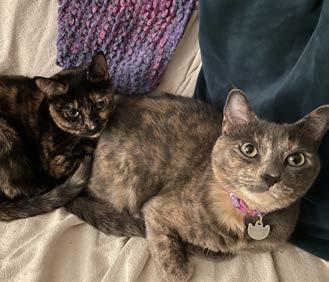
Do you have a furry friend you’d like to share with the community? May is coming up and that means it’s time for Jewish Rhode Island’s annual pet issue where we feature photos of your dogs, cats, bunnies, horses, birds and reptiles. Fish are welcome, too! Take a picture of your faithful companion and send it to us. We’ll feature your companion in our pet pages. This issue is a community favorite! Deadline for photos is May 1, so send yours in today! Please remember to include your name, city of residence and your pet’s name. Email to editor@ jewishallianceri.org. Or upload your pet photo at jewishrhody.org under “Submit your photo” at the bottom of our website. If you prefer snail mail, Editor, Jewish Rhode Island, 401 Elmgrove Ave., Providence, RI 02906.
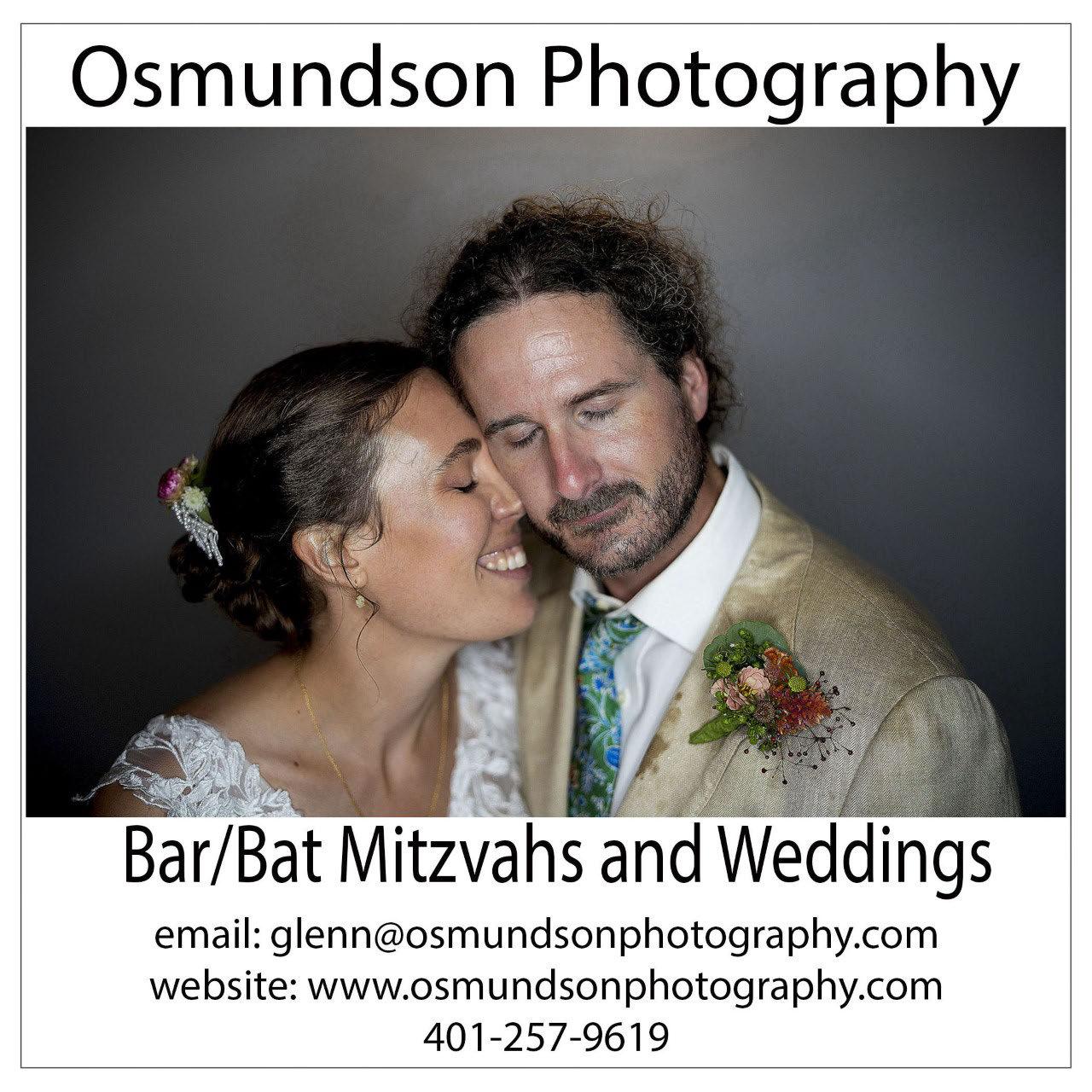
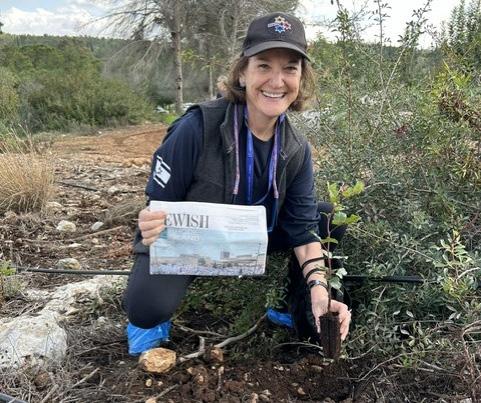
SUSAN SIKOV of Providence participated in a JNF volunteer mission to Israel recently. On Tu B’Shevat she planted cypress trees outside Jerusalem.
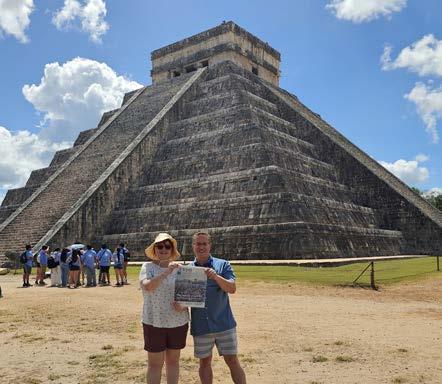
SHARON SCHWARTZ-Vanderhoff and her husband, Earl Vanderhoff, recently enjoyed an amazing vacation in Merida, Mexico, and surrounding areas in the Yucatan Peninsula. Here they are in Chichen Itza in front of the Temple of Kukulcan.
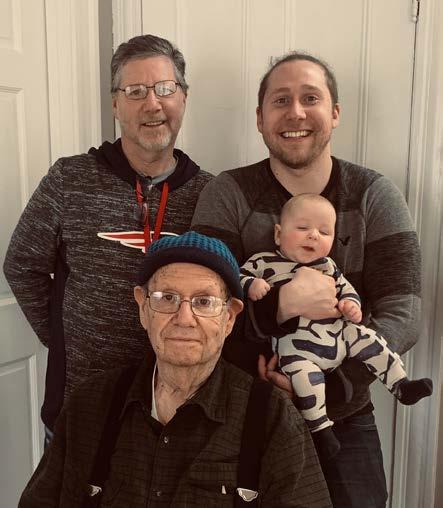
MAZEL TOV ! Four generations of Freedmans: Stanley, Joel, Joshua and Henry. Stanley just completed 60 years of teaching Judaism at Temples Sinai and Beth-El. Stanley is a lifelong Rhode Islander.

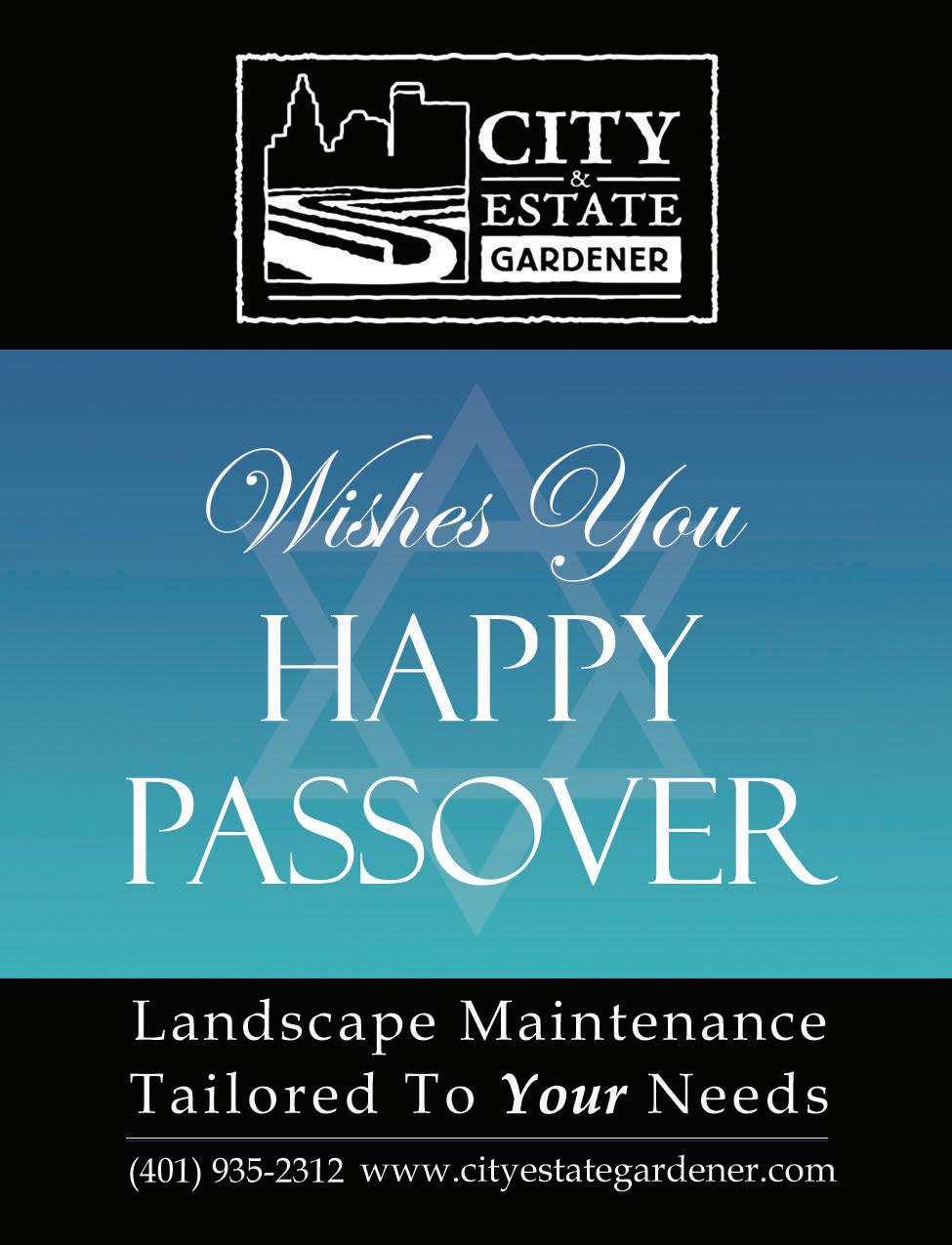



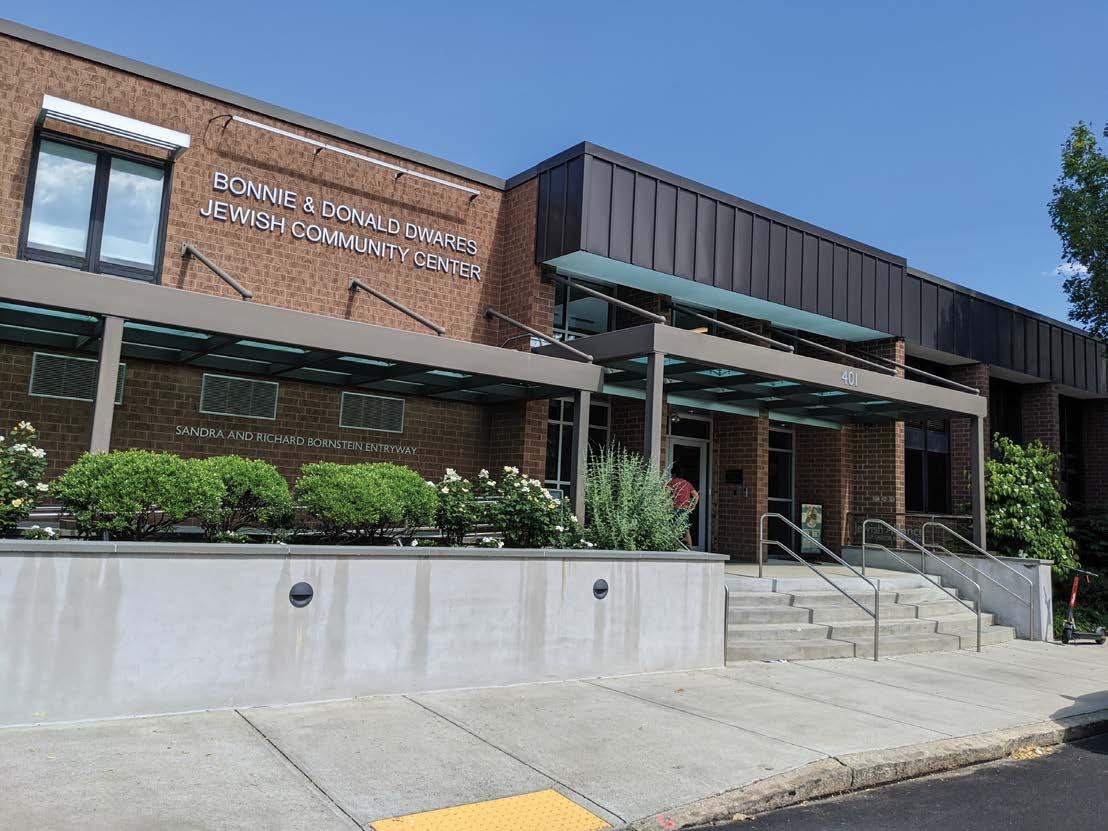


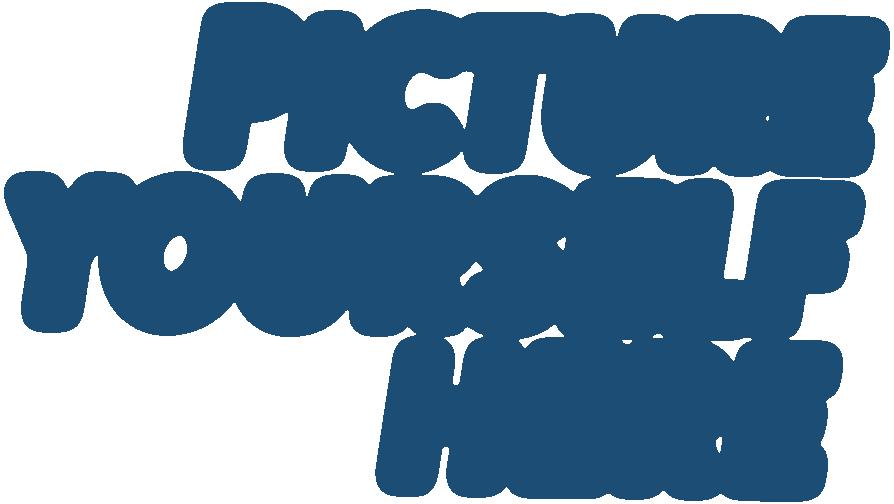




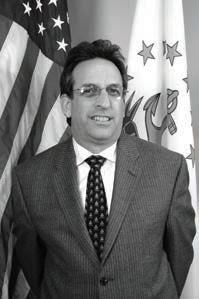
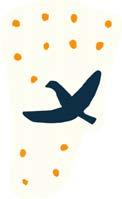
11:00am - 6:30pm



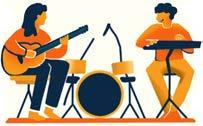








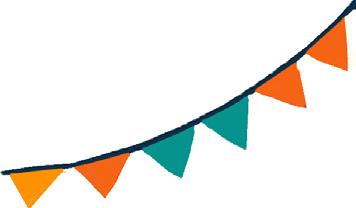










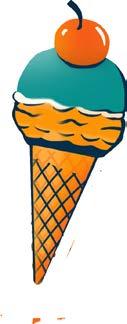



Join us at the Dwares JCC as we put the best of Jewish culture on display for all of Rhode Island!
The Jewish Culture Fest will feature live musical performances on outdoor stages, dance performances, stand-up comedy, family-friendly Kid Zone featuring Rock-a-Baby, community art exhibit, storytellers, food, beer garden, whiskey tasting, open-air artisan market and more!
Featuring Performances by
Ezekiel's Wheels
One of the world's top klezmer ensembles Raza
Musical project that explores the feminine sound in old Hasidic melodies
Comedian who has appeared on the Tonight Show, Conan, and more
Preserves the words of WWII Holocaust survivors through dance and movement
Jacob's Ladder
Jewish music and traditional American Roots music
Mark Binder
Award-nominated author and storyteller
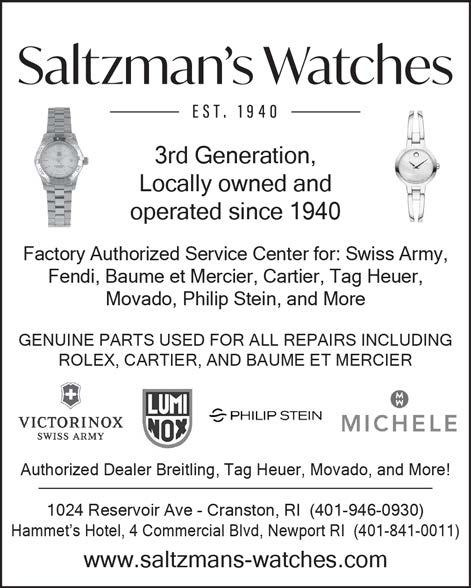

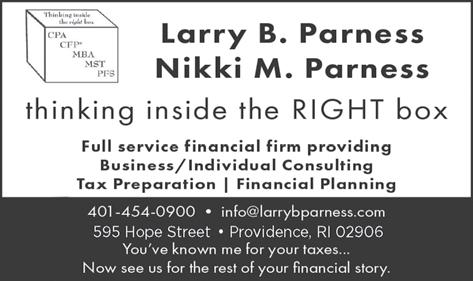






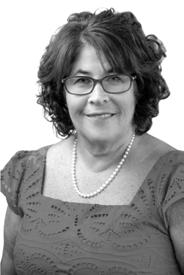


Enid Burrows, 80
MILTON, MASS. – Enid
Young Burrows, formerly of Providence, died on March 13, 2024, in Milton. Prior to her death, Enid resided for more than 55 years in Cambridge, Massachusetts.
A graduate of Lesley College, Enid taught elementary school in Newton, Massachusetts and had a second career as a technical writer for technology companies. In her retirement, she assisted high school, college and graduate students for whom English was a second language.
Enid loved and was devoted to her dogs, Italian greyhounds named Lappi and Joli, and she never was as happy as she was spending time with them.
She was daughter of Libby and Murry Burrows of Providence and was preceded in death by her sister, Marjorie Burrows Feldman of Anchorage, Alaska, and Seattle, Washington. She is survived by her brother-in-law Jeff Feldman, of Seattle; by her nephews, Peter Feldman, of Los Angeles, California, and James Feldman (and Liza Slotnick), of Seattle; and by her grand-niece, Samantha Marjorie Feldman, of Seattle. Enid is best honored by a donation to the SPCA or the Humane Society.
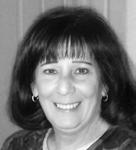
Cindy Collum, 69 CRANSTON, R.I. – Cindy Collum died March 8, 2024, at Kent Regency. She was the wife of Thomas Collum for 28 years. Born in Warwick, a daughter of the late Donald and Betty (Rosenthal) Cohen, she was a lifelong Cranston resident.
Cindy was a real estate property manager until her retirement, but her focus was always on her family. Especially in her later years, she distinguished herself as a caregiver. She spent almost three decades supporting Betty after Donald passed away. With Thomas by her side, Cindy was a constant presence in her mother’s life, ensuring that Betty’s later years were filled with love and companionship. She was never shy about expressing her pride and showing her support for her two children, Brian and Laura Matteson. As they grew their families, she embraced them as well, serving as “Nena” to Brian and his wife Erin’s twin daughters Juliette and Sophia. She was an excellent “Nanny” to Laura and her partner Radek’s twin children Blake
and Serena.
Upon marrying Thomas in 1996, Cindy also got the benefit of joining a second family. She became a stepmother to Thomas’ three children (Katy, Andy and Scott) and was grandmother to their children, Evianna, Brandan, Maya and Cannon. Even toward the end of a difficult medical journey, there was nothing that gave Cindy more joy than visiting with her grandkids.
Cindy is also survived by her dear brother Dean Cohen and his family, and was preceded in death by her sister Susan Richter.
Contributions in her memory may be made to The Fly Foundation, P.O. Box 2528, Fall River, MA 02722.
Arlene Hoyle, 82
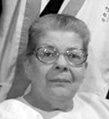
COVENTRY, R.I. – Arlene B. (Diner) Hoyle, of Coventry, passed away March 9, 2024, at Sunny View Nursing Home, in Warwick. She was the wife of the late Michael M. Hoyle. Born in Providence, a daughter of the late Abraham and Anna (Miller) Diner, she had lived in Coventry for the past 44 years.
Arlene was an office manager at Rau Fasteners Company – where she met her husband, Michael, in 1973 – as well as several other area businesses for many years before retiring.
Survivors include a son, Eric B. Hoyle, and his wife, Denise, of Melissa, Texas; a daughter, Ronda Matarese, and her husband, Richard, of West Warwick; two granddaughters, Madison and Hannah Reagan, of Melissa, Texas; and several nieces and nephews. She was the sister of the late Harriet Levi, Frances Licker and Robert Diner.
Dr. David Korn, 91
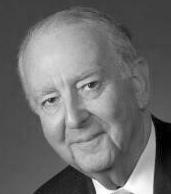
Dr. David Korn, husband of Carol Scheman, died on March 10, 2024. A son of the late Solomon and Claire (Leibman) Korn, he was born in Providence, where he attended Classical High School. After graduating from Harvard College and Medical School, he became a clinical and research pathologist at NIH. In 1968, he joined the Stanford University Department of Pathology as professor and chair and, over the next 17 years, built one of
the top-ranked departments in the country. He was appointed dean of Stanford Medical School in 1984 and served in that position and as vice president of Stanford until 1995. Among his many leadership positions in science and medicine, he was a member of the National Academy of Medicine, an AAAS Fellow, a founder of the California Transplant Donor Network and a Presidential appointee as chair of the National Cancer Advisory Board. His subsequent career included chief scientific officer of the Association of American Medical Colleges and Vice Provost for Research at Harvard.
He and his ex-wife, Phoebe Richter Korn, had three sons: Michael and his children, Shira Tova, Shmuel, Zipporah Esther, Ashleigh and Carolyne, and 21 grandchildren; Stephen and his children, Justin and Elyse, and their mother, Jana; and Daniel, his wife, Barbara, and children, Rachel and Andrew. He has been an adoptive father and stepfather to the daughters of his loving and beloved wife, Carol, whom he married in 1997: Rebecca Fiduccia, her partner, Anthony, and son, Rocco; and Joanna Fiduccia, her husband, Josh, and son, Solomon. He was a delighted and delightful grandfather, who especially loved playing, walking and talking with his adored grandchildren. He was occasionally cantankerous, always principled, deeply concerned about the future of the country and its democracy, dedicated to gender and racial equity and scientific excellence, and a devoted mentor. He leaves an indelible mark on the world and a hole in many hearts.
Contributions may be made to the Providence Classical High School Alumni Association, the Boston Symphony Orchestra, the Boston Museum of Fine Arts or Temple Emanu-El, in Providence.

Harvey Levine, 92 PROVIDENCE, R.I. – Harvey Frank Levine, of Providence and formerly of New York, passed away on Feb. 20, 2024, at his residence with his loving family by his side. He was the husband of Fleurette (Rubin) Levine, with whom he shared 67 years of marriage.
Born in Manhattan, New York, a son of the late Henry and Sally (Friedenreich) Levine, he had lived in New
York for many years before moving to Rhode Island 10 years ago.
Mr. Levine served in the United States Air Force during the Korean Conflict, from 1951-1955. He was an electronics technician working with Sam Goody for 26 years and PC Richard for 10 years. Harvey loved his kids and grandkids and was a “consummate” handyman who could fix it all. He collected many different things but had a special interest in antique radios.
In addition to his wife, survivors include two sons, Bruce Levine, of New York, and Scott Levine and his wife, Suzanne Bornschein, of Providence; and four grandchildren, Eric, Brian, Maxwell and Ella Levine. He was the brother of the late Marilyn Goldberg.
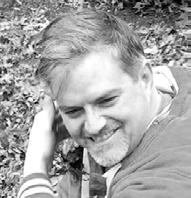
William McKiernan, 50 WARWICK, R.I. – William “Bill” P. McKiernan, of Warwick, passed away March 7, 2024. He was the husband of Jen Maizel McKiernan, with whom he shared 15 years of marriage and a lifetime of friendship.
Born in Providence, Bill was the younger son of the late Judge John S. McKiernan and Elizabeth Pearl McKiernan. After graduating from Toll Gate High School in 1991, Bill went on to earn a bachelor’s degree in mathematics from the University of Notre Dame.
Bill was a corporate financial advisor for more than 20 years and recently transitioned to managing his own clients. He was an avid Patriots fan and loved the ocean, especially sailing with friends, as well as cooking and taking care of his lifelong
family home in Warwick. Bill had a wicked sense of humor, was devoted to his friends and cousins, was passionate about social justice and loved to make “Good Trouble.”
More than anything, he loved spending time with his wife, Jennie, and their three children, Jonah (12), Ellie (10) and Micah (5).
Bill is also survived by his three siblings, Laura McKiernan and her husband, John Sylvia, of Warwick; John McKiernan and his partner, Vicki Gilmore, of East Greenwich; and Mary McKiernan, of Philadelphia; his aunt, Cecile Schneider and her husband, George, of Attleboro; four nieces, Riley McKiernan, Olivia McKiernan, Kennedy Perkins and Aurora Sullivan; mother-in-law, Gail Maizel, of East Greenwich; and sister-inlaw, Rebecca Sullivan and her husband, Jesse, of Sandwich, Massachusetts. He was the son-in-law of the late Dr. Abby Maizel.
Contributions may be made to The John and Lillian Miles Lewis Foundation (https:// www.johnandlillianmileslewisfoundation.org) or the Neuroendocrine Tumor Research Foundation (https://netrf.org).
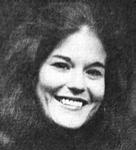
Jane Lunin Perel passed away on Feb. 22, 2024. She was the wife of Dr. Morton L. Perel for over 50 years. Jane was born on May 28, 1946, in Newton, Massachusetts, the daughter of the late Louis and Marion (Rosenblatt) Lunin. Jane graduated from Brookline High School, in Massachusetts, in 1964 and from the University of Massachusetts

– Amherst with a bachelor of arts degree in 1968 and a master of fine arts degree in poetry in 1971. She was the second woman ever to do so at the university.
In the autumn of 1971, Jane was readily welcomed to Providence College as the first poet hired to teach creative writing at the college as it transitioned to a co-ed institution, quickly rising to the rank of Professor of English. She taught there for 43 years.
Jane developed a course in Holocaust Literature and was involved in coordinating Holocaust remembrance programs at PC. She was also the Founding Director of the Women’s and Gender Studies Program and the Providence College Poetry & Fiction Series, which brought prominent writers to the college to engage with the students and community.
In 2015, Jane was awarded an Honorary Doctorate of Fine Arts from Providence College.
Early in Jane’s residence in Providence, she met her soulmate and love of her life, Dr. Morton L. Perel. While she had a positive influence on many, he was her number one fan, regarding her as a Renaissance woman, poet extraordinaire and the most empathetic woman he ever knew. They had their first date at the Rathskeller, where she gave a poetry reading to the audience. Morton was captivated by Jane’s magnetic personality, sense of humor and extreme good looks. They married shortly after, on Dec. 23, 1973, and were inseparable
from that point forward.
Jane was the author of five collections of poetry –“The Lone Ranger and the Neo-American Church,” “Blowing Kisses to the Sharks,” “The Fishes,” “The Sea is Not Full” and “Red Radio Heart” – and her poems were widely anthologized. Over the past three years, she has worked diligently to compose a final manuscript.
Jane was a lifelong dog lover, and animals of all kinds, especially dogs, were drawn to her nurturing presence. She also enjoyed reading and solving mysteries, especially those by Agatha Christie and P.D. James, a hobby passed down from her beloved father; studying the works of Ukrainian playwright Sholom Aleichem; and watching nature documentaries, from which she recharged her inner strength, knowing she was a small piece of the great Earth’s evolution and story.
Jane is predeceased by her parents, Louis and Marion (Rosenblatt) Lunin, and her sister, Lesley Mehlman. She is survived by her husband Dr. Morton L. Perel and her sister, Andrea Sigurdsson
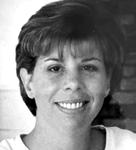
Lisa Ryan, 67 WRENTHAM, MASS. – Lisa (Levenson) Ryan, of Wrentham, passed away on March 6, 2024, at her residence. She was the wife of Michael G. Ryan, with whom she shared

29 years of marriage. Born in Dartmouth, Massachusetts, a daughter of the late George M. and Barbara A. (Smith) Levenson, she had lived in Wrentham for the past 23 years.
A graduate of Dartmouth High School, Class of 1974, she went on to earn a bachelor’s degree in Childhood Psychology from Simmons College. Lisa was a unit secretary at Boston Children’s Hospital and later Norwood Hospital for many years before retiring. She enjoyed shopping and was especially fond of looking for antique furniture. A genuinely kind-hearted person, Lisa always had a special way of showing her family members how much she truly cared for them.
In addition to her husband, she is survived by her son, Michael J. Ryan, of Wrentham; two brothers, Jay Seth Levenson and his wife, Susan Tiller, of North Smithfield; and Edward S. Levenson, of Peabody, Massachusetts; a brother-in-law, Anthony Venuto, of Taunton, Massachusetts; three nieces, Amanda Levenson, Lindsey Venuto and Jamie Levenson; and one nephew, Zachary Levenson. She was the sister of the late Amy Venuto.
Contributions may be made to The National Scleroderma Foundation, Attn: Donations, 300 Rosewood Drive, Suite 105, Danvers, MA 01923.
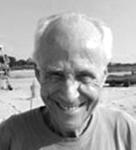
– Frederic “Richard”
Shein, of Providence, passed away on March 1, 2024, at HopeHealth Hulitar Hospice Center.
He was the husband of the late Pearl (Horvitz) Shein, with whom he shared almost 50 years of love and marriage. Born in Providence, a son of the late Stanley and Thelma (Rose) Shein, he was a lifelong resident of the city and resided on the East Side. A United States Army Veteran, Mr. Shein was a real estate agent for many years before retiring at age 50 to travel the world.
Richard wrote for the Federation Voice and was the chairman of the editorial board. He was also chairman of the Ethics Committee of the RI Board of Realtors and taught in the Sunday school at Temple Beth-El. Richard was a “foodie” and enjoyed bringing people together and the communal sharing of ideas and perspectives. He was a
regular fixture on Hope Street for many years and will be missed.
He is survived by two daughters, Rachel Shein, and her husband, Steven Pilarski, of San Diego, California; and Jane Noel, of Providence. He also leaves behind four grandchildren, Spencer, Zachary, Sophie and Viola; and two great-grandchildren, Elijah and Maddison. He was the brother of the late Harvey and Donald Shein. He was also lucky to have shared love later in life with Elaine Auger.
Contributions may be made to Hope Alzheimer’s Center, 25 Brayton Ave., Cranston, RI 02920 or the Alzheimer’s Association, 245 Waterman St. #306, Providence, RI 02906.
Leon Sloane, 95
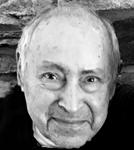
CRANSTON, R.I. – Leon H. Sloane, surrounded by his family, died on March 23, 2024, at Kent Hospital. He was the beloved husband of the late Barbara (Newman) Sloane. Born in Providence, a son of (the late) Theodore and Jeanette (Kaplan) Sloane, he had lived in Pawtucket, Narragansett and Florida, before moving to Cranston in 2021. He was the co-owner of Sloane Furniture, alongside his brother and father, for many years. Leon was a member of B’nai birth and of Touro Fraternal Association. He was the devoted father of Richard Sloane, Susan Sugerman and her husband, Michael. He was the dear brother of the late David Sloane and brother-in-law of Joan Sloane. He was the loving grandfather of Jonathan, Jared, Jennifer, Joshua, Zahar and Yitzhak. He was the cherished great-grandfather of: Alexa, Zachary, Riley, Tatum and Cole. He was a loving uncle to Deborah Nye, Tracy Maggio, Penny Andler, Robin Nozick, Eileen Rose and Betsy Delsanto.
Contributions may be made to VNA Care New England or Kosher Meals on Wheels.
Elaine Slom, 95 WARWICK, R.I. – Elaine Barrie Slom died March 6, 2024, at Steere House. She was the wife of the late Robert Barrie and Earl Slom. Born in Providence, a daughter of the late Lee and Belle (Liebowitz) Kaplan, she had lived in Warwick since 2012, previously living in Cranston. She was teacher’s aide for 15 years, retiring in 1990. Elaine was
a former member of Temple Sinai. She was the mother of Alison Barrie, of Warwick; Lori Barrie Wright and her husband, David Wright, of Shrewsbury, Massachusetts; Lisa Jachowicz, of Southborough, Massachusetts; and the late Dean Thomas Barrie. She was the grandmother of Andrew, Taryn, Kristopher, Meredith, Michele, Joseph and Julie. Contributions may be made to American Parkinson Disease Association, P.O. Box 41659, Providence, RI 02940.
Charles Sokoloff, 81
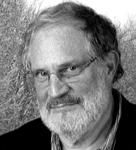
Charles Sokoloff passed away on March 11, 2024. Charlie was born on June 9, 1942, in Brooklyn New York, the only child of Nekha Leibowitz Sokoloff and Nathan Sokoloff. In his youth, Charlie was an avid cyclist, often riding from Brooklyn to the airport with his cousin Art Leonard to watch the planes take off and land. After graduating from Abraham Lincoln High School in Brooklyn, Charlie went on to study at Brown University where he found one of the great joys of his life, radio, at the start of WBRU, and made some of his closest lifelong friends.
Charlie then graduated from law school at the University of Pennsylvania in 1966, received his L.L.M. in Taxation from Boston University, and moved back to Rhode Island where he practiced law first at Tillinghast, Collins & Graham and then at Tobin & Silverstein, Hinckley Allen and then his solo practice. He was a devoted member of the Rotary Club and Chamber of Commerce in Woonsocket, a fervent Autumnfest worker, a Shriner and member of the Royal Order of Jesters, amusing children and living by the motto, “Mirth is King.”
Charlie is survived by his children Audrey, Seth and Daniel Sokoloff; three grandchildren, Nate and Ben Sokoloff, Leah Riley Brown and her husband, Andrew McDonald, two great-grandchildren, Freya and Savanah Riley Brown, his many wonderful cousins and his beloved cat Chloe. Charles is also survived by his two former wives, Barbara Sokoloff and Catherine Nobleheart (Christina Bond Sokoloff).
Donations be made to Shriners Hospitals for Children, 2900 Rocky Point Drive, Tampa, FL 33607.
Harriet Traugott, 91
PROVIDENCE, R.I. – Harriet Traugott died on March 25, 2024, at the HopeHealth Hulitar Hospice Center. She was the wife of the late Peter Traugott for 54 years. Born and raised in Providence, she was a daughter of the late Julius and Pauline (Kanpczuk) Gold. She was a homemaker who was dedicated to her family. She was a volunteer guide and greeter for the Miriam Hospital. She was a member of Hadassah and a longtime member of Temple Emanu-El.
She was the mother of Charles Traugott and his wife, Sandy; and Robin Gersten and her husband, Gary. She was the grandmother of Jay Traugott; Kari Traugott, her partner, Eli Lakritz; Bethany Stangas, her husband, Nick; Kayla D’Agostino and her husband, Paul. She was the great-grandmother of Harper, Hayley and Maren.
Contributions may be made to HopeHealth Hulitar Hospice, 1085 N. Main St., Providence or Temple Emanu-El, 99 Taft Avenue, Providence.
Jean Wilkes, 67
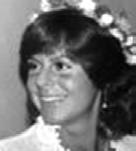
CRANSTON, R.I. – Jean R. (Maxson) Wilkes, of Cranston, passed away peacefully at her residence on March 11, 2024. She was the wife of Andrew L. Wilkes, with whom she shared 41 years of marriage.
Born in New London, Connecticut, a daughter of the late Henry and Jean (Lavigne) Maxson, she spent her youth in Warwick before moving to Cranston to raise her children.
Jean received an associates degree in education and was a teacher at Crayons Early Care and Education Center for many years. An avid beachgoer, she enjoyed going to East Matunuck Beach, and she especially enjoyed spending time with her family.
In addition to her husband, she is survived by her two sons, Matthew Wilkes and his wife, Dayna, of East Greenwich; and Benjamin Wilkes and his fiancé, Stephanie Gill, of North Easton, Massachusetts; two sisters, Libby Pray and her husband, Bruce; and Meg DeNinno and her husband, Paul, all of Cranston; one grandson, Henry Thomas Wilkes, one granddaughter on the way and many nieces and nephews. She was the sister of the late Starr Maxson.
Contributions may be made
to the J. Arthur Trudeau Memorial Center, 3445 Post Road, Warwick, RI 02886.
Barbara Wong, M.D., 81
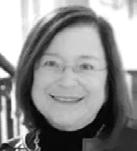
Barbara Schepps Wong, M.D. died on March 14, 2024, after a long, courageous battle with Alzheimer’s disease. She was born on April 17, 1942 in Chester, Pennsylvania to Rose and Melvin Schepps. Barbara excelled in the Chester Public School System and went on to earn an undergraduate degree from the University of Pennsylvania. She funded her education by working in various research labs on campus. Then it was onto Hahnemann Medical College, where she earned an M.D. in 1964. Residency training followed at the New England Deaconess Hospital and the Boston City Hospital. In 1964, she moved to Columbus, Ohio and found employment at the Ohio State University Hospital Radiology Department. She encountered her first brush with gender pay discrimination. She pushed her case and won pay parity for the few female doctors employed there at the time.
She then settled in Rhode Island but only after she experienced gender discrimination again. She was rejected by a radiology chief who said “I didn’t hire her nor will I ever hire a woman radiologist.” Fortunately, she was then hired by Ray Medical Group (subsequently renamed Rhode Island Medical Imaging or “R.I.M.I.”). She lived the remainder of her life in Pawtucket and Providence. At a time when there were few women leaders in medicine, Barbara was elected President of R.I.M.I. and served in that role for over 15 years. During that time the group experienced spectacular growth and increasing academic prominence. Under Barbara’s leadership, R.I.M.I. became the primary radiology group affiliated with Brown Medical School and grew to become one of the largest and most prestigious radiology practices in the country.
Barbara was the guiding force in the founding of the Anne C. Pappas Center for Breast Imaging 28 years ago at R.I. Hospital. She particularly loved mentoring the wonderful technologists at the center, one of whom described Barbara as the person who “put R.I. on the map for having the highest quality breast screening pro -
grams, equipment and staff” in her role as director of the Pappas Center
Barbara also served as president of the R.I. Hospital Medical Staff Association, a member of the R.I. Hospital Board of Directors and president of the Rhode Island Medical Society. She was the Clinical Professor of Diagnostic Imaging at the Warren Alpert School of Medicine (Brown University).
In 2004, she received the prestigious “Milton W. Hamolsky” outstanding physician award.
Barbara was a talented sculptress, artist, knitter and basket weaver. She was generous with her time and a variety of charities benefitted from her philanthropy. She excelled at baking and entered her chocolate chip banana bread at the Maui fair where she won second place.
She supported her beloved Boston Red Sox and attended over 150 games at Fenway. She was an enthusiastic golfer at the Ledgemont Country Club in Seekonk, Massachusetts.
Barbara was predeceased by her parents, Rose and Melvin Schepps. She is survived by her husband of 56 years, Dr. Richard Wong; daughter Dr. Deborah R. Wong (Dr. Todd Rothenhaus) and her cherished grandchildren Chris and James of Belmont, Massachusetts.
Contributions may be made to The Anne C. Pappas Breast Center c/o The R.I. Hospital Foundation, P.O. Box H. Providence, R.I. 02901 or Alzheimer’s Disease Foundation or Rhode Island Food Bank or the charity of your choice.
NORTH KINGSTOWN, R.I. –May-Ronny (Sarenson, Sock) Zeidman passed away March 8, 2024, at her home in North Kingstown. She leaves behind her beloved Howard Brown, who was at her side and cared for her tirelessly throughout her illness. She was the wife of the late Robert Sock and Rubin Zeidman. She was the daughter of the late Nathan and Luna (Abrevaya) Sarenson.
Well known in the community, she worked and volunteered at the Jewish Federation of Rhode Island, worked at Israeli Bonds and United Way, and was self-employed at her salon. Most recently, she was the executive director of the Sandra Bornstein Holocaust Education Center.
She loved her family and friends above all but also loved to cook, travel with Howard, read and do handwork of any kind.
She leaves behind her chil-
dren, Jeffrey Sock and his husband, Dennis Morrell; Mason Sock and his wife, Laura (Dunbar) Sock; and Garrett Sock and his wife, Sharon (Silverman) Sock; as well as her grandchildren, Sara, Samantha, Kevin, Rebecca, Reese, Jacob and Cooper. She leaves behind her brother, Barry Sarenson, and his wife, Donna, and her niece, Kayla.
A special thanks to her caregivers, Lisa, Jenn, Val and Anna.
Contributions can be made to the Eunice and Rubin Zeidman Endowment Fund at the Sandra Bornstein Holocaust Education Center or the Eunice and Rubin Zeidman Scholarship Fund at the Jewish Community Day School of Rhode Island.
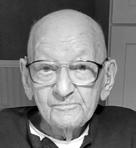
Abraham Zuller, 96 WARWICK, R.I. – Abraham Zuller, of Warwick, passed away on March 3, 2024, at his son’s residence surrounded by his loving family. He was the former husband of the late Beverly (Klein) Zuller.
Born in Sarny, Poland, a son of the late Asher and Basia Zuller, he immigrated to the United States in 1950 with only one dollar in his pocket.
A Holocaust survivor, he
loved helping others and saved many lives during the war. Abraham was a self-made, family man who started out as a door-to-door salesman and later became the owner and operator of the furniture store “Abe Zuller Sales.” He also sold furniture at multiple indoor and outdoor flea markets. Mr. Zuller was very skillful and talented, doing masonry, carpentry and brick layer work as well as helping build the shipyard in Providence. He was multilingual, speaking 11 languages. He loved taking care of pets and enjoyed traveling, deep sea fishing, going to the beach, local casinos and aquariums.
He is survived by his son, David U. Zuller and his wife, Ebony, of Pawtucket; two daughters, Barbara S. Zuller, of Cranston; and Marilyn B. Zuller Morin and her husband, David, of Warwick; four grandchildren, Aryana Offutt and Michaela, Olivia and Michael Zuller; and two great-grandchildren, Jacob and Isabella Zuller. He was the great-grandfather of the late Elanna Zuller; father-in-law of the late Lester Kushner; and brother of the late Shifra (Zuller) Sheintuch and Yitzchak Zuller Contributions may be made to the Sandra Bornstein Holocaust Education Center, 401 Elmgrove Ave., Providence, RI 02906.
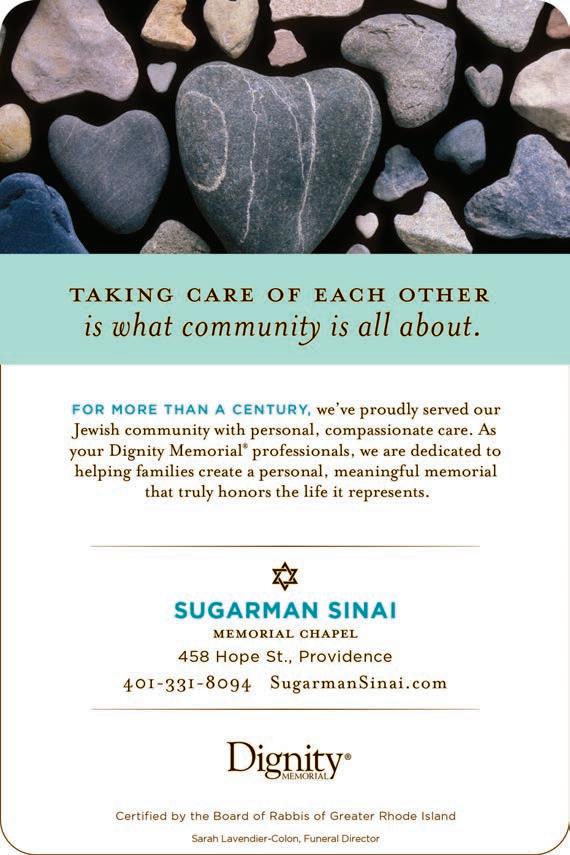
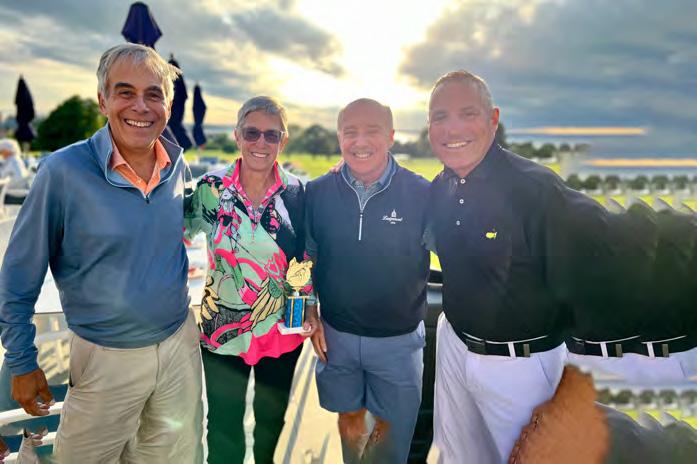

Jewish Rhode Island is the only source for Jewish community news in Rhode Island and southeastern Massachusetts. To continue to provide a vibrant window to everything Jewish in our area, we need your help. Our annual Patron Campaign is now underway. Your donation, large or small, helps us bring you our monthly publication, newsletter and our website.
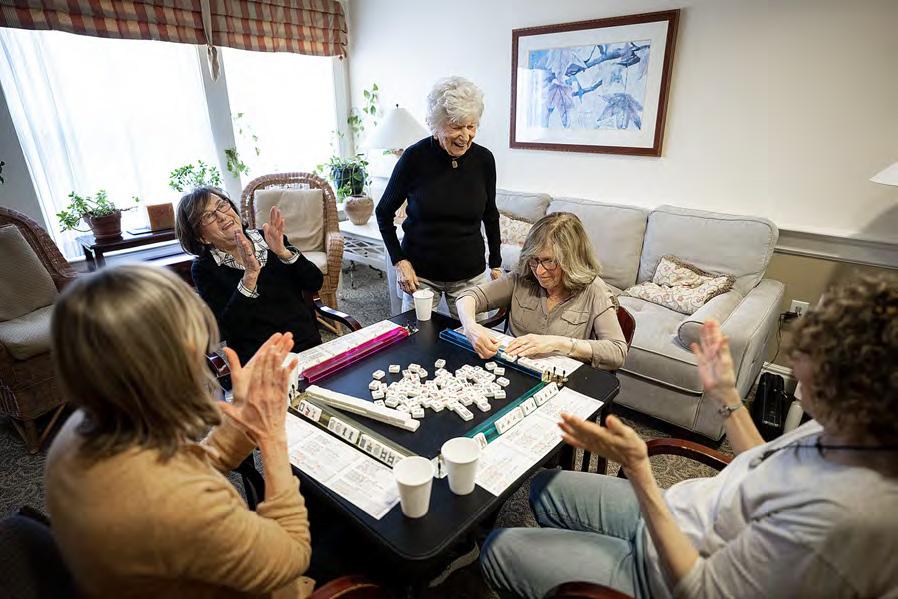
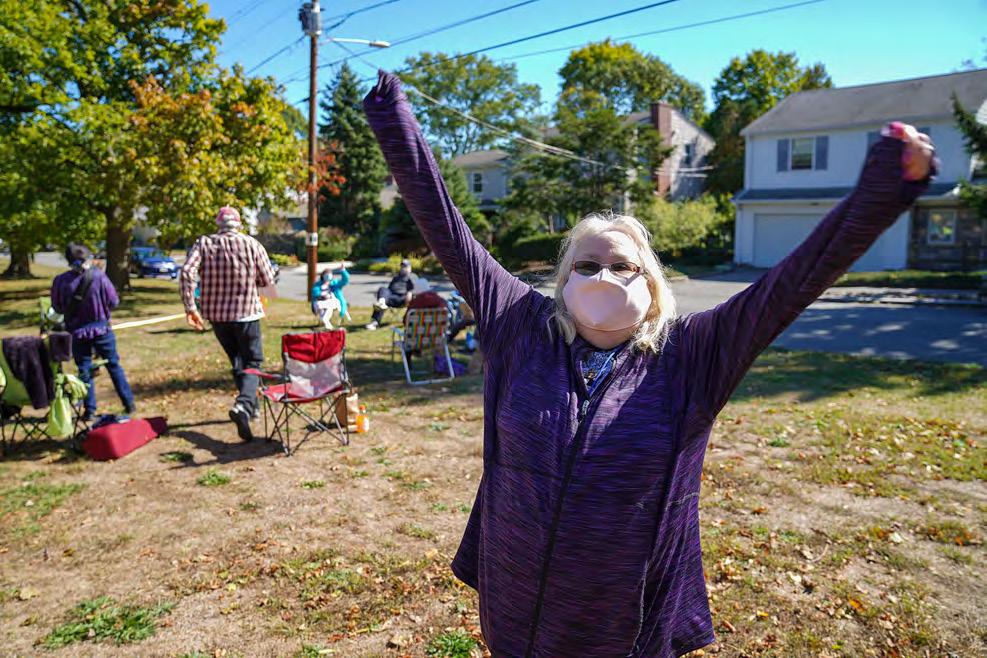
$18 $36 $54
$72 $100 $250
$500 $1,000 Other $